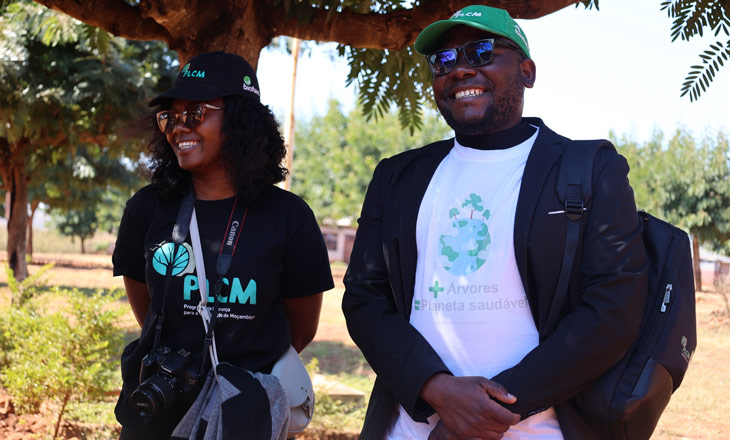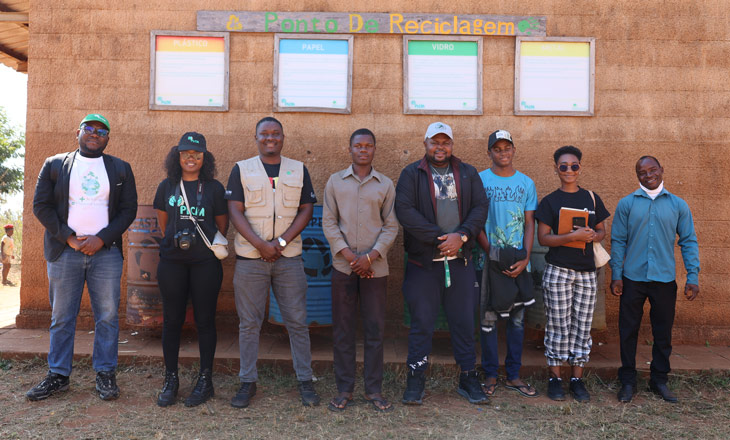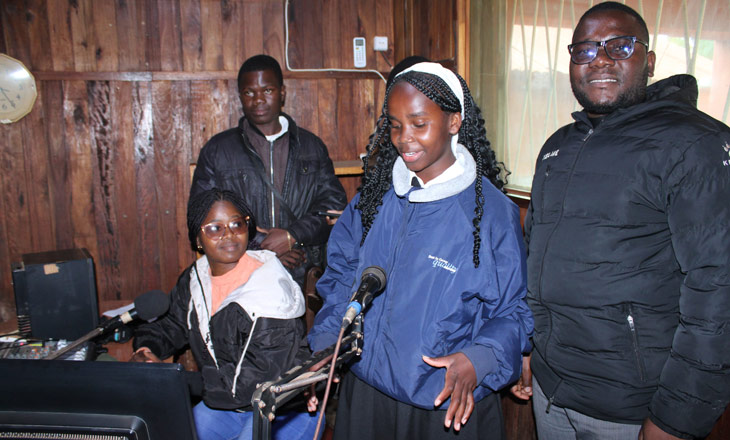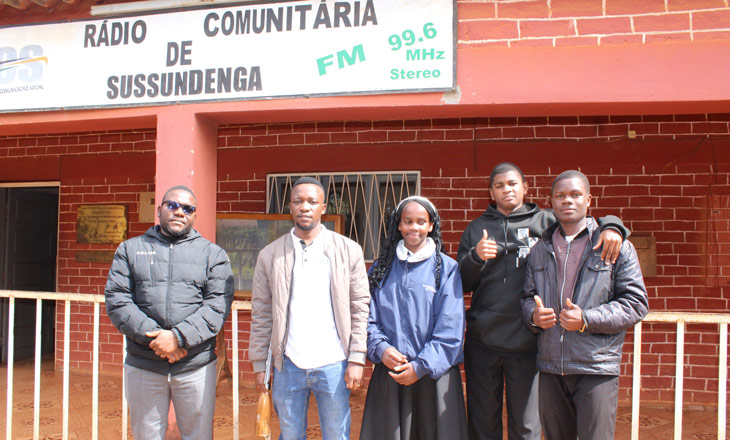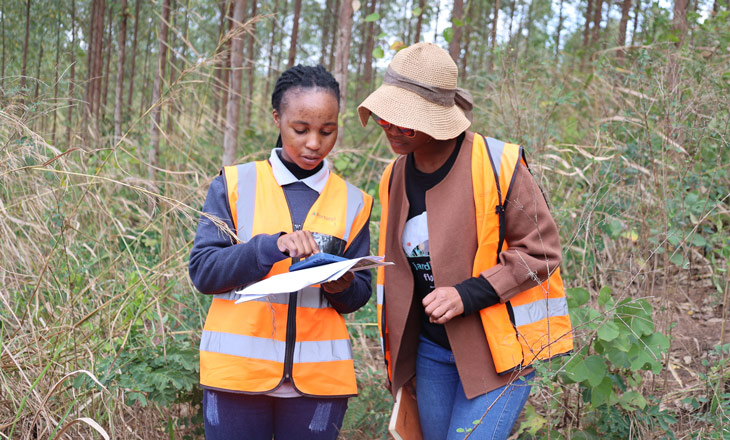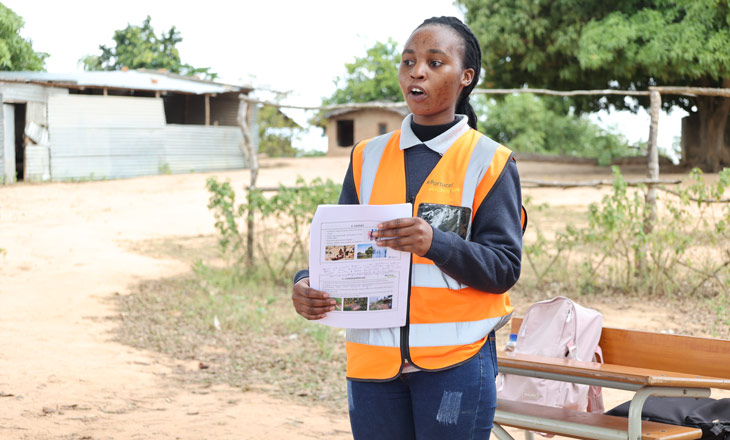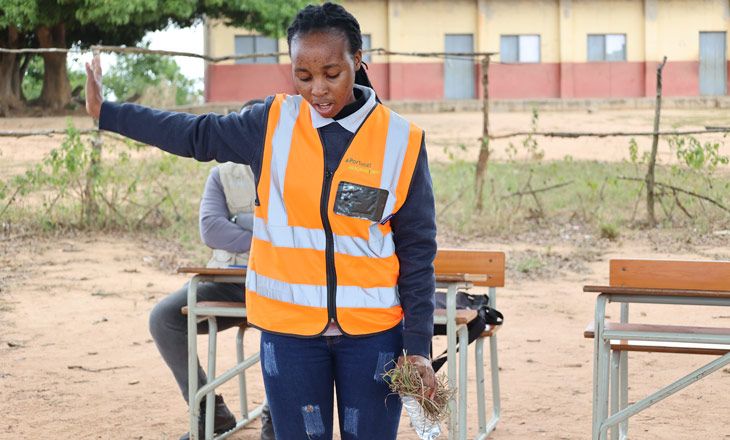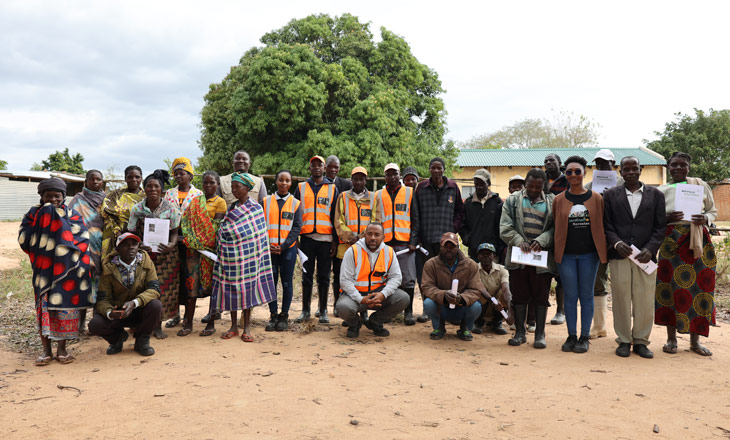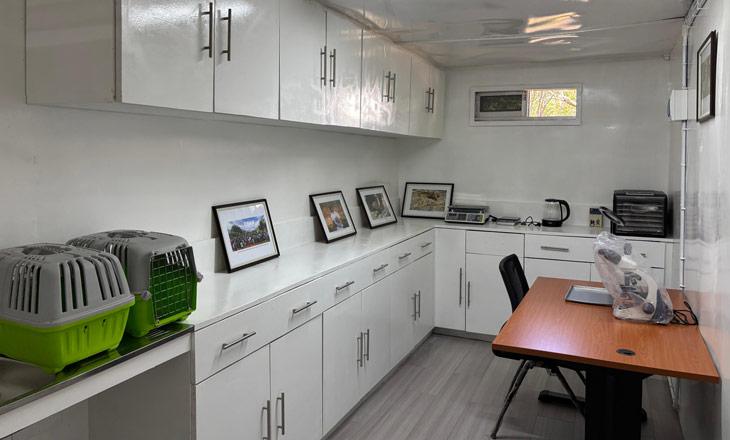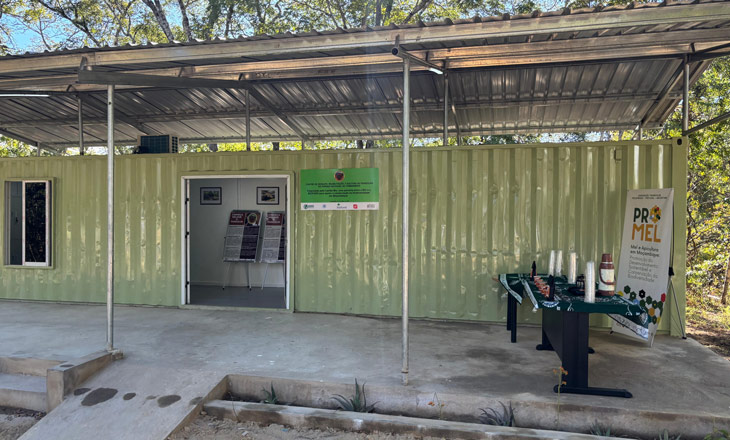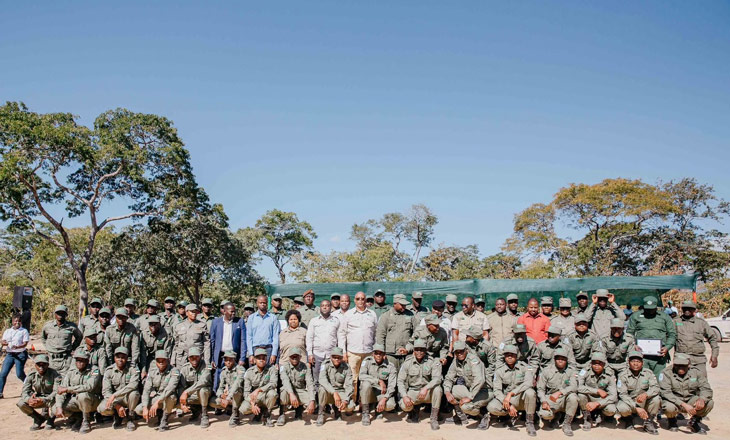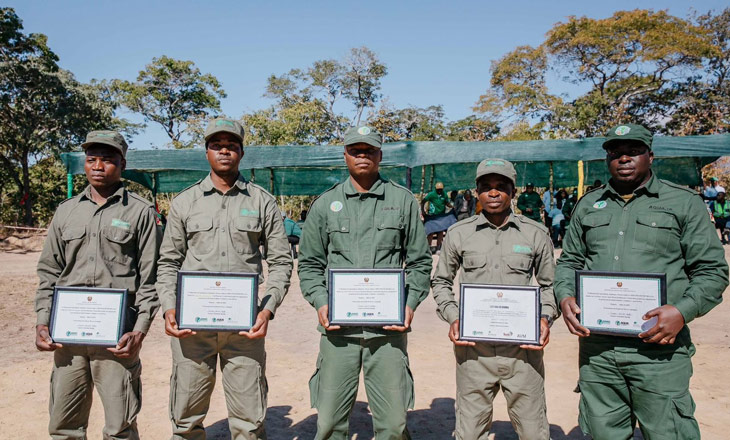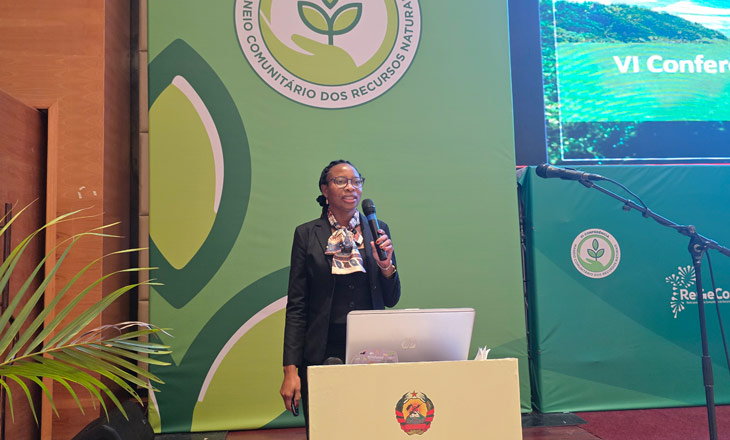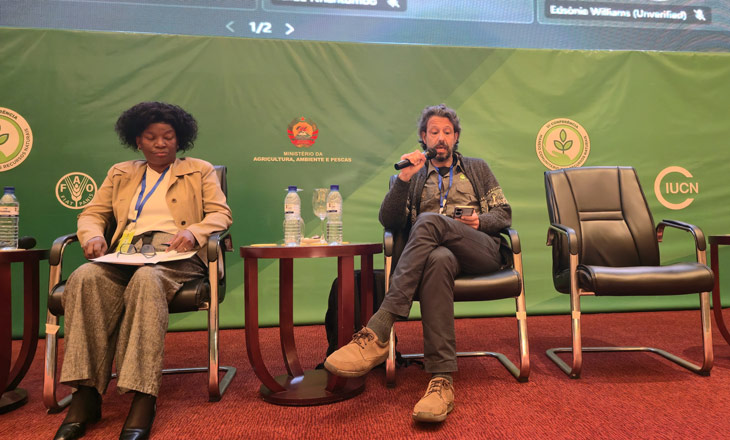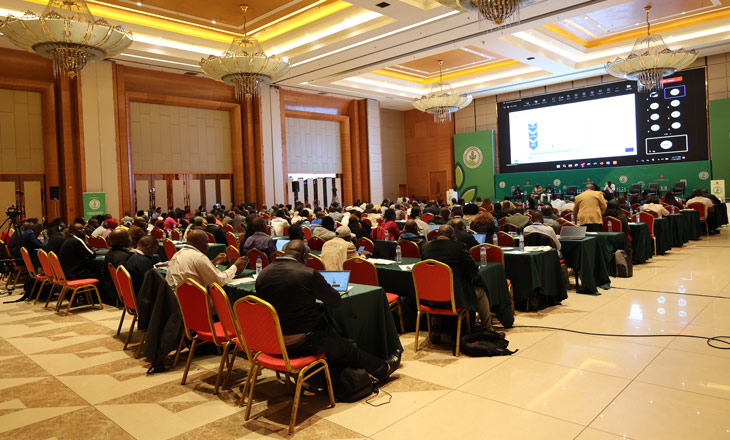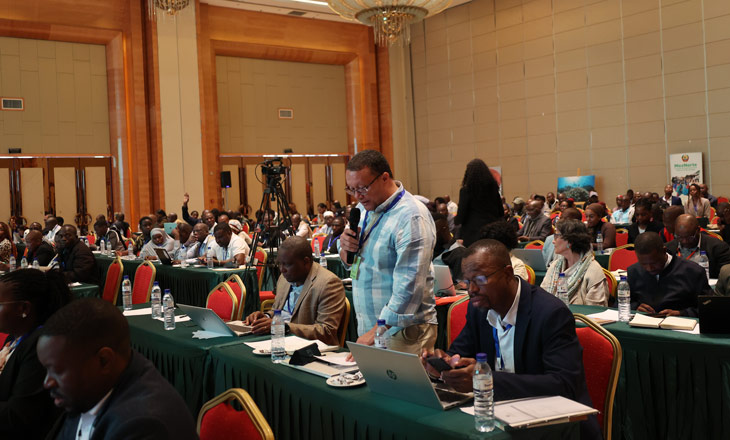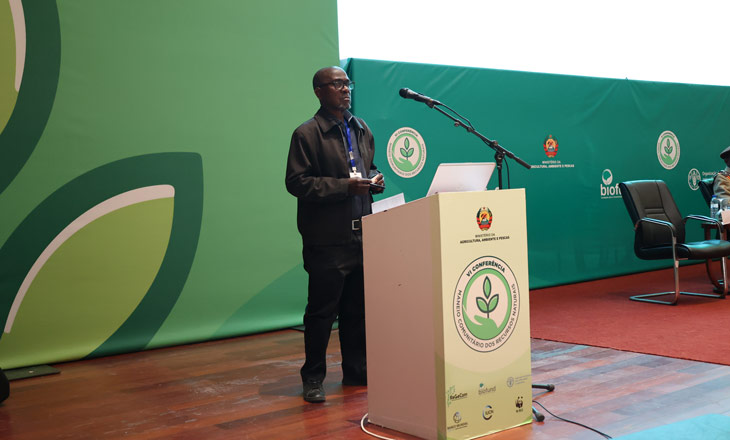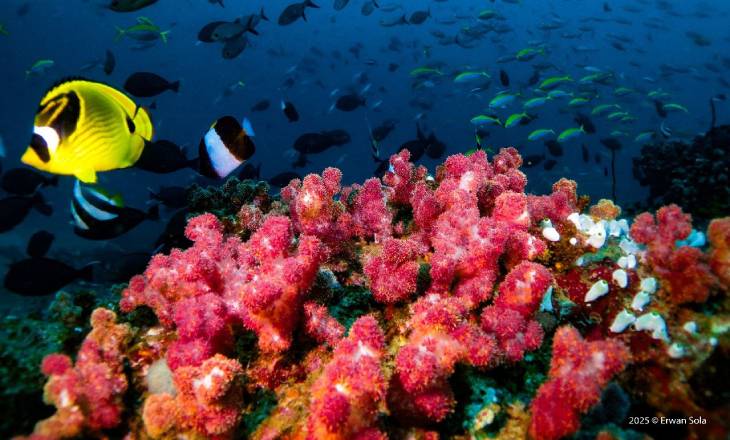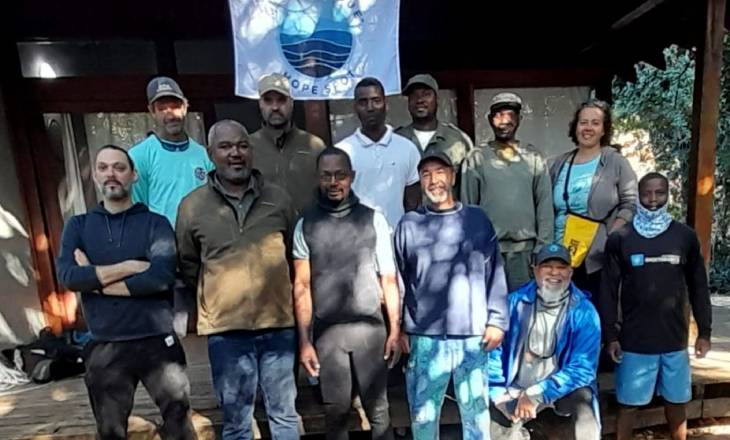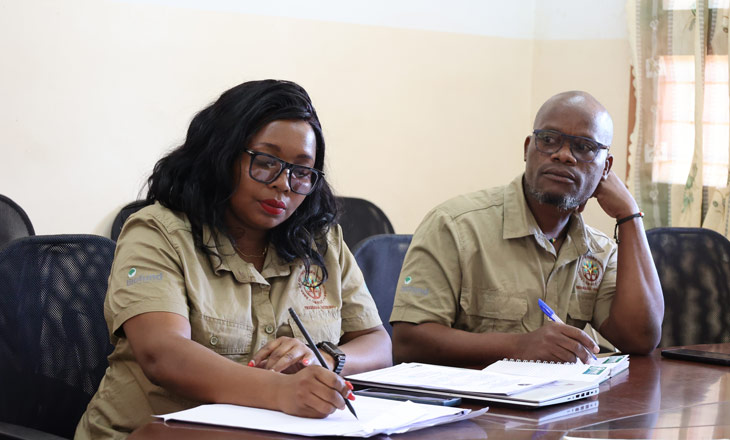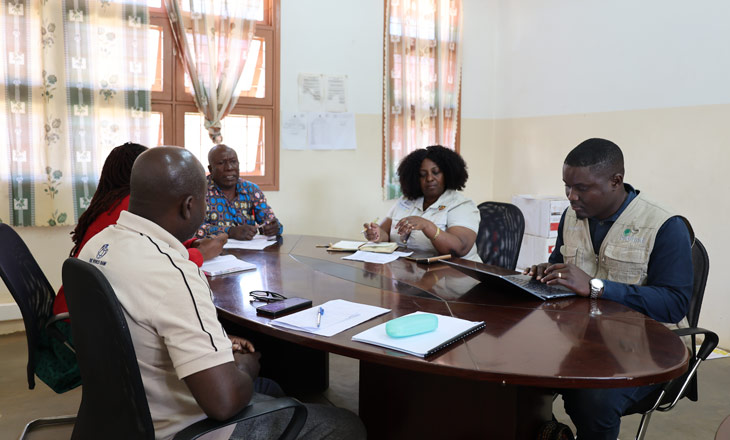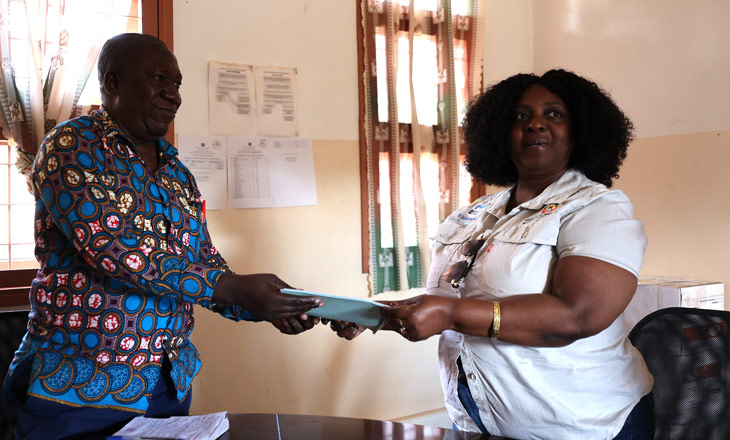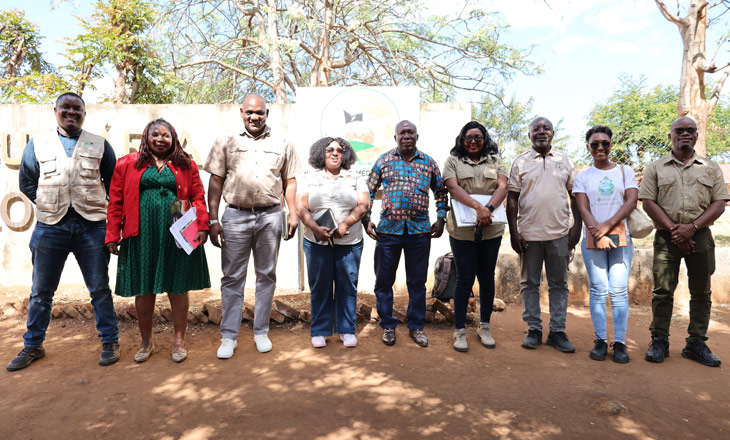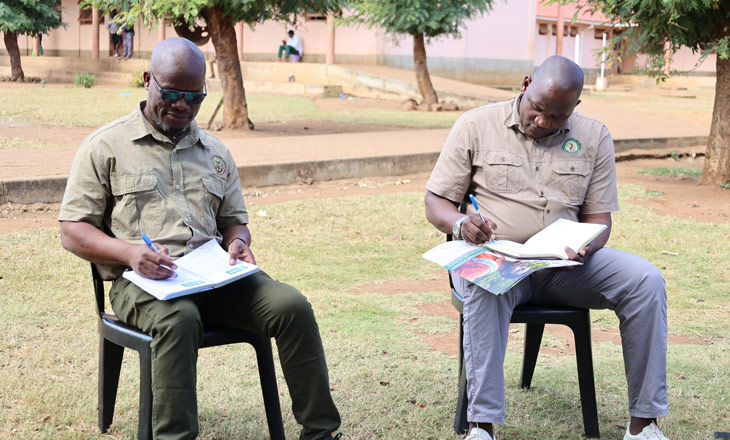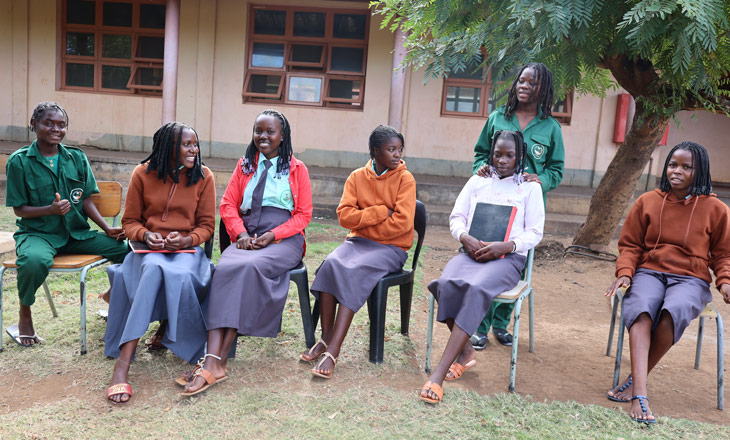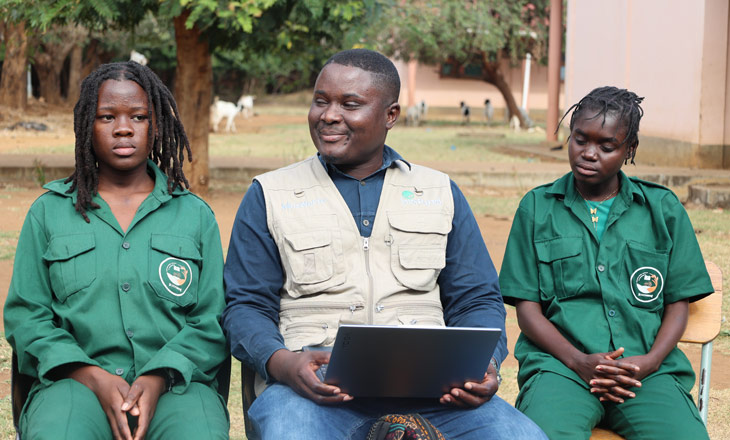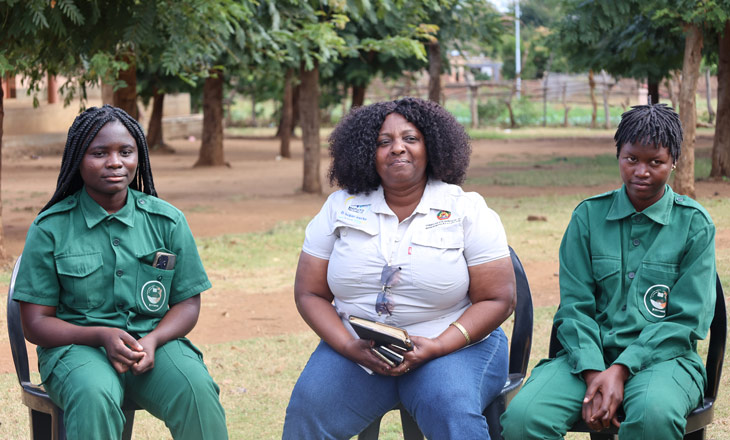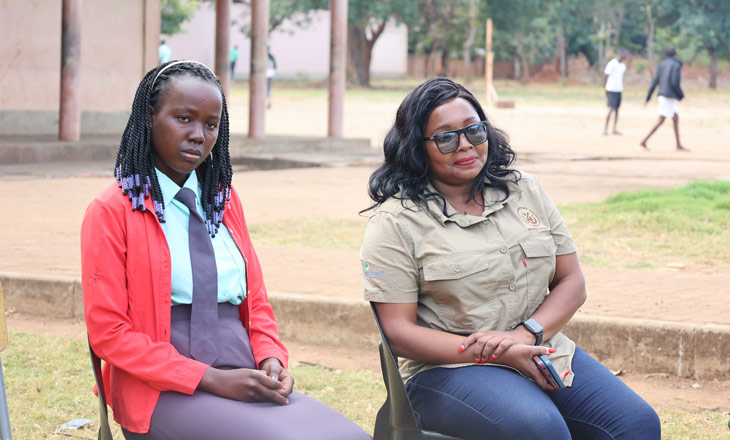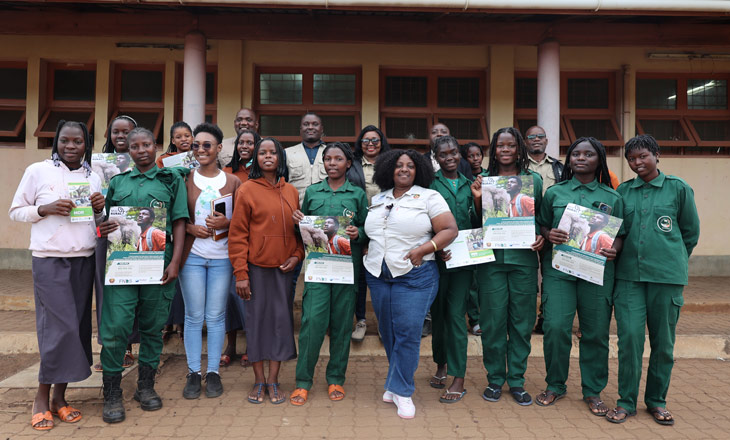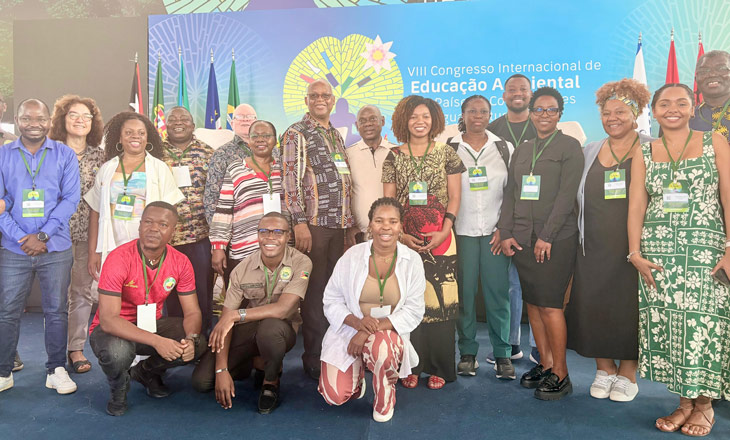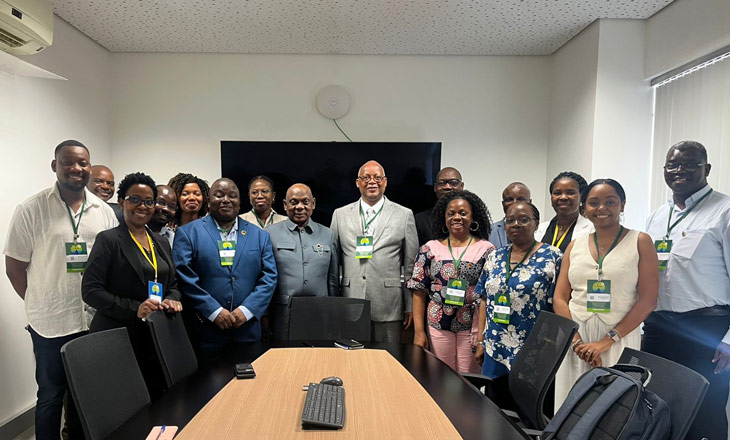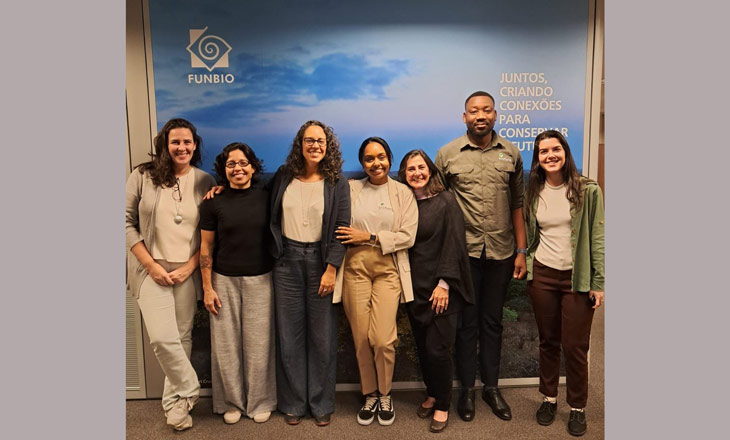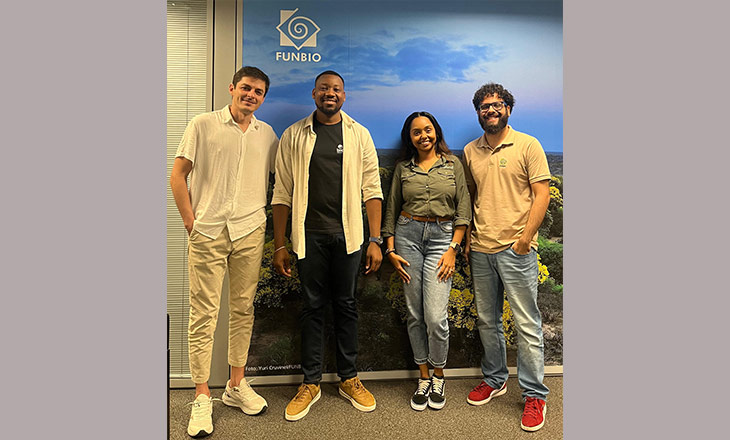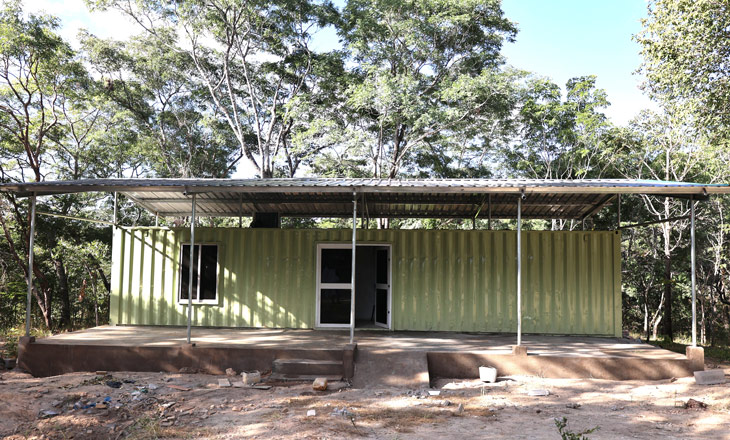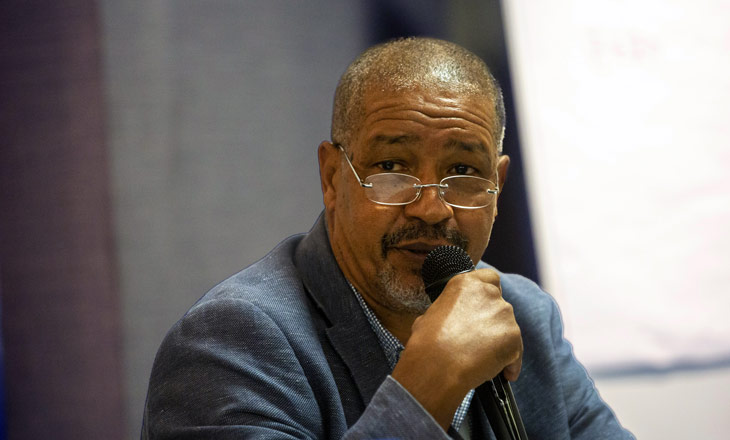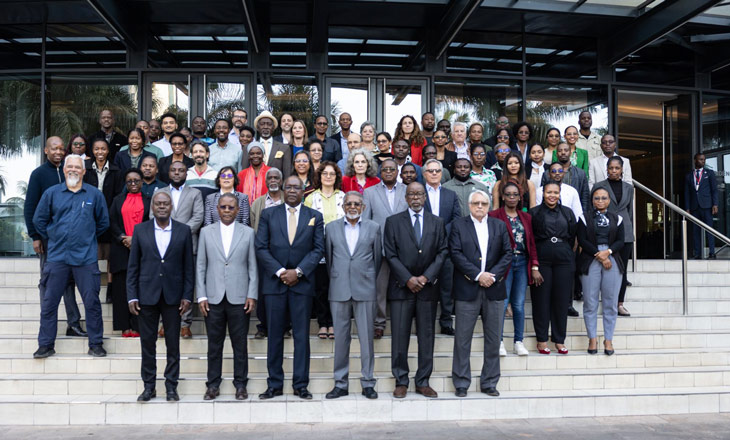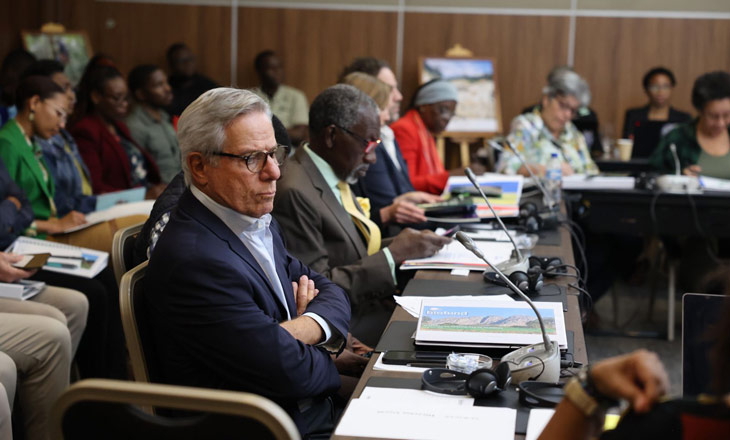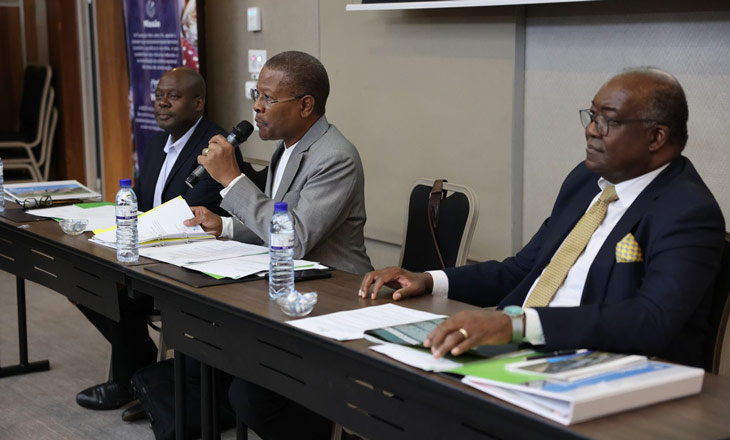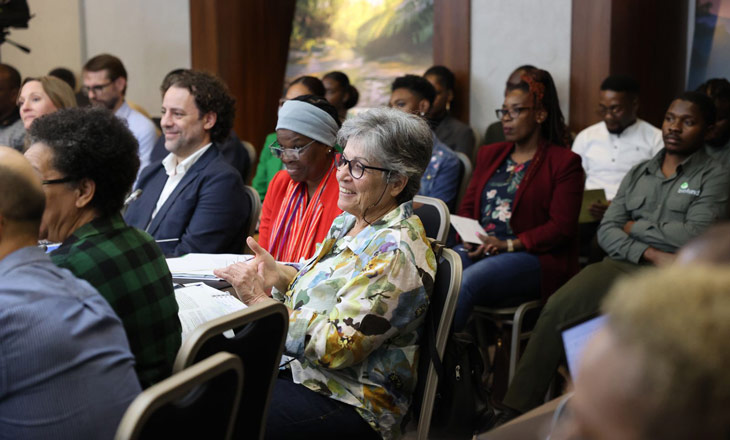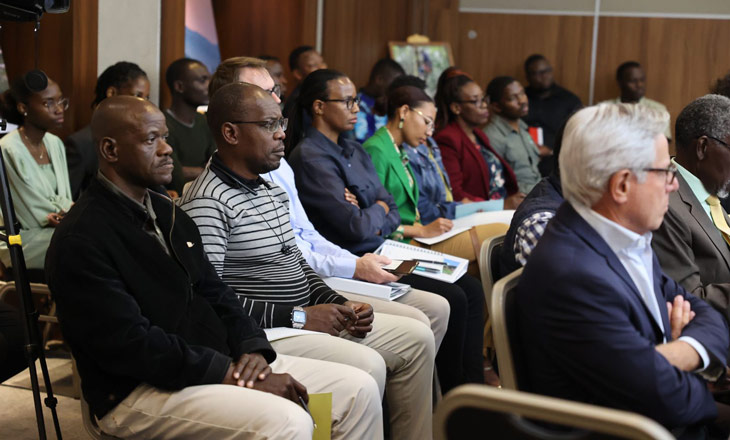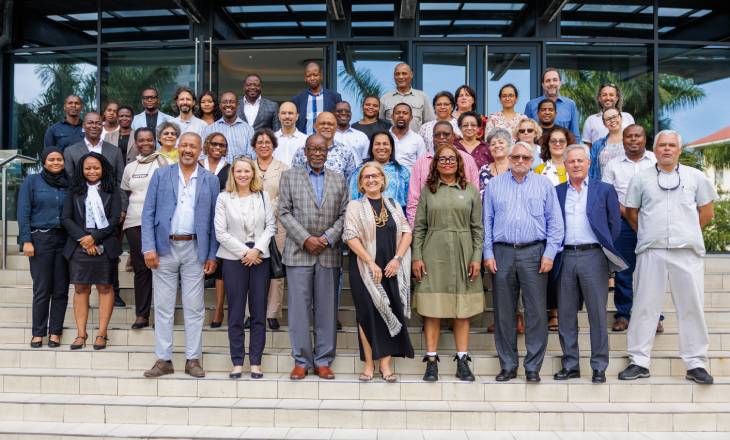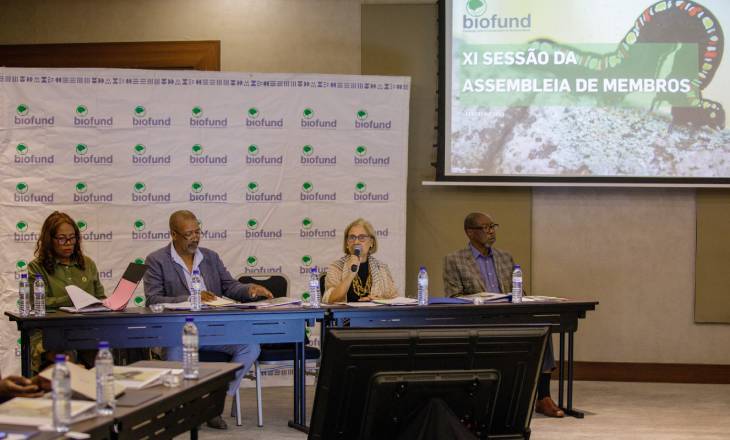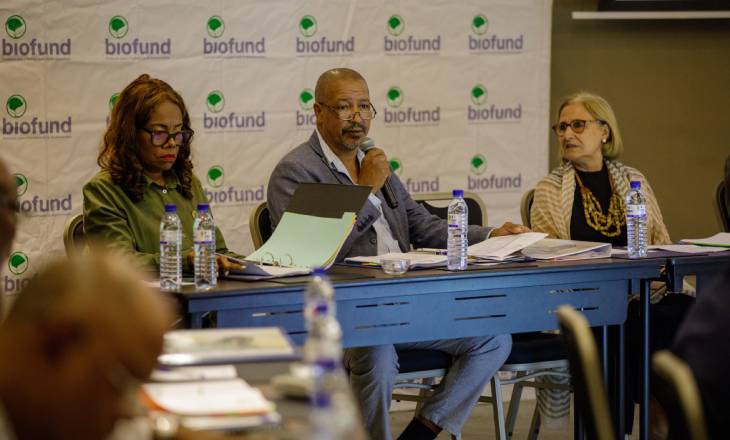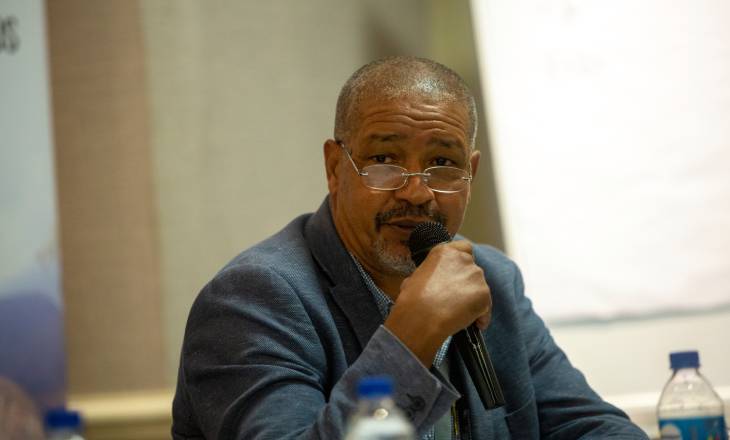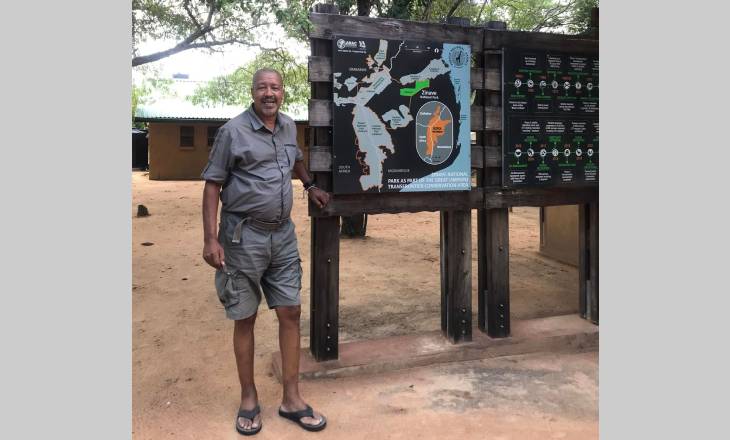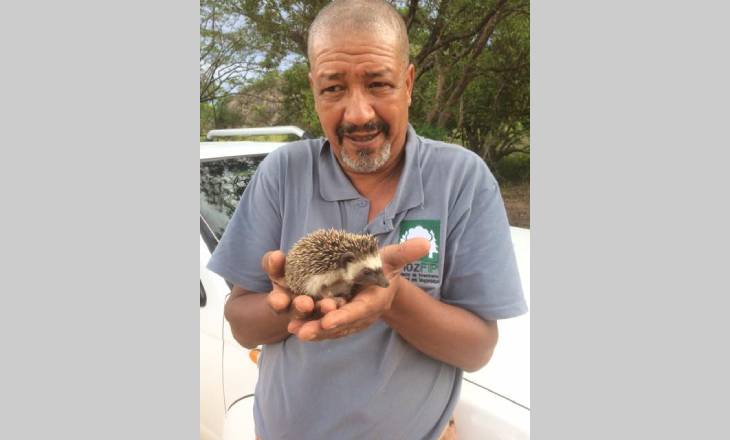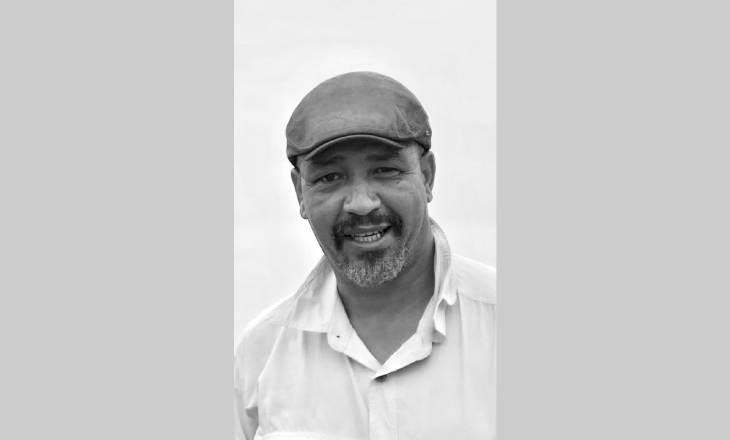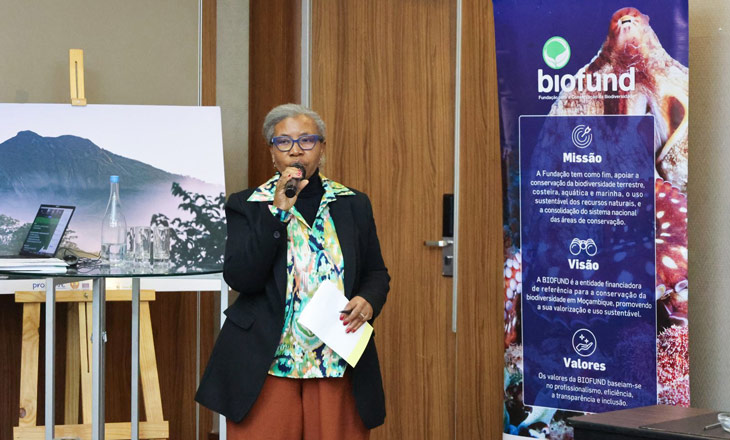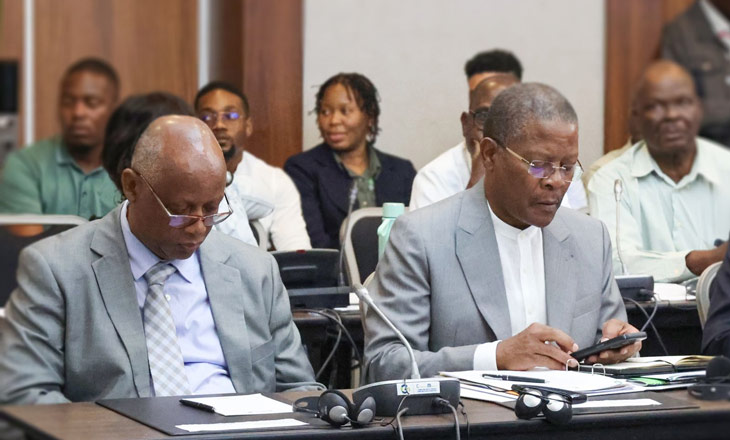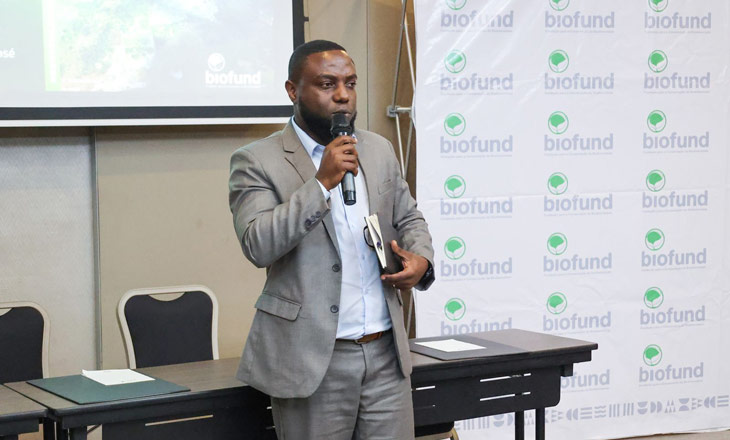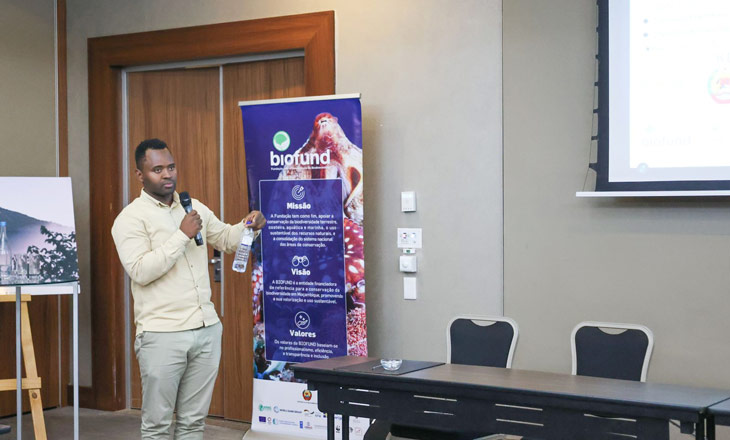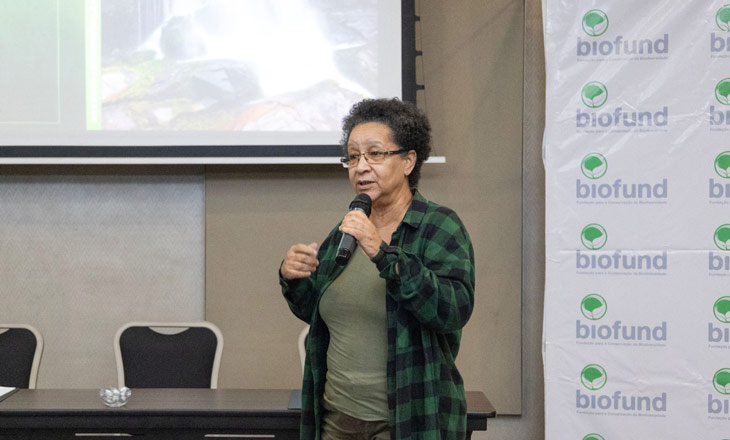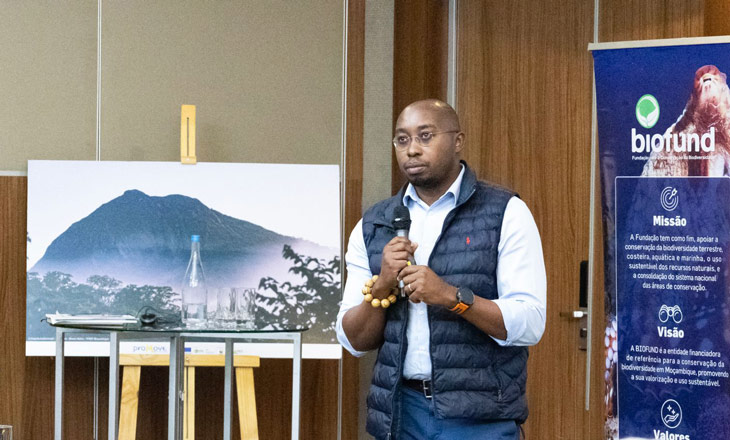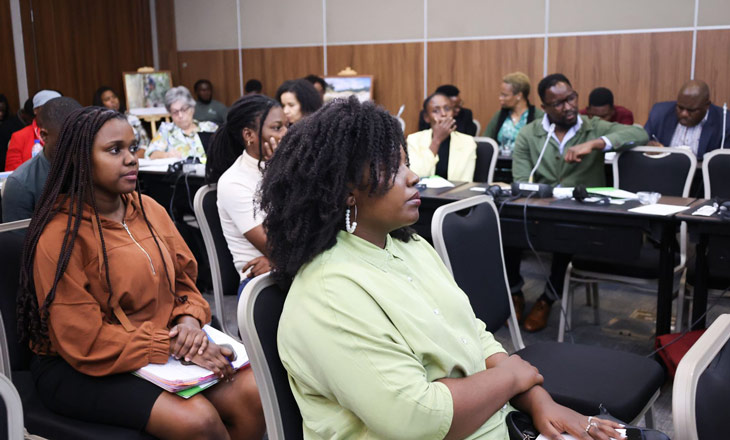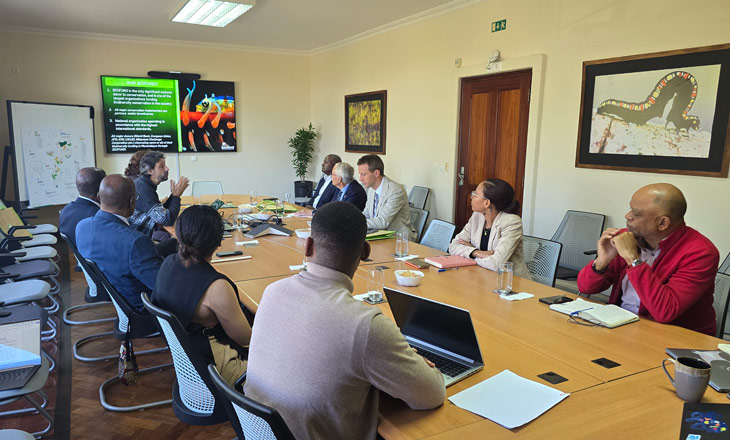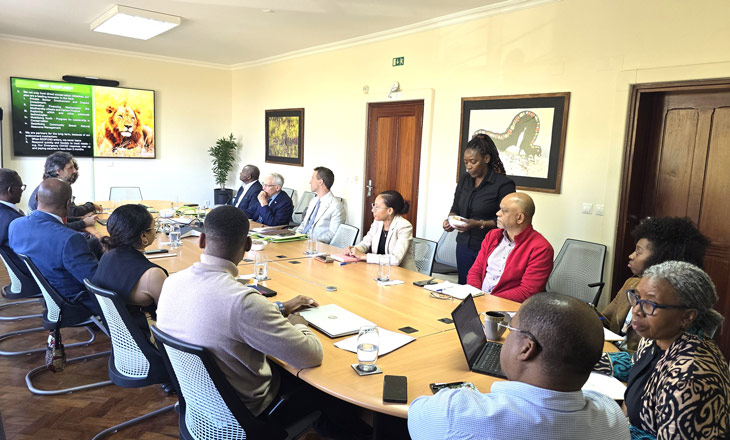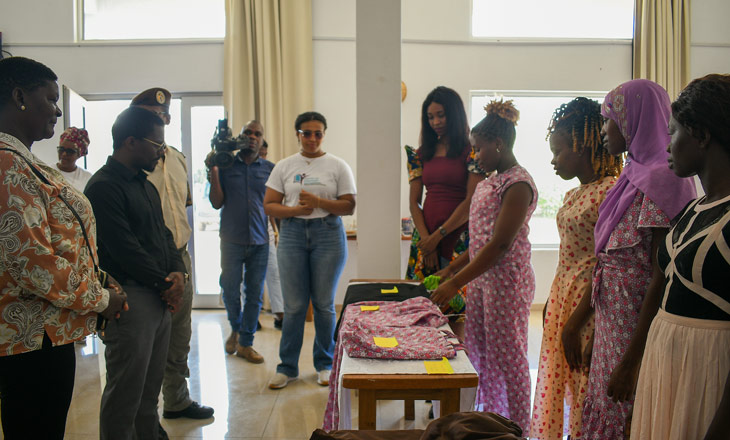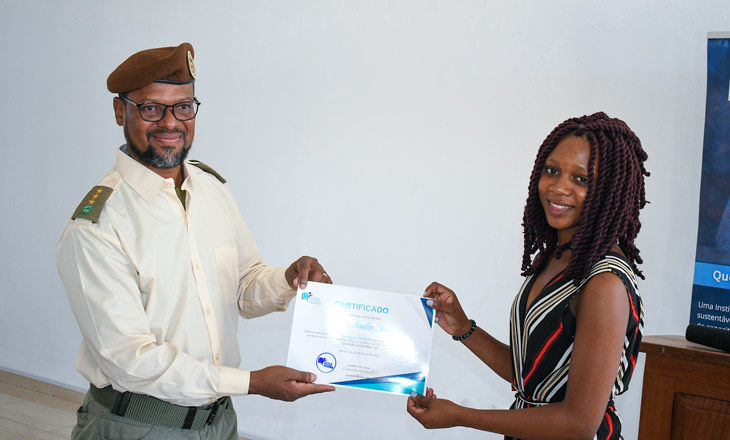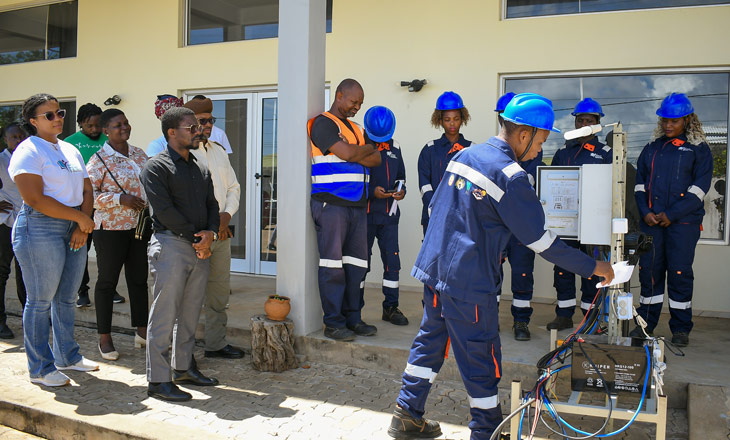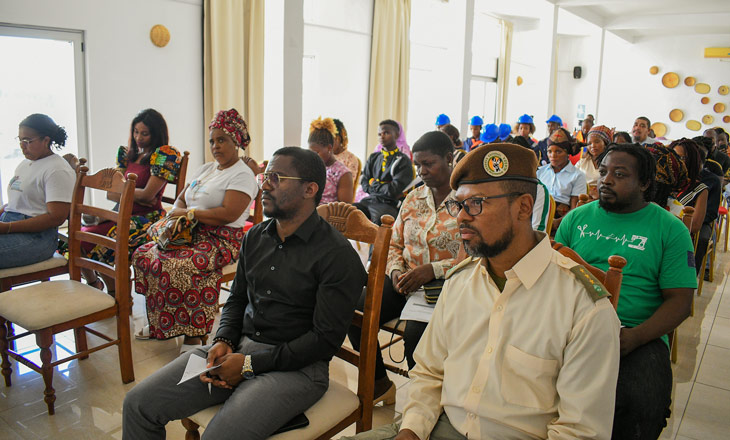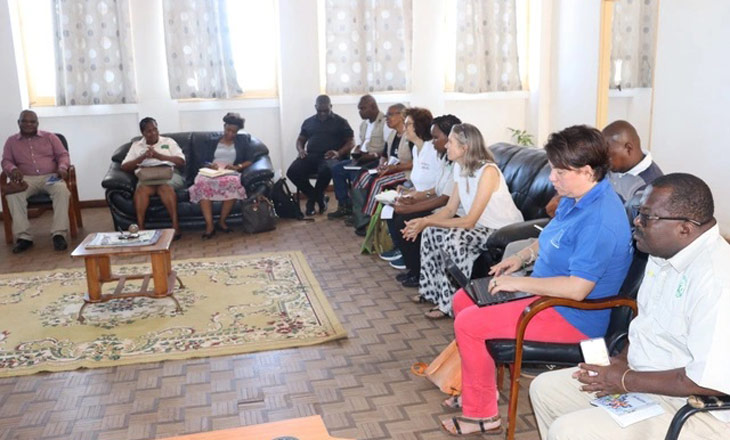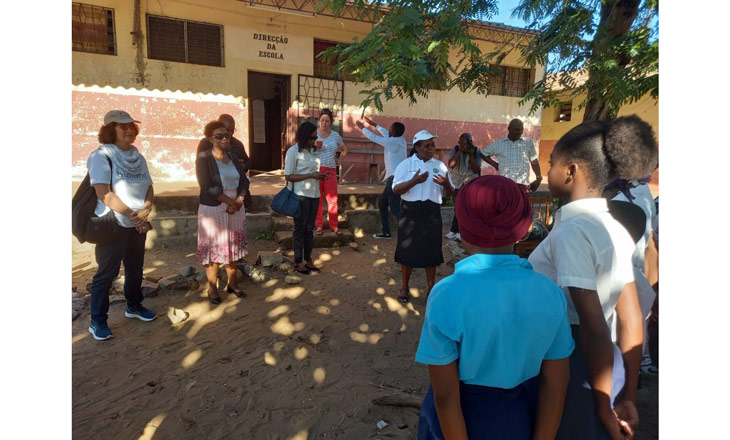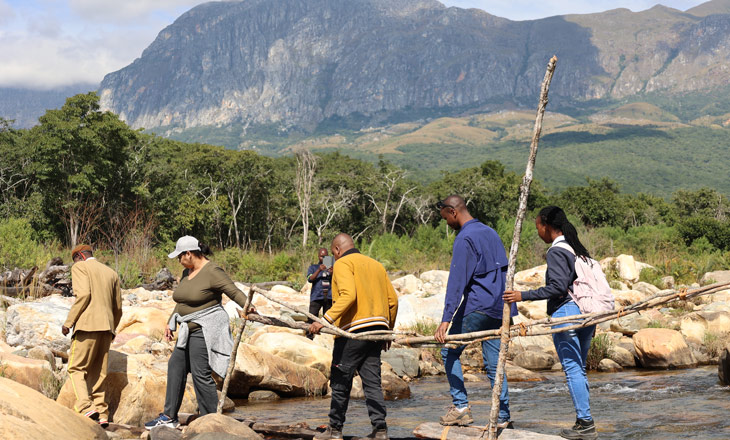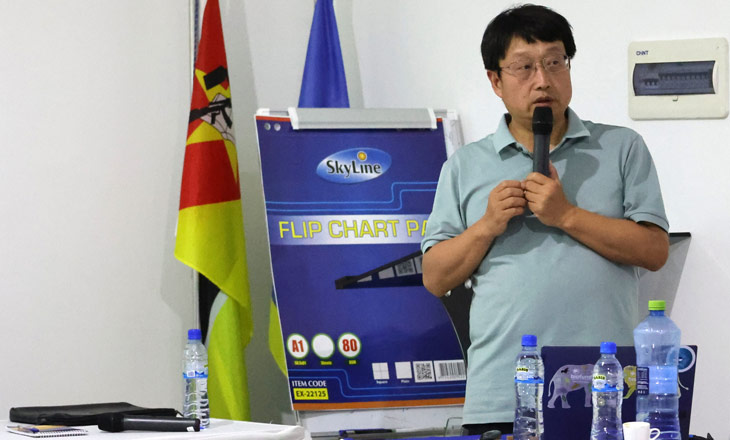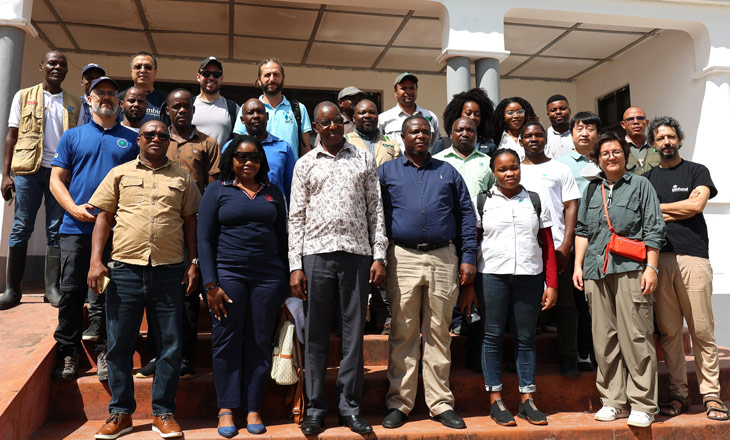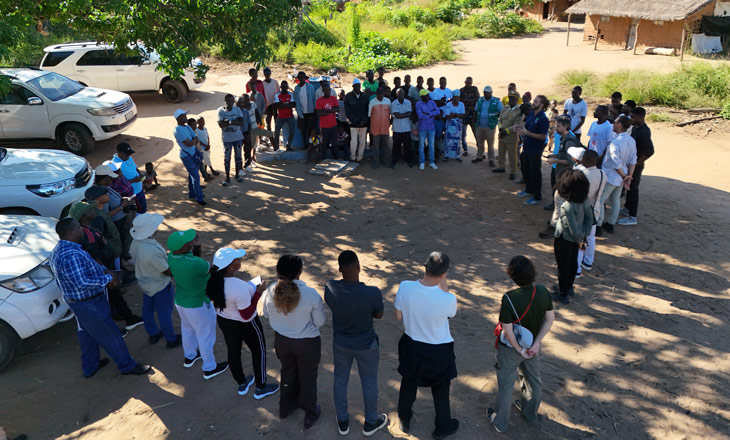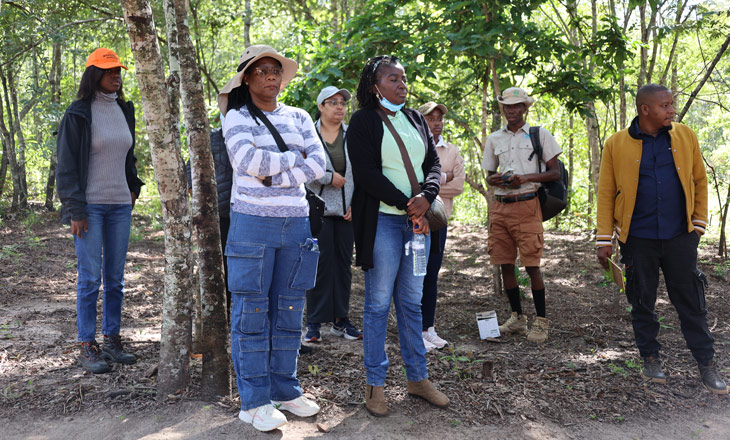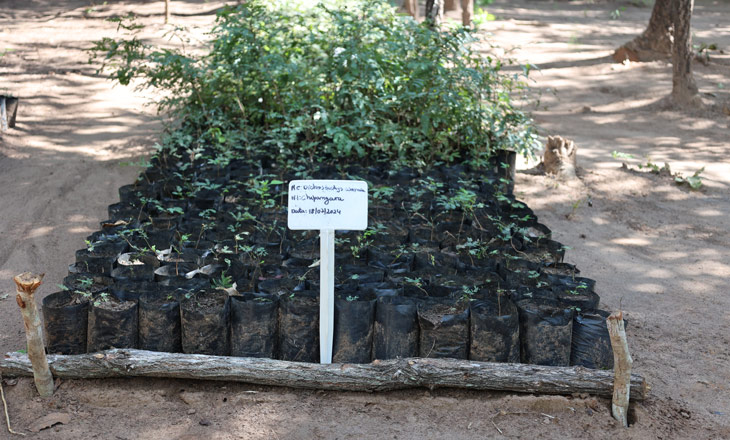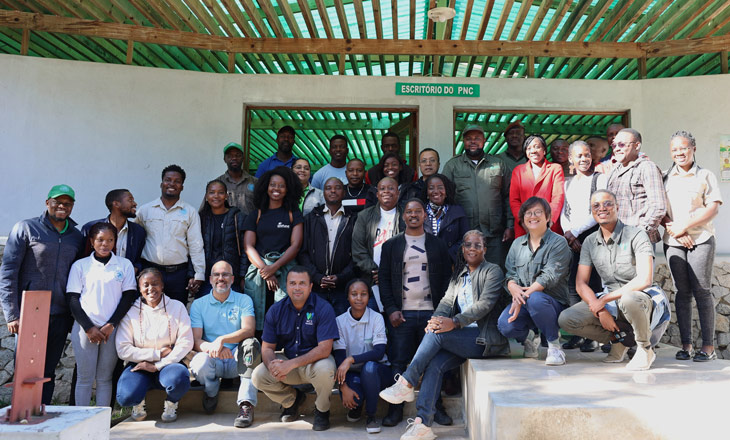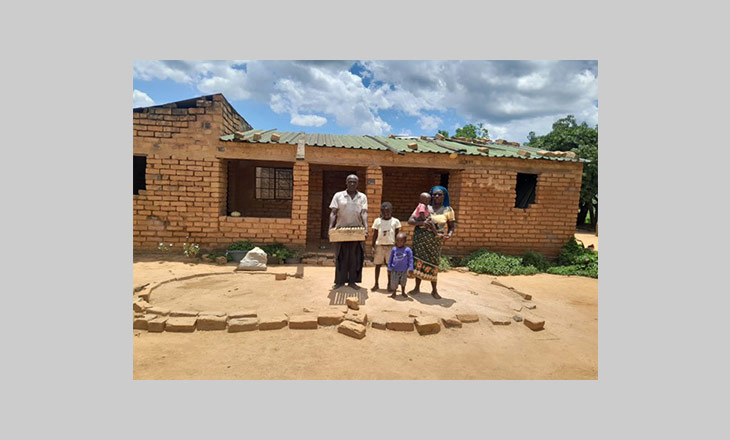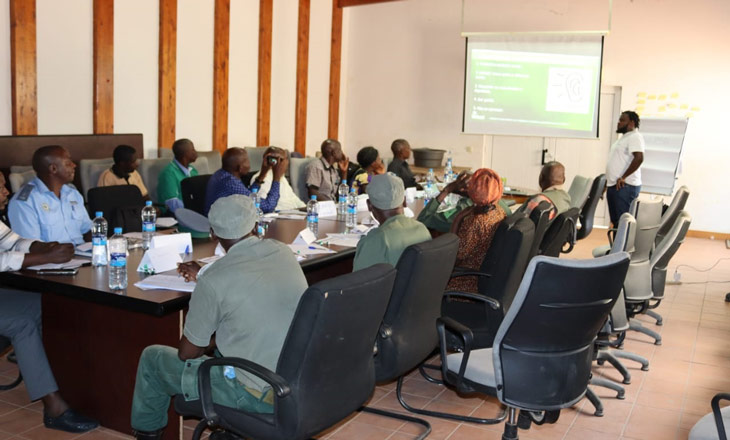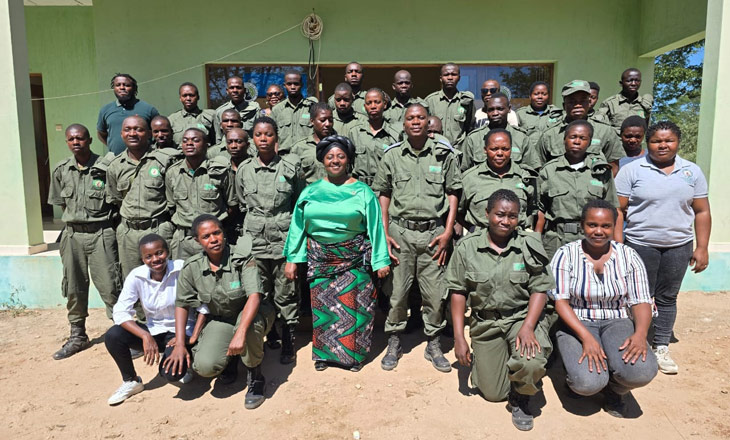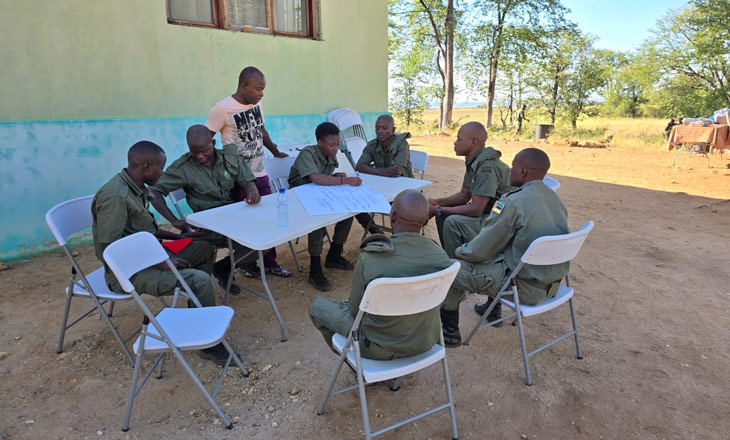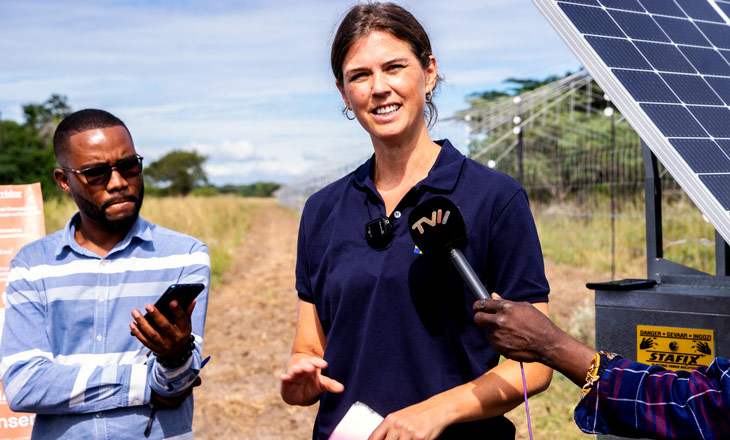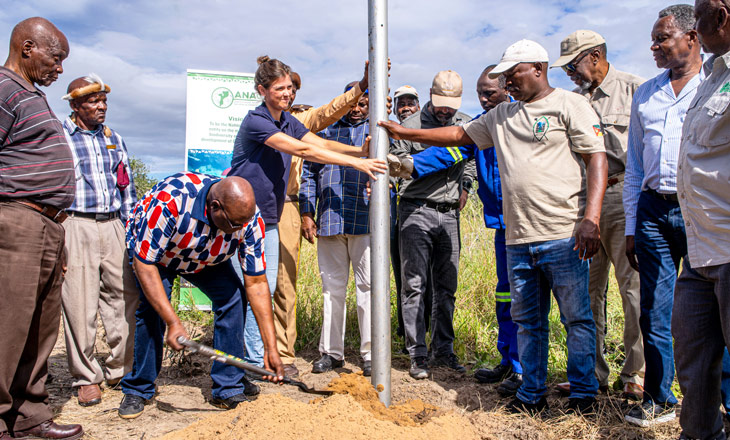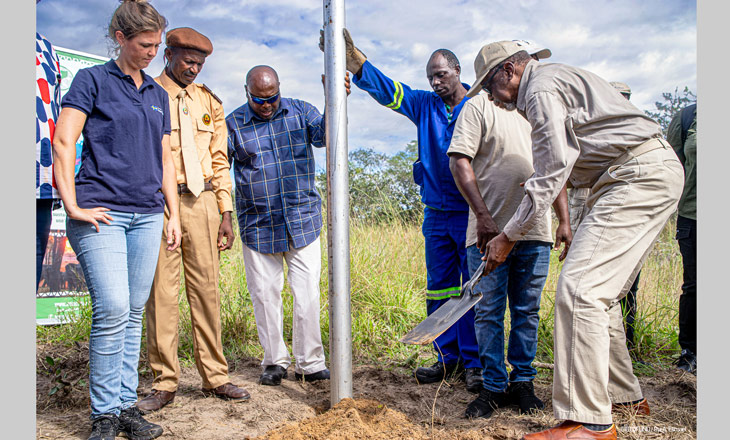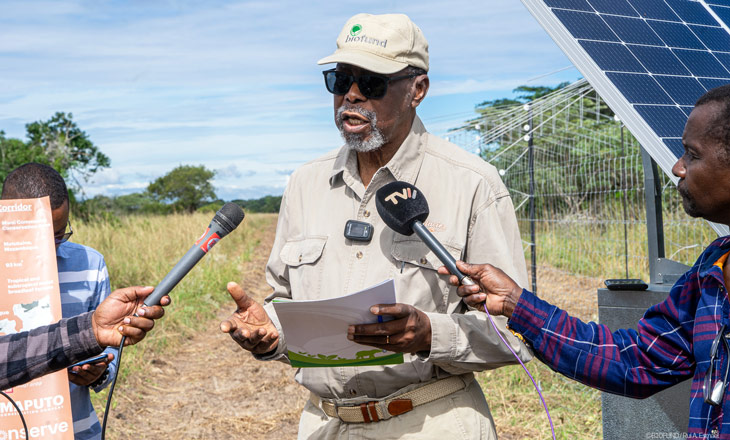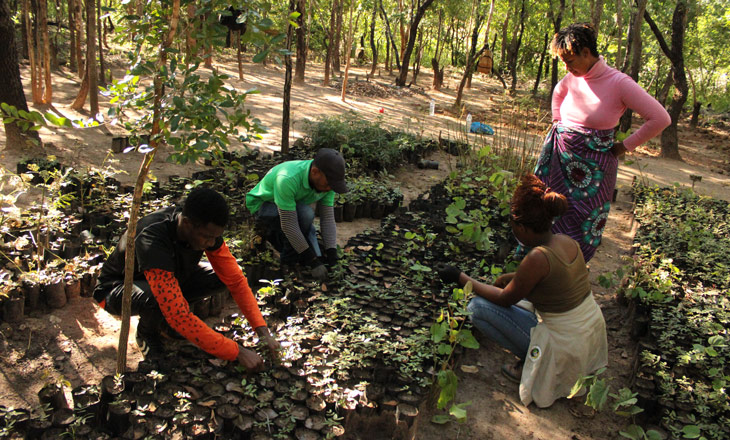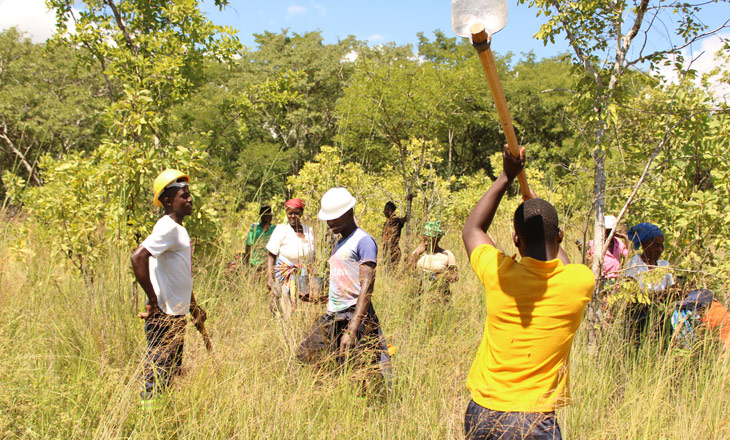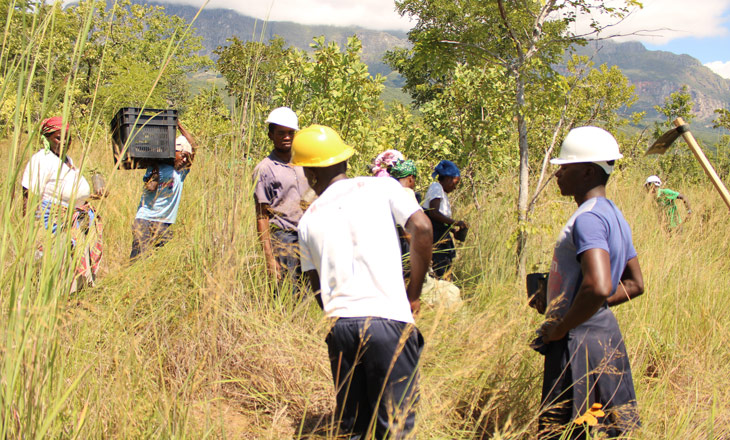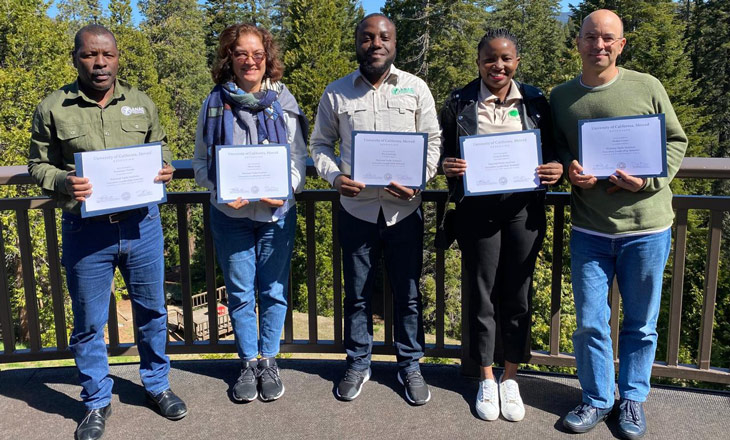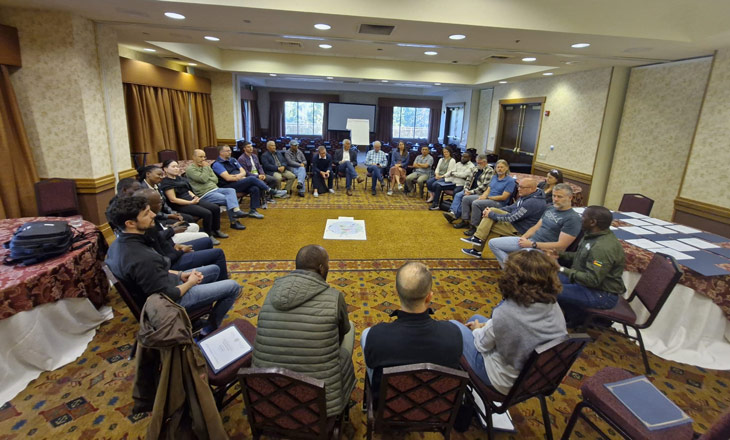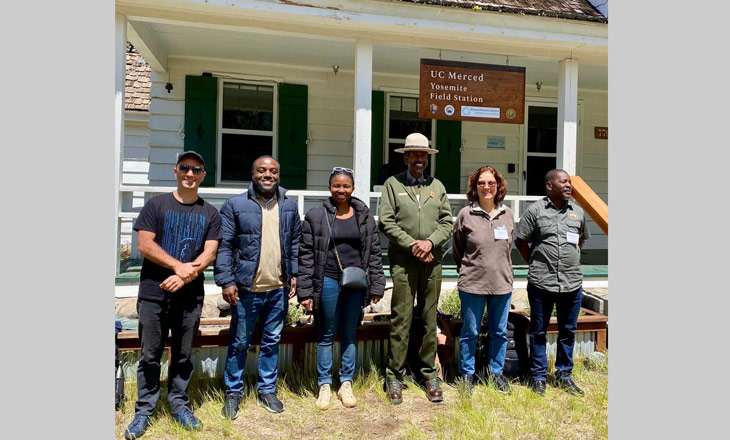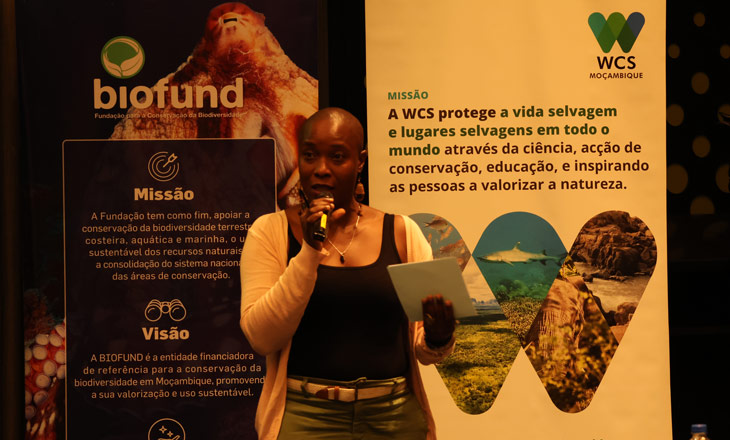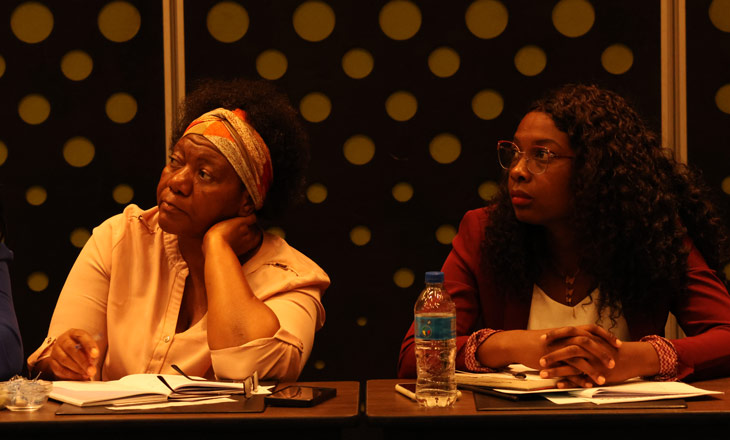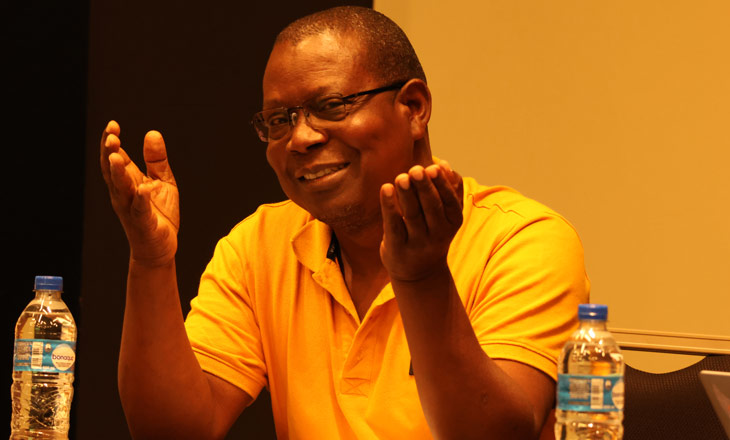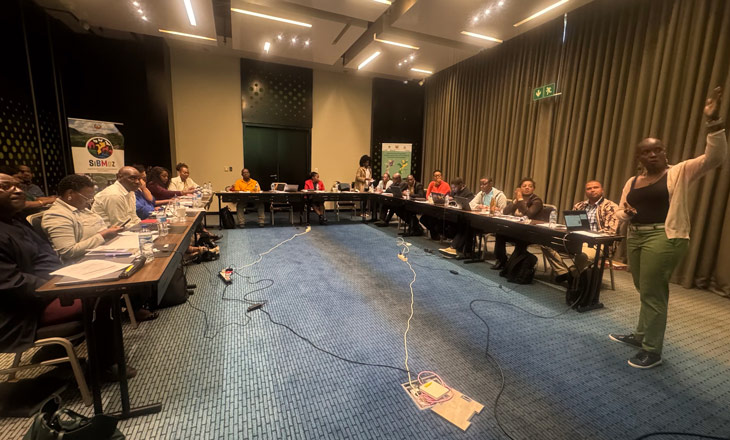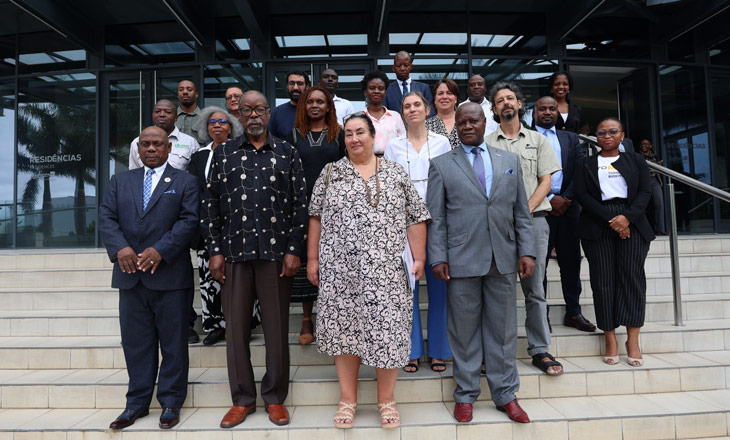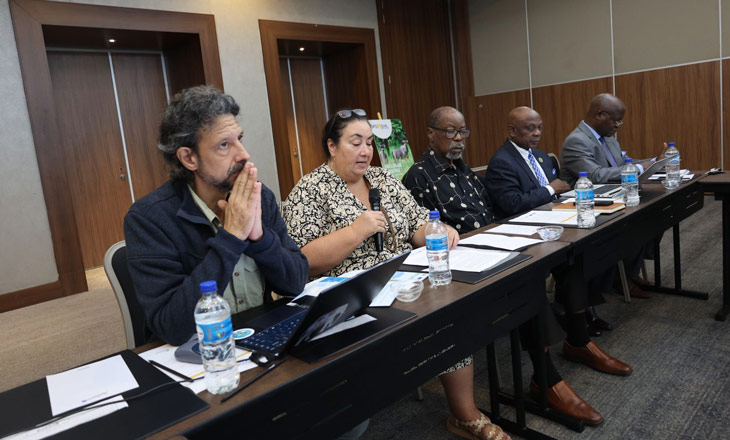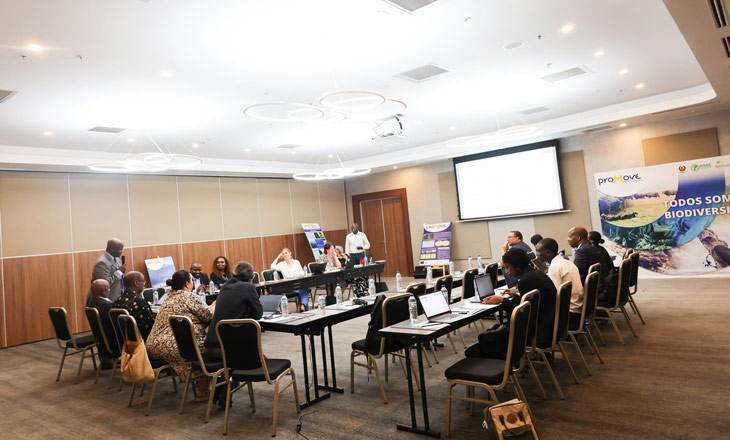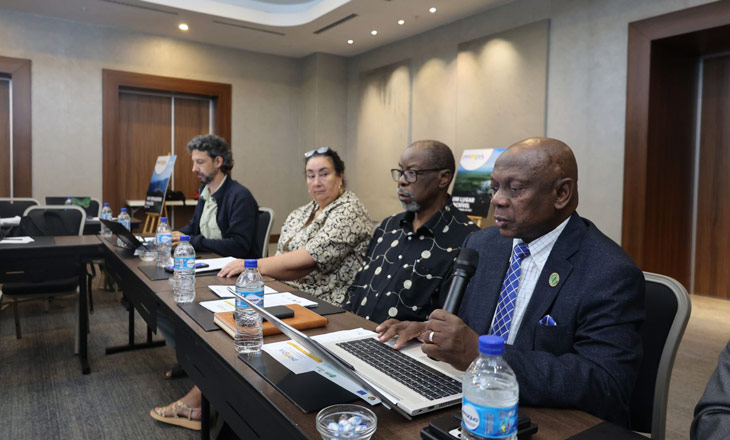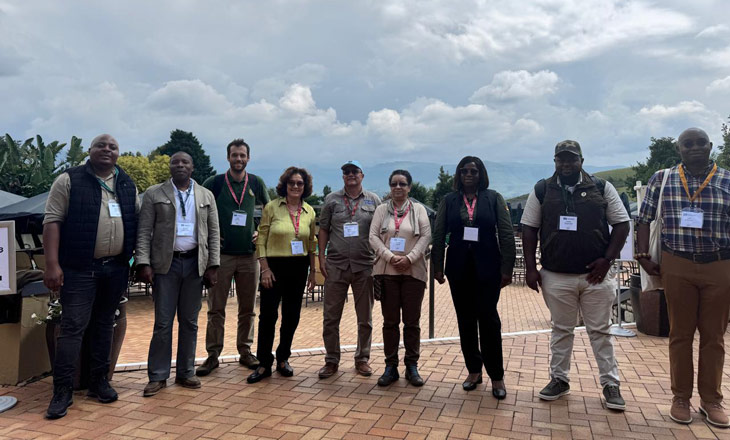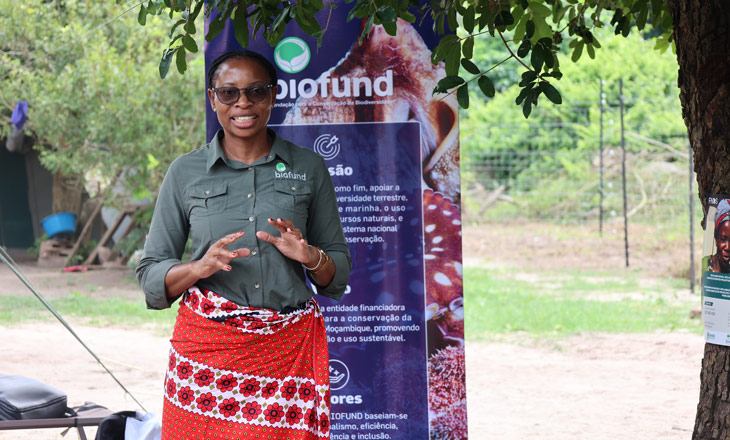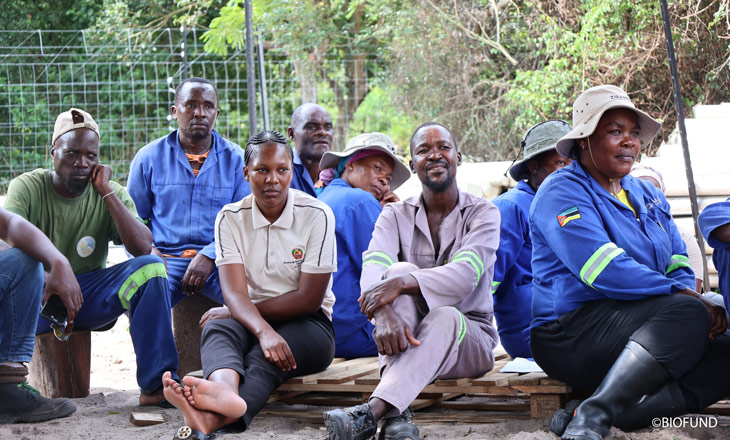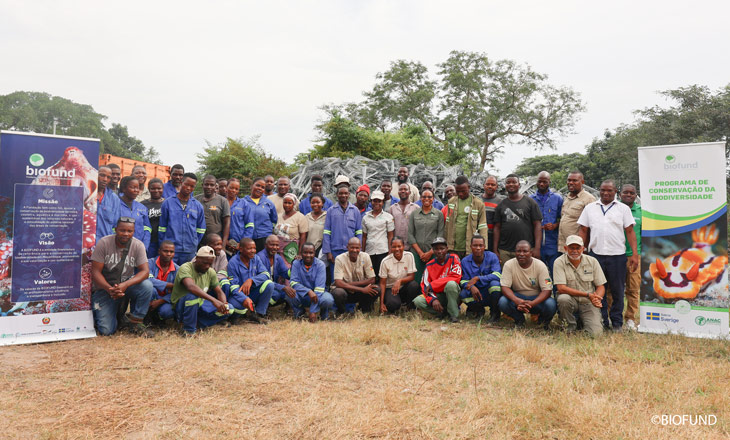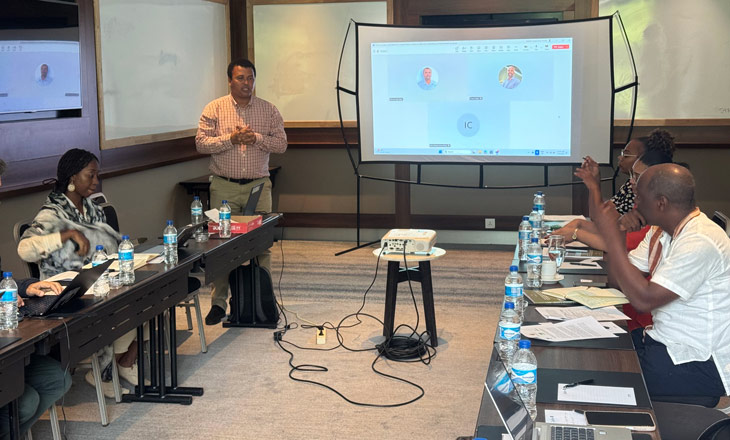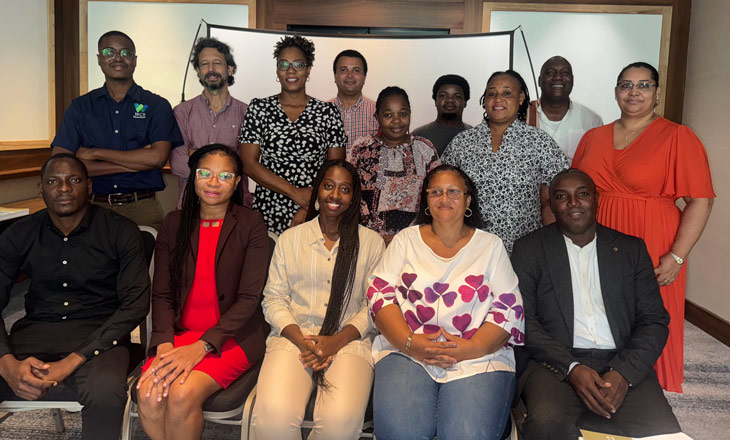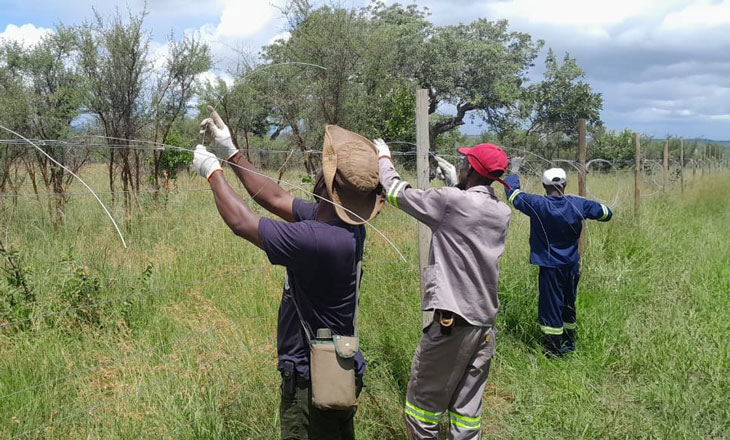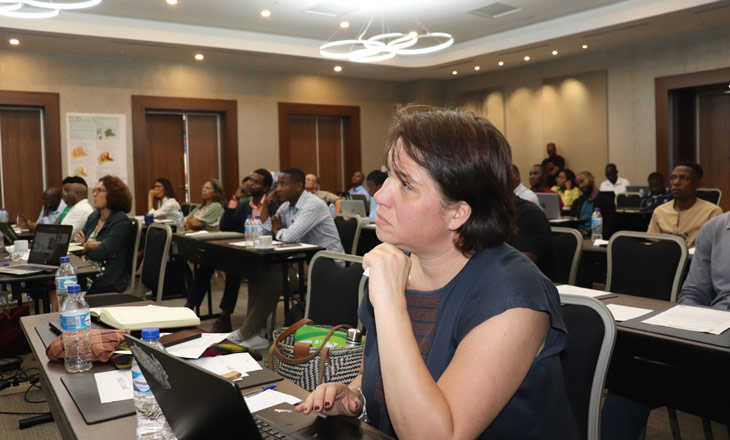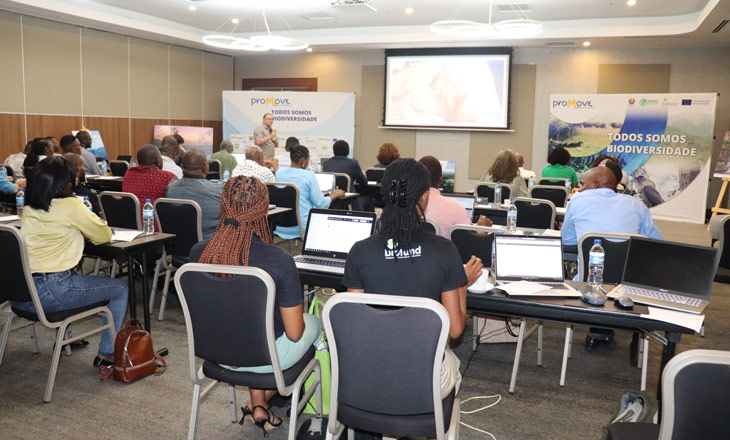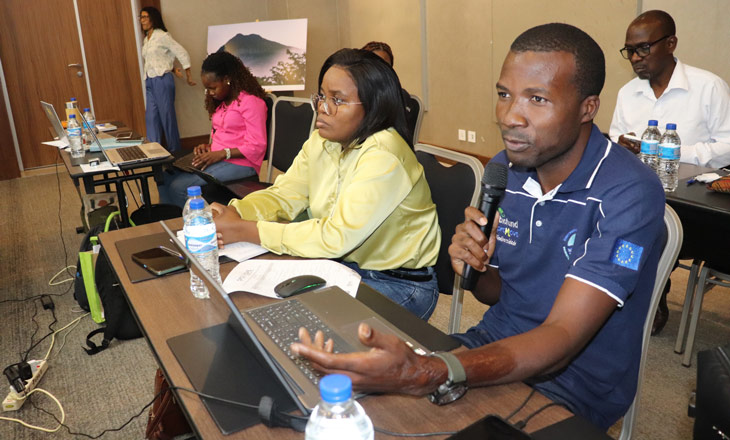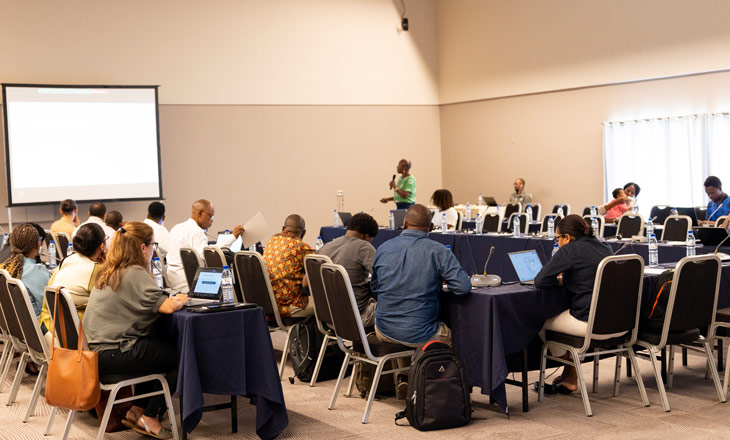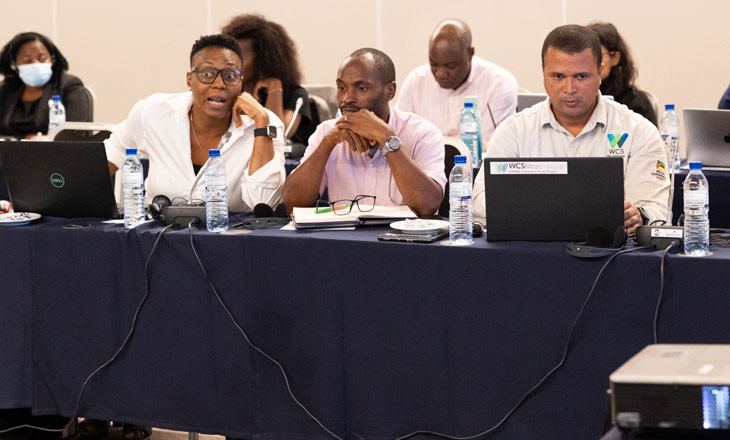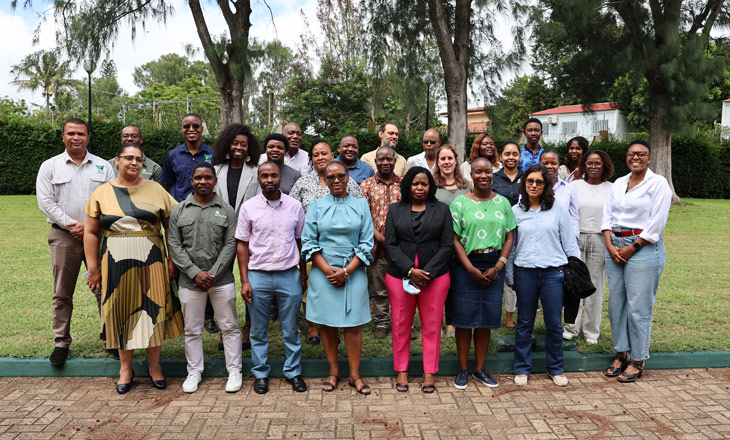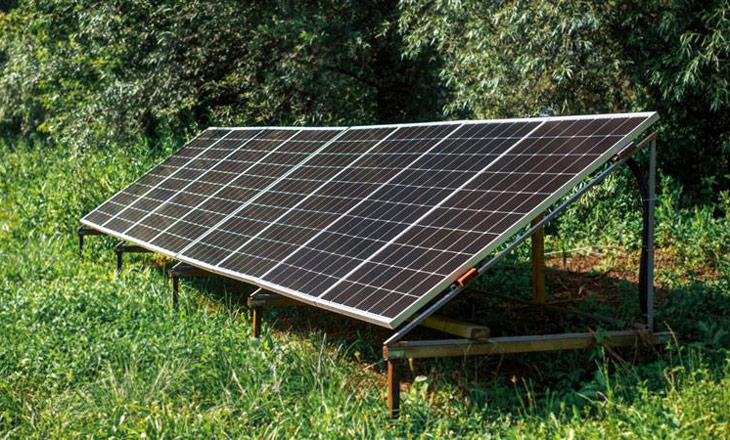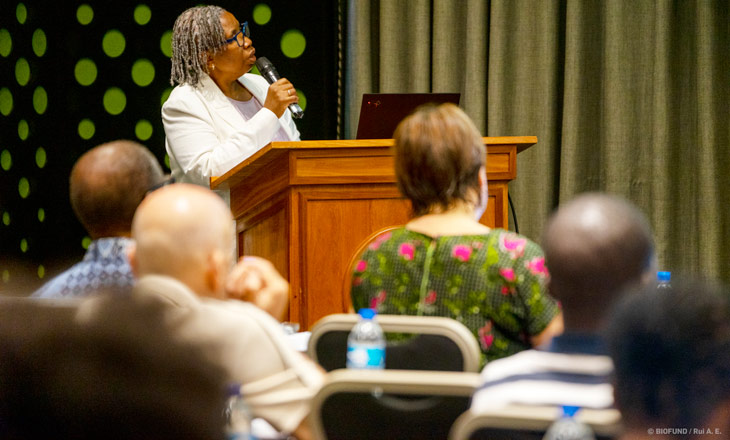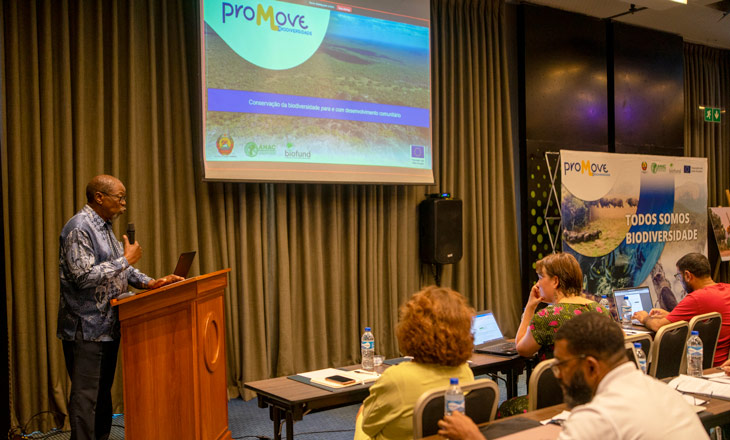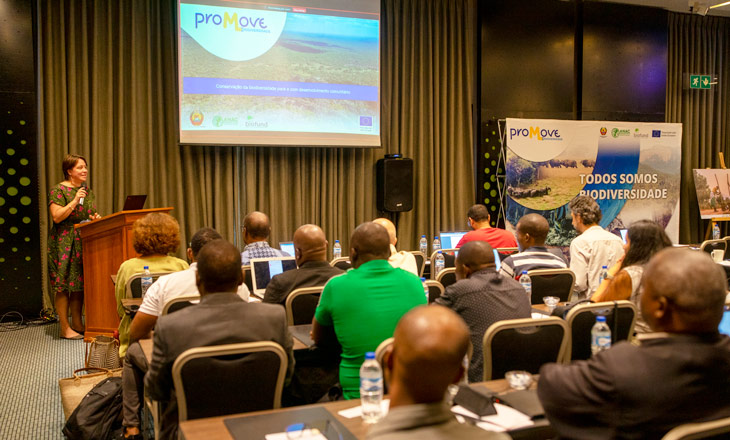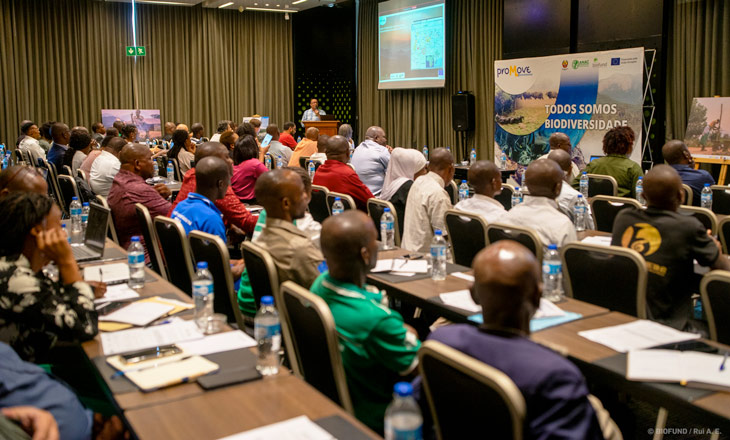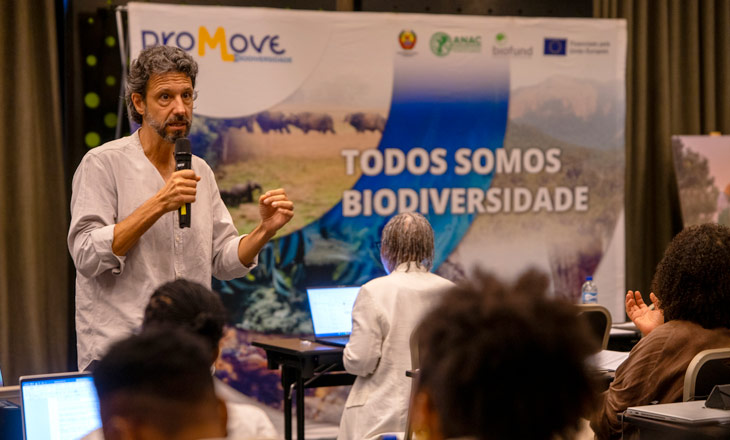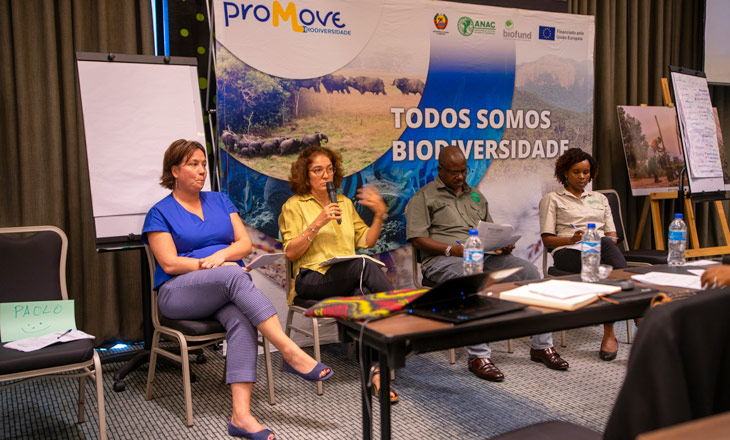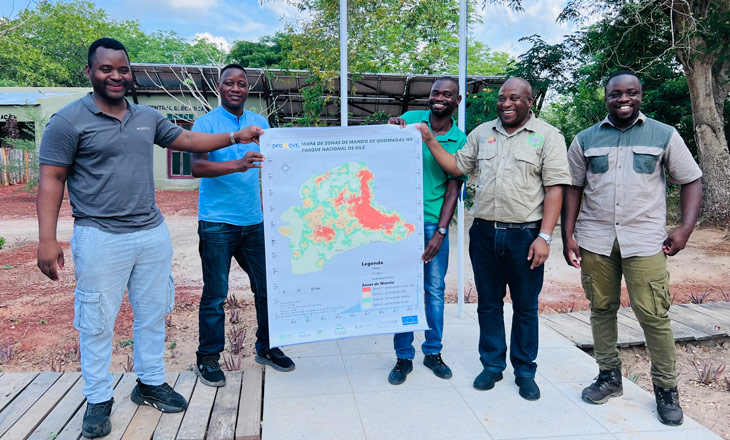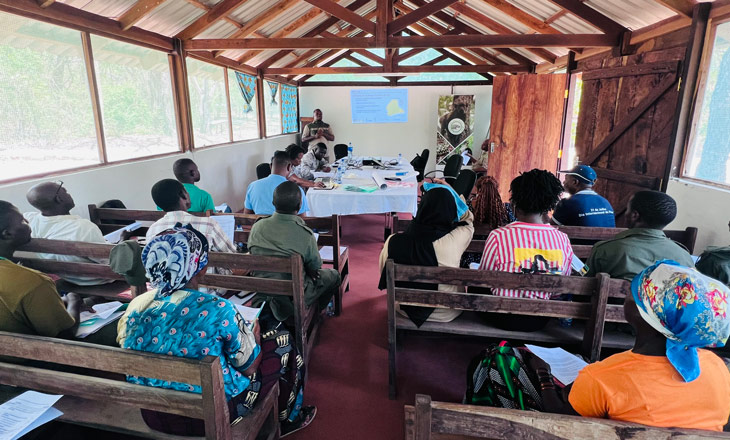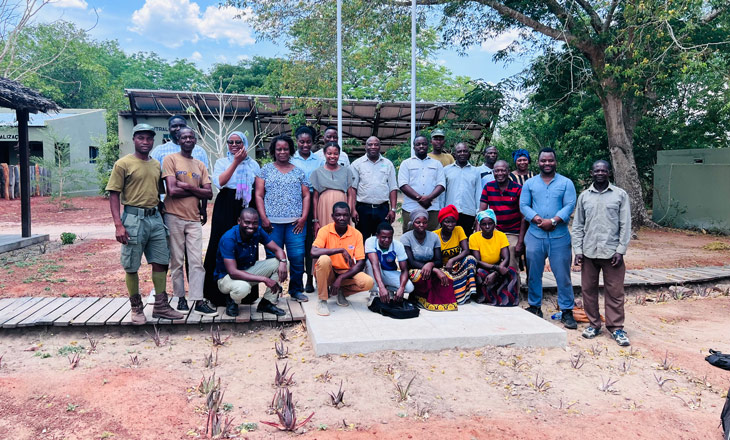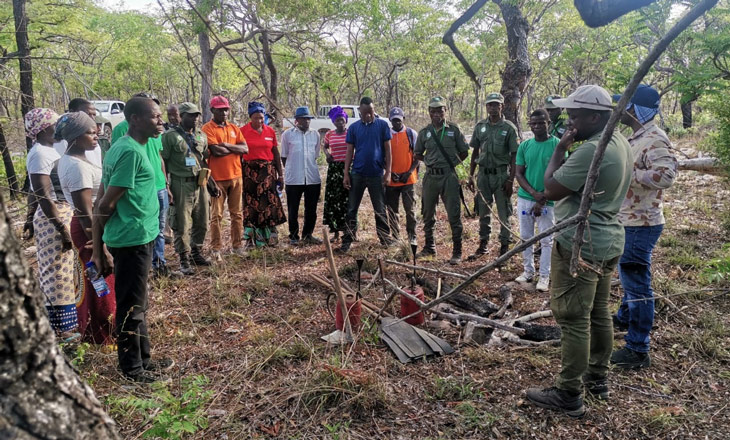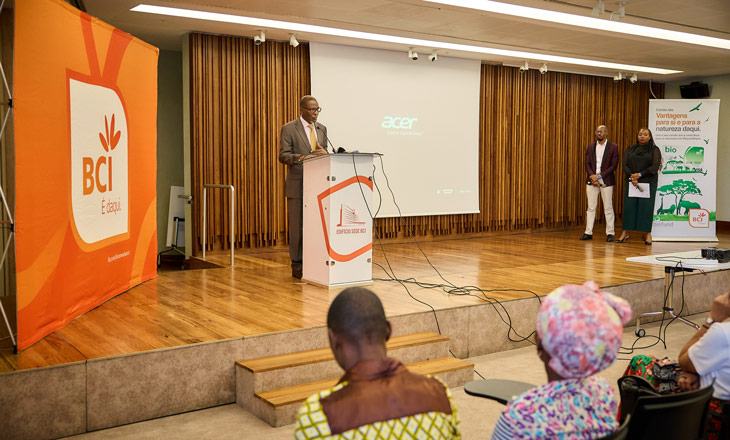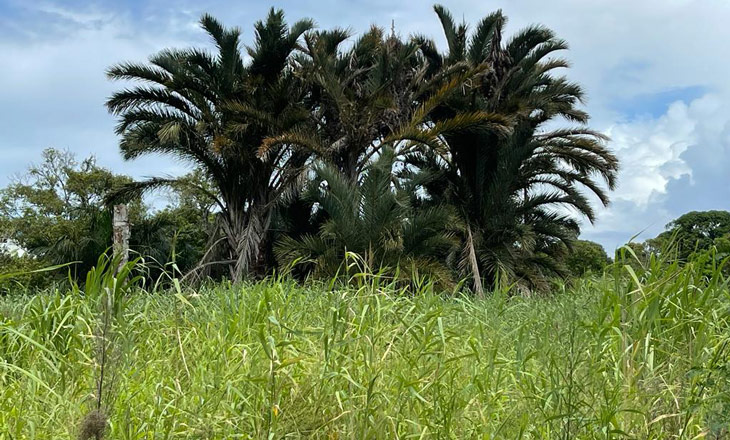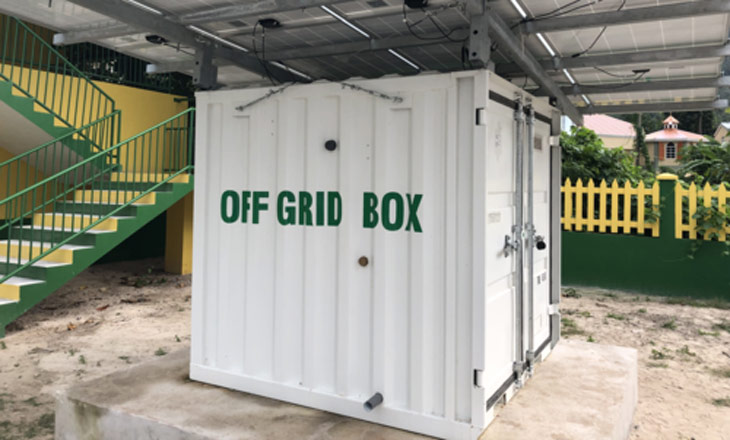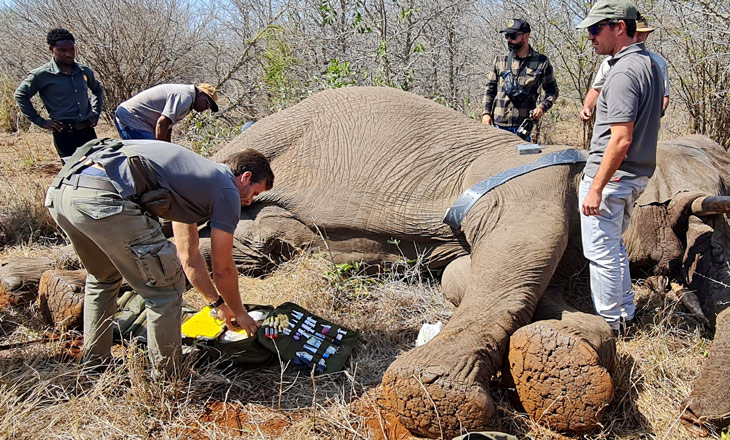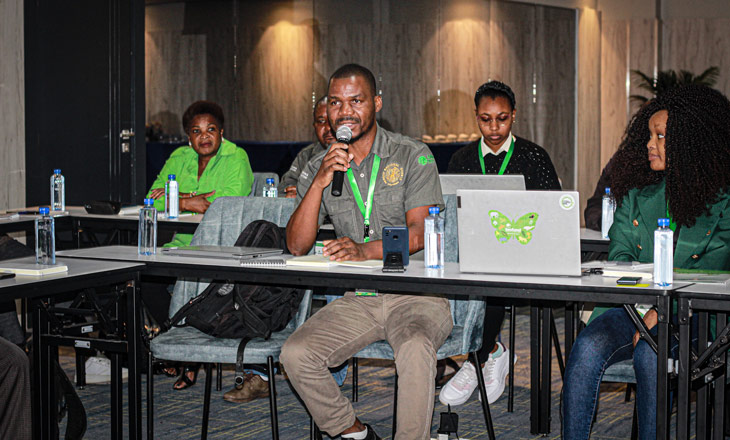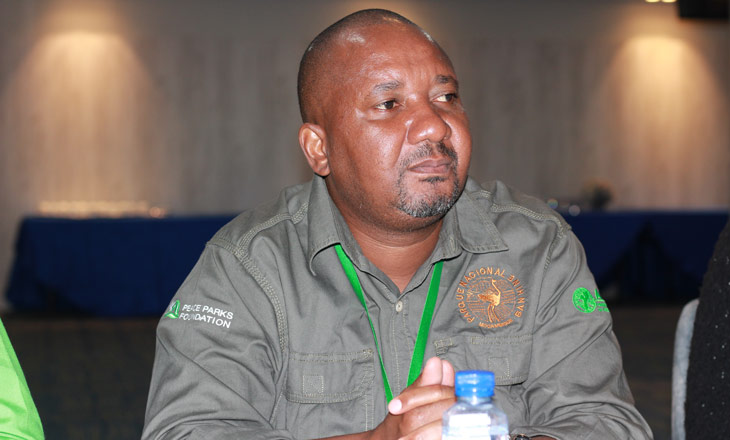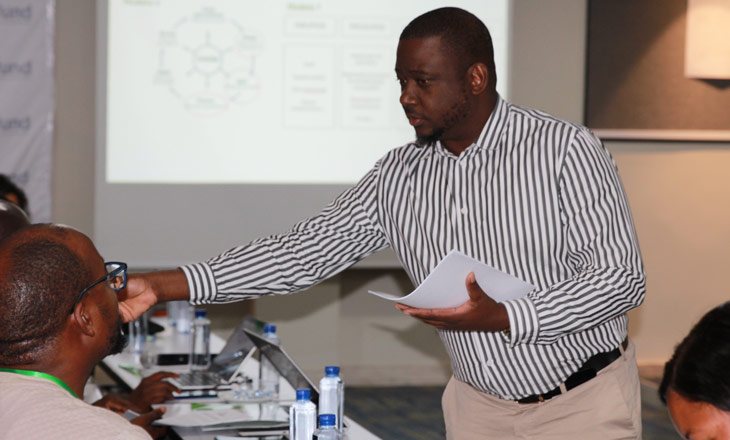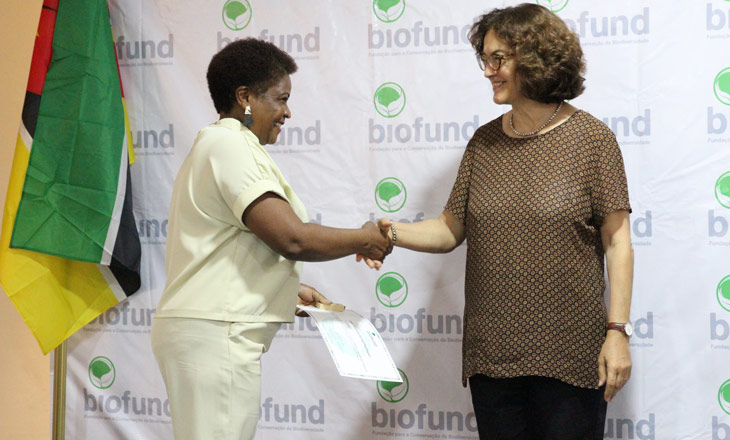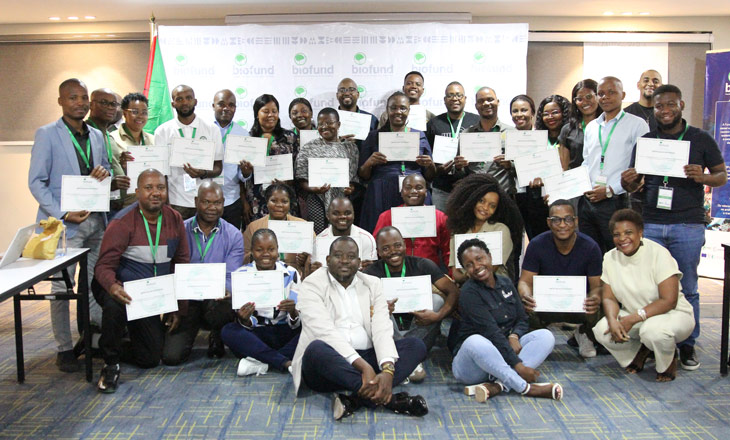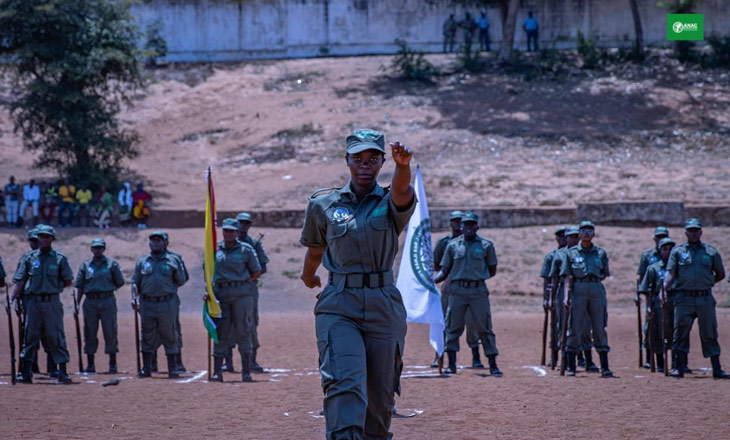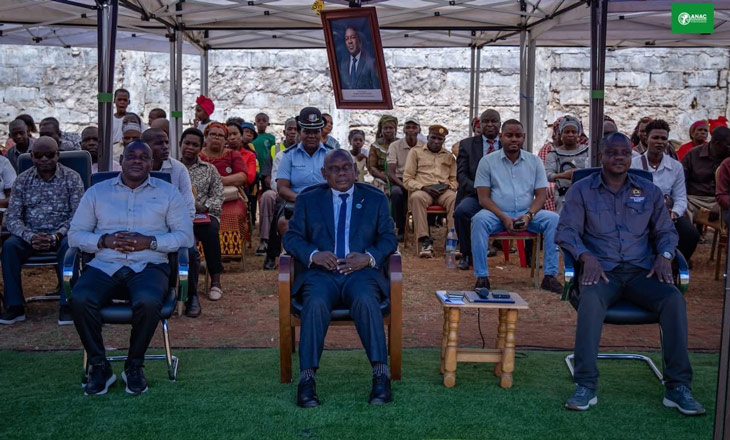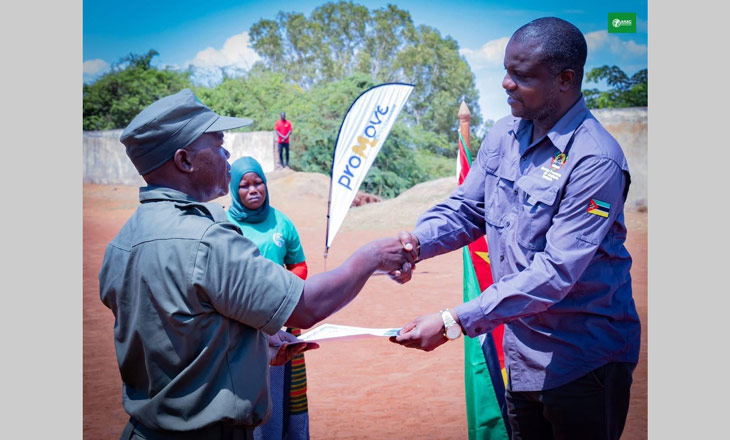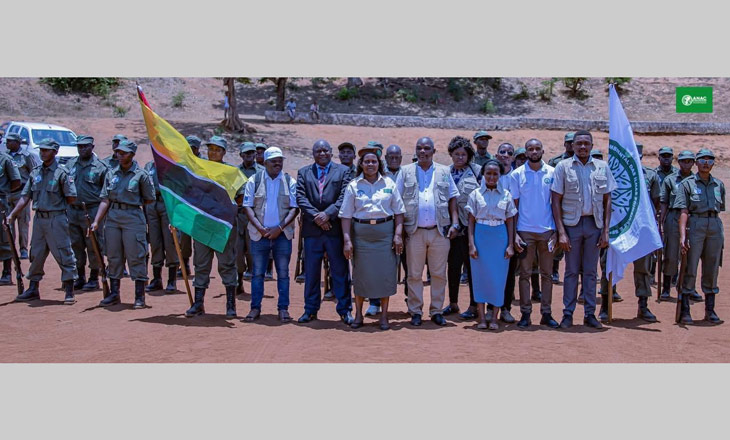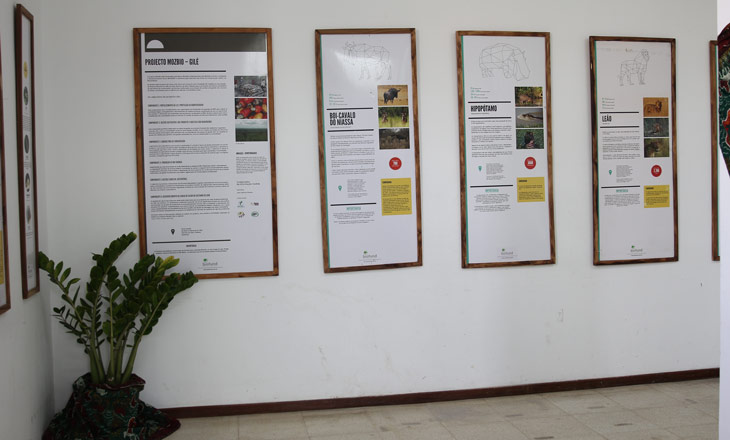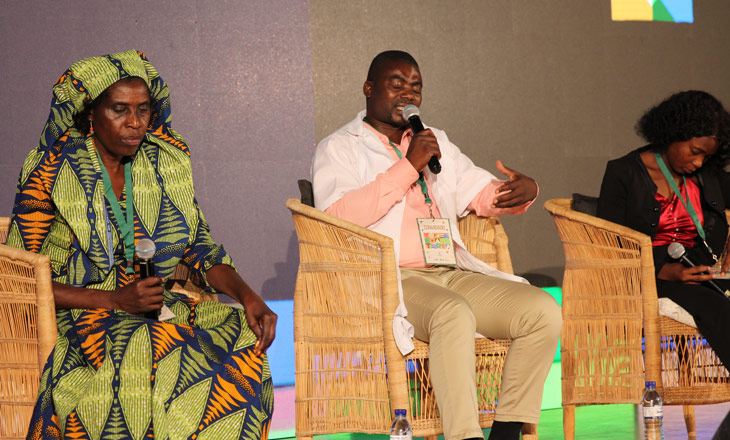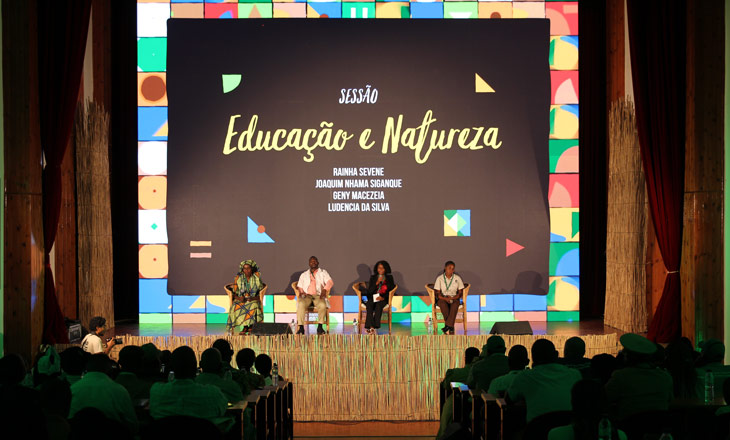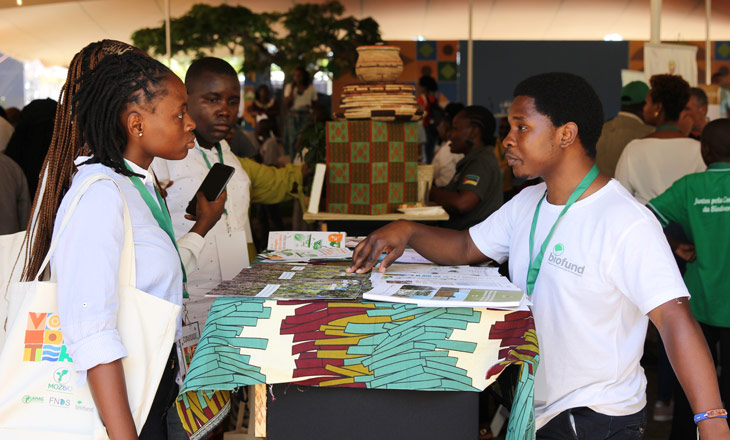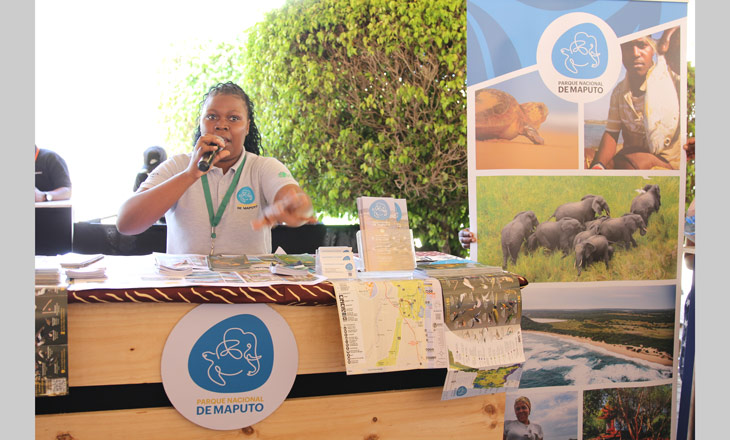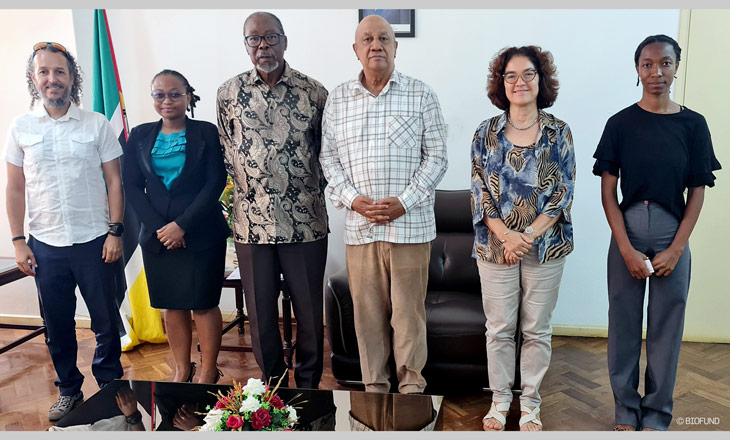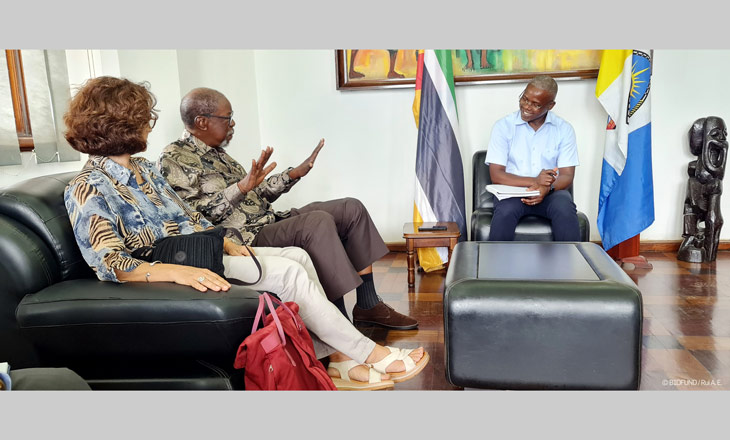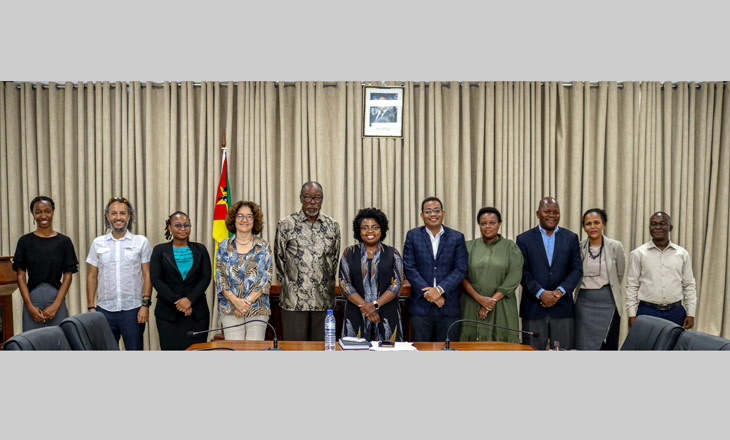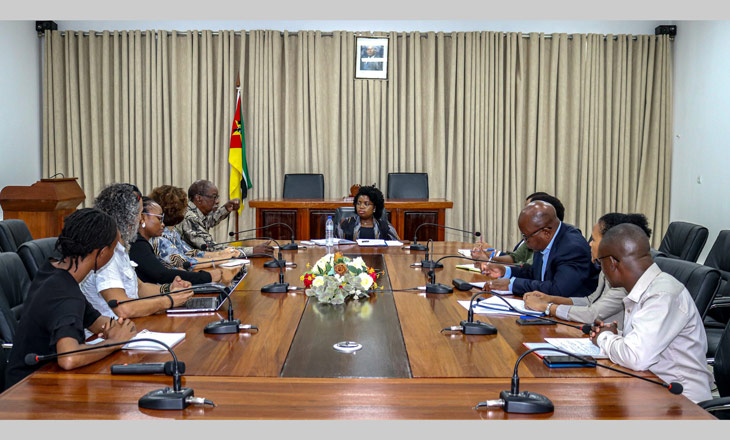Within the framework of the Pre-Professional Internship Programme of the Leadership Program for Conservation of Mozambique (PLCM), two young people have been standing out for their significant contributions to strengthening conservation and environmental education in Chimanimani National Park and its buffer zone.
Young Talents Drive Conservation Action in Chimanimani National Park
Osbone Maquival, who holds a Master’s degree in Mathematical Sciences from the African Institute for Mathematical Sciences (AIMS) in Rwanda, has been a key player in revitalising the Conservation Room at Sussundenga Secondary School. Thanks to his commitment, the space once again hosts weekly environmental education sessions, with more than 20 students participating in each class, addressing topics related to biodiversity conservation. Osbone also boosted the digital presence of the Conservation Room by creating its official TikTok account, used to creatively and engagingly promote awareness and conservation activities among young people.
In addition, he is preparing an Advanced Excel training course for the park’s technicians, contributing to strengthening the technical capacity of the team and demonstrating, in practice, the added value of interns in Conservation Areas.
“It has been a challenging and enriching experience. Being able to use digital tools to engage young people in environmental issues is something that motivates me every day. I believe we are laying the foundations for a new generation that is more aware and active in conservation,” shared Osbone.
Meanwhile, Nilza Figo, who holds a degree in Communication Sciences from the School of Journalism (Chimoio branch), stands out for producing educational content for the park’s digital platforms and creating informative posters. Recently, together with Osbone and in partnership with Sussundenga community radio, she has been promoting awareness programmes about environmental commemorative dates, strengthening the outreach of conservation messages among local communities.
“The internship has been an opportunity to apply my knowledge in communication in a real context with a direct impact on communities. Community radio allows us to reach more people and make conservation a part of their daily lives,” highlighted Nilza.
The Administrator of Chimanimani National Park, Leonel Massicame, emphasised the positive impact of the participation of these young people in the park’s initiatives, underlining the importance of ensuring continuity of the activities initiated, through the appointment of a dedicated focal point and the creation of sustainable conditions for maintaining the Conservation Room.
The experience of Nilza and Osbone illustrates that investing in youth can strengthen the management of Conservation Areas and inspire a new generation of leaders committed to biodiversity conservation. This outcome, driven by the PLCM Programme funded by the Government of Sweden through the Foundation for the Conservation of Biodiversity – BIOFUND, shows that young talents can enhance the management of conservation areas in Mozambique while promoting the emergence of new leaders dedicated to biodiversity protection.
From Theory to Practice: Jéssica Carlos and the Rise of a Young Conservationist in Manica
In the heart of Manica province, amidst plantation forests and communities that directly depend on natural resources, a young intern is transforming knowledge into impact. Jéssica Carlos, a graduate in Environmental and Natural Resources Engineering from Uni-Zambeze, is one of the beneficiaries of the 7th edition of the Pre-Professional Internship Programme of the Leadership Program for Conservation of Mozambique (PLCM) – an initiative of the Foundation for the Conservation of Biodiversity (BIOFUND), funded by the Government of Sweden.
Since the beginning of her internship at Portucel Mozambique, Jéssica has been engaged in several areas of sustainability, actively contributing to the integration of biodiversity into the company’s forest management. With clear goals defined in her internship plan, she participates in activities such as the validation of Conservation Areas, ecological restoration, natural resource monitoring, and environmental education actions.
Throughout the internship, Jéssica has already identified more than 100 hectares as priority areas for conservation and initiated the restoration process of a 6.5-hectare area with high ecological sensitivity. She has conducted environmental awareness sessions, reaching just over 210 farmers with messages on sustainable farming practices and forest protection. She also carries out the collection of water and soil samples at strategic points for the continuous environmental monitoring of the area under the company’s management, ensuring the follow-up of environmental impacts and the adoption of corrective measures whenever necessary.
But beyond the numbers, Jéssica stands out for the way she faces challenges and turns difficulties into opportunities for growth. In her testimony, she shared that the first months were demanding: dealing with new responsibilities, a complex organisational structure, and direct interaction with communities with different habits and languages required adaptation, resilience, and empathy. “It was challenging at the beginning, but I gradually adapted with the support of the technical team and my supervisor, even remotely,” she said.
One of the most inspiring moments of her activities, accompanied by the PLCM team, was when Jéssica led a community awareness session where she addressed, using simple language and everyday examples, issues such as deforestation and species extinction. By using illustrated posters and objects, she was able to capture participants’ attention and promote open and participatory dialogue. The clarity of her communication and the empathy with which she engaged with farmers reveal a young professional in full development.
Jéssica has also contributed innovative ideas to strengthen environmental education initiatives, proposing the establishment of continuous monitoring systems in communities and the creation of focus groups to assess the impact of interventions. With a strategic vision, she further suggested strengthening partnerships with institutions such as ANAC and Gorongosa National Park, aimed at supporting the management of Portucel’s intervention areas and the reintroduction of priority species.
Her internship has not only been an opportunity to apply technical knowledge but also a personal learning journey, where she has developed skills such as leadership, communication, decision-making, and time management. “I feel that I am growing as a person and as a professional. This internship has helped me move from theory to practice and to understand the real role I can play in biodiversity conservation,” she concluded.
The story of Jéssica Carlos reflects the mission of the PLCM: to invest in the potential of young Mozambicans committed to the future of conservation. It is also an inspiring example of what can be achieved when knowledge, opportunity, and the will to make a difference come together. Through her work, Jéssica is leaving a positive mark on Portucel Mozambique and on her own journey as a future leader in biodiversity conservation in Mozambique.
Inauguration of the Pangolin Rehabilitation Center and Recognition of Rangers Mark International Rangers’ Day Celebrations in Chimanimani
As part of the celebrations of International Rangers’ Day, the inauguration ceremony of the Pangolin Rescue, Rehabilitation and Release Center was held on July 31, 2025, at Chimanimani National Park (CNP). This facility is dedicated to strengthening the conservation of one of the most threatened species in the world.
The event was led by His Excellency Gustavo Sobrinho Dgedge, Secretary of State for Land and Environment, and took place in the context of the handover of a set of infrastructures built with the support of the MozBio 2 project, funded by the World Bank. Among the facilities delivered were type 1 and 2 staff houses, a conference room, a cafeteria, an operations room, a visitor center, and a solar plant, all of which enhance the park’s management and operational capacity.
The Pangolin Rehabilitation Center was built under the project “Rescue, Rehabilitation and Release of Pangolins in CNP”, funded by bio Card, an initiative of the Foundation for the Conservation of Biodiversity (BIOFUND), in partnership with Commercial Investment Bank (BCI). This center represents a significant milestone in national efforts to combat wildlife trafficking and strengthens CNP’s capacity to protect biodiversity.
In his speech, the Secretary of State highlighted the role of partners in making the initiative possible, stating: “Our gratitude extends to BCI, BIOFUND and Fauna & Flora for their support in the design of the pangolin rescue, rehabilitation and release center through the Bio Card.”
The occasion was also marked by a moment of recognition and appreciation for forest and wildlife rangers, with awards presented to the five rangers who stood out the most during 2024 under the Rangers Support Fund, also known as the Dr. Carlos Lopes Pereira Fund. This initiative, implemented by BIOFUND in collaboration with the National Administration of Conservation Areas (ANAC), aims to recognize the bravery, dedication, and commitment of rangers in protecting Mozambique’s conservation areas.
In this edition, rangers Peregrino Fernando (Chimanimani National Park), Tembo Singano (Gorongosa National Park), Emilda Mudau (Maputo National Park), Mário Cristóvão (Mariri Environmental Center), and António Fombe (Niassa Special Reserve) were distinguished for their outstanding contribution to biodiversity conservation in the country.
The ceremony highlighted not only the progress in infrastructure and conservation innovation but also the fundamental role of rangers, who often, under challenging conditions, dedicate their lives to safeguarding the country’s natural resources.
BIOFUND Reaffirms Commitment to Conservation and Community Development at the 6th Conference on Community-Based Natural Resource Management
The 6th Conference on Community-Based Natural Resource Management (CBNRM) took place from July 30 to August 1, 2025, in the City of Maputo. This national platform for dialogue and reflection on CBNRM was promoted by the Ministry of Agriculture, Environment and Fisheries (MAAP), with the technical and financial support of the Foundation for the Conservation of Biodiversity – BIOFUND, through the PROMOVE Biodiversidade Programme and the Northern Mozambique Rural Resilience Project (MozNorte).
The event, which brought together members of the Government, development partners, civil society organizations, private sector and representatives of local communities, focused on strengthening partnerships for conservation, valuing traditional knowledge, and recognizing the role of communities as active actors in the protection and sustainable management of natural resources.
Renewed commitments at the official opening
The official opening ceremony, led by His Excellency Gustavo Sobrinho Djedje, Secretary of State for the Environment at MAAP, highlighted the urgency of transforming commitments into concrete actions. The government official called for the creation of sustainable livelihoods and stressed the need to achieve results that can be assessed at the following conference.
“The presence of everyone demonstrates the commitment to involving communities in the conservation and sustainable use of natural resources”, he said.
Local experiences as a basis for sustainable solutions
On July 29, the day before the official opening of the Conference, a pre-event session was held, dedicated to the exchange of community experiences, involving participants from all provinces of the country, particularly from the buffer zones of Conservation Areas. This session underscored the importance of local participation in ecosystem restoration, sustainable management, and resilience to climate change.
Highlights of the second day: Feasibility, equity, and healthy ecosystems
The second day of the conference was marked by debates on the effectiveness of community-based Natural resources management and the initial results of a study on economic and financial viability of value chains in buffer zones. The need to integrate local governance, conservation, and economic development was emphasized, to ensure that benefits are distributed fairly and inclusively.
For its part, BIOFUND reaffirmed the importance of integrated approaches that recognize the value of community knowledge, strengthen local governance, and contribute to the sustainability of Conservation Areas.
Highlights of the final day: Partnerships, public policies, sustainable financing, and legal security
The closing of the Conference emphasized the importance of aligning community practices with the national legal framework, advocating for greater legal security, formal recognition of local initiatives, and sustainable financing to ensure the continuity of actions and long term effects.
The final sessions also reinforced the need for strategic partnerships to promote community-based natural resources management as a driver of economic inclusion, income generation, and preservation of natural heritage.
BIOFUND’s active participation in the 6th CBNRM Conference reflects its firm commitment to a community-centered conservation model that promotes equity, sustainability, and resilient development in Mozambique. This event was collaborative effort involving other partners, namely, the Community-Based Management Network (ReGeCom), the United Nations Food and Agriculture Organization (FAO), the World Wide Fund for Nature (WWF), the International Union for Conservation of Nature (IUCN), and the World Bank.
BIOFUND Supports Assessment of the Techobanine Reefs in Maputo National Park
Between June 27 and July 2, 2025, the first phase of data collection for the baseline study of the Techobanine Reef System (SRT), the largest Marine Total Protection Area of Maputo National Park (PNAM), took place. The initiative, led by the Likhulu Foundation, is financially supported by BIOFUND through the Biodiversity Conservation Programme, funded by Sweden and other entities, and is carried out in close collaboration with Maputo National Park.
During this phase, an extensive bathymetric survey was conducted, allowing the collection of more than 50,000 georeferenced data points. The technical team covered over 500 kilometres in open sea, mapping the seabed and identifying 185 potential sites for future scientific diving activities.
Based on the information collected and field observations, 24 priority sites were also identified, considered suitable for in-depth studies of coral, fish, invertebrate, and marine megafauna communities. During this first mission, several emblematic species were observed, including the green turtle, manta ray, potato grouper, and blacktip shark, reinforcing the ecological importance of the area.
In the next phases of the project, water, sediment, and marine tissue samples will be collected for environmental DNA (eDNA) analysis. This innovative technique will provide a broader understanding of the biodiversity present in the reefs, using genetic traces found in the environment without the need for direct visualisation.
The assessment of the Techobanine reefs represents a significant contribution to the management and conservation of the marine ecosystems of Maputo National Park. The data collected will enable more informed and sustainable decisions, reinforcing the protection of this unique ecosystem.
UEM and IIAM Strengthen Partnership in the Conservation of Mozambique’s Native Plants
A student from Eduardo Mondlane University (UEM) and five from Pedagogical University recently took part in a hands-on training in propagation techniques at the Biotechnology Laboratory of the Agricultural Research Institute of Mozambique (IIAM). The seven-day course, which also included a technician, focused primarily on the conservation of species from Mozambique’s Red List that are difficult to propagate.
The training was carried out under the project “Strengthening the University Botanical Garden forthe Conservation of Mozambique’s Red List Plants”, implemented by UEM’s Department of Biological Sciences and funded by the bio Card, a partnership between BIOFUND and BCI that has been supporting biodiversity conservation projects across the country.
The collaboration between UEM and IIAM spans more than two decades, enabling joint research, student training in research, professional internships, and the cultivation of native species in the botanical gardens of both institutions.
Through this initiative, students had the opportunity to deepen their knowledge of modern plant propagation techniques and to contribute directly to efforts to preserve Mozambique’s flora. More than academic experience, the training represents a concrete investment in the future of biodiversity and in strengthening a new generation of scientists committed to protecting the country’s natural heritage.
Education for Conservation: PLCM and MozRural Monitor Progress of Female Scholars in Chidzolomondo
On 21 July, the Leadership Program for the Conservation of Mozambique (PLCM) carried out a visit to the Chizolomondo Agricultural Institute, in Tete province, as part of the monitoring of female scholarship recipients from the districts of Mágoè and Zumbo who are attending technical secondary education with support from the Sustainable Rural Economy Program (MozRural), funded by the World Bank.
The mission included the participation of the team from the Zumbo Community Conservation Area and the Mágoè National Park, represented by the Park Administrator, Juliana Mwitu. In total, 23 students were monitored, of whom 10 are from Zumbo and 13 from Mágoè, distributed between the Agro-livestock and Forestry and Wildlife Management courses.
During the visit, the team met with the institute’s management and the scholarship recipients, assessing academic performance, behaviour, and general safety and living conditions in the boarding facilities. According to information shared by the Institute, the students have shown significant progress in school performance and attendance.
The Administrator of Mágoè National Park highlighted the transformative impact of the initiative:
“The presence of these young women in technical education represents a seed for the future of conservation. We are committed to continuing to support them, ensuring that they not only access technical knowledge but also return with a strong sense of commitment to their communities and to the preservation of natural resources.”
The visit also allowed the voices of the scholarship recipients to be heard, as they shared their challenges and aspirations:
“I am learning a lot about the importance of protecting natural resources, and I want to apply this knowledge in my community when I finish the course,” said Judith, a student in the Forestry and Wildlife Management course, originally from Mágoè.
Field observations revealed an increasingly conducive learning environment, with visible improvements in students’ behaviour, greater participation in classes, and strong academic commitment.
The visit also included awareness sessions on financial management, reinforcement of safeguard mechanisms, delivery of learning materials, and meetings with the boarding facility managers, who reported improvements in the behaviour and participation of the students. The scholarship recipients also benefit from tutoring sessions aimed at improving their academic performance.
The mission concluded with the signing of a memorandum of collaboration between Mágoè National Park, the Zumbo Community Conservation Area, and the Chizolomondo Agricultural Institute, reaffirming the joint commitment to the technical and professional training of young girls from buffer zones of Conservation Areas— a clear investment in capacity building and in the sustainable future of Mozambique.
BIOFUND participates in the 8th International Congress on Environmental Education of Portuguese-Speaking Countries and Communities in Manaus – Amazonas, Brazil
The Foundation for the Conservation of Biodiversity (BIOFUND) is participating, from 21 to 25 July 2025, in the 8th International Congress on Environmental Education of Portuguese-Speaking Countries and Communities, taking place in the city of Manaus, capital of the State of Amazonas, Brazil, at the facilities of the Matias Machline Foundation. The Congress brings together around 3,000 participants from nine Lusophone countries: Angola, Brazil, Cape Verde, Guinea-Bissau, Equatorial Guinea, Mozambique, Portugal, São Tomé and Príncipe, and Timor-Leste. Galicia (an autonomous region located in the northwest of Spain) is also present at the congress. It is one of the largest international forums dedicated to cultural, scientific, and institutional exchange among nations that share the Portuguese language.
Under the theme “Environmental Education and Local Action: Responses to the Climate Emergency, Environmental Justice, Democracy, and Well-Being”, the congress aims to promote dialogue on transformative Environmental Education practices, strengthen collaboration networks, and present concrete responses to climate and socio-environmental crises, with a focus on Environmental Justice and civic participation.
This Congress represents an important and highly relevant preparatory stage towards COP 30, which will take place in Belém do Pará, Brazil, in November of the current year. In this context, the Congress seeks to align visions, strategies, and commitments of Lusophone countries in the fight against climate change, reinforcing the role of Environmental Education and multilateral cooperation as pillars for a more sustainable planet.
BIOFUND is participating with support from the MozNorte project, integrating a delegation composed of: Alexandra Jorge (Programmes Director), Jéssica Julaia (Monitoring and Evaluation Manager), Ernesto Chauque (Monitoring and Evaluation Officer), Rosalina Chavana (Environmental and Social Safeguards Specialist), and Geny Alexandre Macezeia (Scholar of the MozNorte project). Throughout the five days of the congress, the team will engage in plenary sessions, thematic workshops, mini-courses, and field visits, representing Mozambique in collaboration with other institutions that are part of the Mozambican Delegation led by the Secretary of State for Land and Environment, Gustavo Dgedge.
During the congress, BIOFUND will share relevant experiences accumulated over the last 10 years in the field of biodiversity conservation, specifically Environmental Education.
The importance of education at all levels was widely highlighted during the opening session of the Congress. In her opening speech, the Brazilian Minister of the Environment and Climate Change, Marina Silva, emphasised that:
“Climate Change is no longer a future threat, but a reality lived today. Despite the diversity in the scope of action, all participating institutions share the same objective: Educating for Sustainability.”
May this congress inspire each participant to return to their contexts with renewed commitment and transformative action, for the good of the planet and future generations.
Learn more about the congress through the link:
https://www.even3.com.br/viii-congresso-internacional-de-educacao-ambiental-dos-paises-e-comunidades-de-lingua-portuguesa-483904/
BIOFUND visits FUNBIO, one of the largest environmental funds in Latin America and the world
The Foundation for the Conservation of Biodiversity – BIOFUND carried out, on 17 and 18 July, a technical exchange with the Brazilian Biodiversity Fund – FUNBIO, in the city of Rio de Janeiro, Brazil. The main objective of the exchange was to strengthen BIOFUND’s institutional practices, focusing on institutional and project monitoring, communication of results, and coordination between strategic areas such as finance and internal audit.
The participating team was composed of Jéssica Julaia, Monitoring and Evaluation (M&E) Manager, and Ernesto Chaúque, M&E Officer. Over two days, the teams from the two funds shared experiences, approaches, and good practices in the areas of project management, impact monitoring, financial control, communication, and internal audit.
The working sessions highlighted key topics such as the importance of fluid information exchange between technical areas, transparency in communicating results, efficiency in monitoring systems, and the fundamental role of internal audit in the continuous improvement of processes.
With nearly 30 years of experience, FUNBIO has disbursed more than 280 million dollars (only in the last 15 years) to around 500 Conservation Areas in Brazil. The formal partnership between FUNBIO and BIOFUND began in 2016, through a technical assistance programme financed by German Cooperation via KfW. At that stage, FUNBIO supported BIOFUND in developing strategic institutional instruments, such as the Operational Manuals and the 2018–2022 Strategic Plan, and also designed and advised the start of regular annual training sessions for financial managers of conservation areas in Mozambique.
This was the third exchange mission between the two institutions in Brazil, following the first visits carried out by BIOFUND’s Board in 2017. At that time, BIOFUND had only two projects in its portfolio. Currently, BIOFUND manages an active portfolio of approximately 150 million dollars, is a founding member of the Consortium of African Environmental Funds (CAFÉ), and has played an active role in mentoring and capacitating other African environmental funds.
This exchange precedes BIOFUND’s participation in the 8th Environmental Education Congress in Manaus, where the Foundation will share its experience accumulated over more than 10 years of work in Environmental Education in Mozambique.
Chimanimani National Park Strengthens Pangolin Protection with a Rehabilitation Center
The Foundation for the Conservation of Biodiversity (BIOFUND) carried out a monitoring visit to Chimanimani National Park in June, with the aim of assessing the progress of the Pangolin Rescue, Rehabilitation and Release Project. This initiative seeks to protect one of the most vulnerable and trafficked species in the world: the African pangolin (Smutsia temminckii). The project is funded by resources from the bio Card, a partnership between BIOFUND and Banco Comercial e de Investimentos (BCI), which supports innovative conservation actions across the country.
The project is to establish the first pangolin rehabilitation center in the park. The facility is being created through the adaptation of a specialized container, which will provide suitable conditions for the treatment and recovery of rescued animals. Since 2021, more than a dozen pangolins have already been saved in this protected area, many of them in critical condition as victims of illegal trafficking.
The rehabilitation center will include a first aid room, a quarantine area, and a controlled outdoor enclosure to ensure a safe and appropriate environment for the gradual recovery of the animals. At the same time, the park’s technical team, made up of rangers and staff trained by specialists from South Africa and Namibia, has been intensifying awareness-raising activities with local communities to reduce trafficking and promote greater understanding of the importance of conserving this emblematic species.
As a next step, a post-release monitoring program will be implemented using GPS and VHF telemetry technologies. This system will not only make it possible to track the movements of pangolins reintroduced into the wild but will also provide crucial information on their habitat use patterns and preferred ecological corridors, contributing to long-term conservation planning and management.
The creation of this center and the associated actions reinforce the commitment of Chimanimani National Park, BIOFUND and BCI to protect national biodiversity and combating the trafficking of endangered species.
Roberto Zolho, the Miombo Diplomat
By Jorge Ferrão
When my friend Baldeu Chande joined eternity, it was tormenting to write a message of praise or even a farewell. The pain spoke louder than any word, and whatever the message was, it would certainly never echo in any sensible and moved heart. Dealing with farewell is one of the most difficult experiences in life. The emotions involved, at that immediate moment, can be overwhelming, and often it is challenging to find the words that express the feelings of loss and longing. One does not only lose a friend and colleague, but a source of life experiences, knowledge, and so much that remained unshared.
Today, with the same heavy, torn, and still incredulous heart, I relive the emotions as I say goodbye to my companion and friend Roberto Zolho, this man of all physical builds, astute and insightful, but who, even in the silence of the bush and savannas, spoke more with his actions than many of us manage to speak through words and suggestions. Nature is not built with campaigns, meetings, and promises. Those who live within it know its commandments well.
Roberto was born in the heart of Sofala, where the waters of the Pungué spread over the plains and the land teaches us to respect the rhythm of the rain, the wind, and the giant creatures of all sizes. He grew up and became a man of the world in a place where the life of humans and the life of animals intertwine, and perhaps for this reason, inspired by his upbringing, he always cared more for wildlife and flora—far more and better than he cared for himself. I imagine he gave names to hundreds of animals and trees. He knew the story of each one and mourned the sad end of every tree felled in the forest, every buffalo lost to poaching, and the inconsistencies in the administration of these ecosystems. He learned to understand their instincts and, from them, reproduced his own models of life and theories.
In December 1981, when the war reached Gorongosa National Park now privatised and publicised, with Western trophies and almost none from the surrounding communities the bullets desecrated that sanctuary. In that confrontation between brothers who disagreed for political motives, idiosyncrasies, thirst for power, and poisoned democracies, he was one of the first to rise in defence of those who lived there, deep inside Gorongosa, that final mountain of the Rift Valley, caring for men, women, elephants, lions, and centuries-old trees. With wisdom and mastery, he became a peacemaker, a diplomat of the forests, and someone who knew how to listen more than speak. Who knows if his stutter was a divine purpose.
Zolho grew in stature, and like Samson and Delilah merged into a single divine being, he recreated Noah’s Ark for modern times and, with little spirituality but with conviction and determination, carried the armistice to new levels of tranquillity, where animals and humans came to share the dream of the same peace, reconciliation, and a life of brotherhood, far from weapons. Something the conflict was never able to conquer. Weapons do not build friendship or generate prosperity. Embrace and honesty do.
He risked himself to protect others, as those who care for nature always do, learning from it the meaning of courage. And after that darkness, he continued to work for Mozambique, helping to rebuild not only the park but also hope the dream of Mondlane in his fight for Mozambique that continues to live on this idyllic side of the Indian Ocean.
He was awarded the Environmental Merit Medal, but the greatest tribute paid to him by the land lies in the shade of the acacias, in the beating wings of the birds that returned to Gorongosa, and in the gaze of the young rangers who still today follow his steps and examples. They hear his voice and command.
The proverbs of our land are rich and reveal much more than the Portuguese language offers. I now recall that “The tree does not eat its own fruits.” Profound and fitting to remember this friend and colleague of the bush and savannas. Roberto was like that: he provided shade, he gave fruit, he gave everything, but kept nothing just for himself.
May his soul find rest among the miombo and mopane woodlands he so loved and cared for. May the animals he protected become his eternal song. And may we, who remain here, learn from him to care for what truly matters: the land, life, and one another, reconciled and at peace with nature.
Roberto, your footprint will remain in the sand of our time and of the times to come. (X)
BIOFUND Members’ Assembly Presents 2024 Results and Renews its Governing Bodies
The 3rd session of the Members’ Assembly of the Foundation for the Conservation of Biodiversity – BIOFUND took place on the afternoon of 3 July 2025, in the City of Maputo, bringing together around 82 participants, including representatives and guests from governmental and non-governmental institutions linked to the conservation sector.
During the session, the 2024 Annual Activities and Accounts Report was presented. Throughout 2024, BIOFUND strengthened its position as a national and international reference in biodiversity conservation financing solutions, established strategic partnerships with environmental funds from Africa, Latin America and the Caribbean, and provided capacity-building to eight Conservation Trust Funds (CTFs). At the national level, it reinforced collaboration with local partners in the implementation of projects in conservation areas, staff capacity building and civil society awareness, with a particular focus on young people.
In financial terms, BIOFUND achieved a high budget execution rate of 96%, of which 19.3 million USD were directly channelled to project beneficiaries, demonstrating efficient management aligned with its core mission.
During the session, Prof. Jorge Ferrão, representing the Board of Directors in his capacity as Vice-President of the body, stated:
“We continue to take pride, for over the years BIOFUND has consolidated its position as a robust institution at national and international level. And all this work is the result of the efforts of the BIOFUND team, the partners, and all the beneficiaries, to whom I extend my sincere gratitude.”
Despite the positive results, the importance of strengthening the monitoring of BIOFUND’s impact on the ecosystems where it operates was highlighted, as well as investing in innovative financing mechanisms to ensure the Foundation’s long-term sustainability.
The session included the election of 26 new ordinary members of BIOFUND (16 individual and 10 institutional), as well as the renewal of the mandates of the governing bodies. Noteworthy were the end of the mandates of the Chairperson of the Board (Narciso Matos) and the Vice-President (Jorge Ferrão), and the election of 4 new members of the Board of Directors and 1 new member of the Supervisory Board. Both governing bodies will meet soon to elect the new Chairperson, Vice-President and the new Chairperson of the Supervisory Board.
The session was followed by a scientific presentation on the Mozambique Mountains Initiative, aimed at promoting the conservation and valorisation of the country’s mountain ecosystems.
BIOFUND Marks the Passing of Roberto Zolho, Founding Member and an Unquestionable Reference in Biodiversity Conservation in Mozambique
The Foundation for the Conservation of Biodiversity – BIOFUND, with immense sorrow and profound grief, announces the passing of Roberto Zolho, one of the founding members of this institution and Secretary of the Members’ Assembly Board since 2021. Roberto Zolho passed away due to illness, leaving us prematurely and unexpectedly. His departure represents an irreparable loss to the biodiversity conservation community in Mozambique and internationally, to which he dedicated a great part of his life with passion, vision, and commitment.
A man of integrity, generous spirit, and tireless defender of nature, Zolho leaves an inspiring legacy of dedication and love for the environmental cause, which will continue to resonate in the work of BIOFUND and among all those who walked alongside him.
With a career spanning more than 35 years, Roberto Zolho stood out as a profound connoisseur of Mozambican and African biodiversity, with specialisations in wildlife and protected area management. His professional life was marked by unwavering dedication to nature conservation, reflected in his exemplary work within governmental and non-governmental institutions, both national and international, as well as multilateral agencies, with significant contributions in Mozambique, Tanzania, South Africa, and Australia. Among the remarkable roles he performed are:
- Administrator of Gorongosa National Park (1996–2007), where he led ecosystem restoration, coordinated wildlife census programmes, and conducted the first species reintroduction operations;
- Head of the Provincial Forestry and Wildlife Services in Sofala, where he promoted forest management and strengthened community programmes;
- Coordinator of the Limpopo Heartland Programme at the African Wildlife Foundation (AWF);
- Coordinator of the Climate Change and Development Programme at IUCN Mozambique;
- Coordinator of the Selous–Niassa Transboundary Programme at WWF-Tanzania;
- Coordinator of the Programme for the Restoration of Degraded Lands and Forest Landscapes at the National Fund for Sustainable Development (FNDS), where he led national initiatives aligned with global commitments such as AFR100 and the Bonn Challenge;
- And more recently, Climate Adaptation Affairs Coordinator for the Millennium Challenge Corporation.
For his remarkable contribution to nature conservation, Roberto Zolho was awarded the Environmental Merit Medal in 2022 by the then President of the Republic, Filipe Jacinto Nyusi—a solemn and well-deserved distinction recognising his profound and lasting impact on the conservation sector in Mozambique.
In addition to his tireless fieldwork and exceptional leadership, Roberto Zolho was also the author of several key studies and publications on biodiversity, climate change, protected area planning and sustainable resource use. His technical and scientific thinking contributed decisively to the development and professionalisation of the nature conservation sector in the country.
For BIOFUND, Zolho was not only a member of the Founders’ Committee, but also a member of the Board of Directors for several years. He remained active even after leaving that body, serving as Secretary of the Members’ Assembly Board, having renewed his mandate on 3 July of this year. Roberto Zolho played an active and inspiring role, with a generous presence and a constant willingness to share his knowledge with humility, leaving an indelible mark on the history and the heart of the Foundation.
Roberto Zolho departs physically, but his legacy remains alive in the biodiversity he helped preserve, in the policies he helped shape, and in the countless professionals he trained and influenced through his example.
To his family, friends, and colleagues, BIOFUND conveys its deepest condolences and expresses its profound gratitude for everything this remarkable defender of nature has done for the future of our country’s biodiversity.
Rest in peace, Roberto Zolho. Your memory will remain alive among us as a beacon of hope, wisdom, and commitment to the conservation of our natural heritage.
BIOFUND Launches the Mozambique Mountain Ecosystems Initiative
Historic event brings together various specialists, key government institutions, academic and research institutions, conservation NGOs, private sector, and development partners to address the protection of national biodiversity in the face of growing environmental threats
The group of specialists aiming to drive the conservation of Mozambique’s mountains — including ANAC, WWF, ReGeCom, NITIDADE, Gorongosa National Park, Chimanimani National Park, national and international scientists, the Malawi Conservation Fund, together with the Foundation for the Conservation of Biodiversity (BIOFUND) — held yesterday, at the Radisson Blu Hotel, the launch seminar of the Mozambique Mountain Ecosystems Initiative (MMEI), a coordinated action platform that aims to protect and promote the sustainable use of the ecosystem services provided by the country’s rich mountain network. The event, held under the theme “Journey Towards the Protection and Sustainable Use of Mozambique’s Mountain Network”, brought together more than 160 participants, including government representatives, academics, civil society, private sector and development partners.
Critical Context and Urgency for Action
The launch of the initiative comes at a particularly critical moment, as Mozambique’s mountain ecosystems face increasing pressures of devastation. The organisers referred to recent cases such as the one documented on Monte Mabo, in Lugela district, Zambézia, where nine illegal logging points of the Umbila species were identified, as reported on “Bom dia Moçambique”, TVM, on 26 June 2025, involving foreign citizens and local community leaders. This situation illustrates the urgency of the protection measures that MMEI intends to implement. It should be noted that since 2020, the PROMOVE Biodiversity programme has been under implementation, whose main result is the creation of local institutions (CONSERVAMabu) capable of leading Monte Mabu’s management, establishing a community conservation area covering approximately 9,300 ha defined participatively with local communities, and developing sustainable livelihoods that generate employment and income and encourage biodiversity conservation.
Strategic Value of Mountain Ecosystems
During the seminar, it was highlighted that Mozambique’s mountain ecosystems are rich in biodiversity and contribute significantly to essential ecosystem services, including hydrological regulation, soil fertility, pollination and climate stabilisation. Julian Bayliss, keynote speaker, presented scientific data demonstrating that these mountains host endemic, rare, new-to-science and threatened plant and animal species, according to the Red List classification of the International Union for Conservation of Nature (IUCN).
These services directly support the national economy by generating employment, income and tax revenue, through the provision of water to urban areas, the supply of mineral water (Namaacha, Gurué and Vumba), fisheries and hydropower generation, as well as services that contribute to food security. The rich sociocultural myths and customs associated with the mountains safeguard other ecosystem services, including biodiversity protection.
Community Engagement Experiences Presented from Manica, Sofala and Zambézia
The seminar included a specialised panel with representatives from four emblematic mountains:
- António Ngovene (Chimanimani) presented the results of biodiversity indicator surveys, highlighting unique ecological and sociocultural characteristics.
- Thor Kuchler (Gorongosa) focused on the solutions implemented, from sustainable livelihoods to mountain restoration programmes, demonstrating effective models of community participation.
- Sá Nogueira (Namuli) addressed the sustainable use interventions implemented and their positive effect on the well-being of local communities.
- António Serra (Mabu) shared the steps taken to establish the community conservation area, emphasising community leadership in management and financial sustainability.
National Call to Action
José Monteiro and Camila de Sousa were responsible for closing the event with the official launch of MMEI through a specific appeal directed to various sectors of Mozambican society:
- Researchers and Students were called upon to intensify studies on ecology, biodiversity, anthropology, history, culture and the economic value of mountains.
- Civil Society Organisations and the Private Sector were urged to support communities in developing sustainable value chains, exploring economic opportunities in partnership with local communities and establishing payment mechanisms for ecosystem services.
- Government was urged to create a favourable environment for the protection, sustainable management and payment for the services of mountain ecosystems.
- Development Partners were invited to support programmes addressing mountain biodiversity and contributing to climate and hydrological regulation within national and transboundary boundaries.
Historical Context of the Initiative
MMEI results from the participation of Mozambican researchers and professionals in the 2nd Southern African Mountain Conference (SAMC), held in South Africa in March 2025, which galvanised the need for coordinated action for the national and transboundary protection of mountains. International and national scientists, professionals and government representatives subsequently held reflection sessions to conceptualise this initiative.
Next Steps
The Mozambique Mountain Ecosystems Initiative is now established as a permanent platform for reflection and action for the protection, promotion of sustainable use, and payment for the ecosystem services of Mozambican and transboundary mountains. The initiative will include a short- and long-term agenda, involving all sectors of society in preserving this unique national and international heritage.
BIOFUND Welcomes Rob Walton on a Strategic Visit Focused on Biodiversity Conservation
The Foundation for the Conservation of Biodiversity – BIOFUND recently welcomed a visit from Rob Walton, an American businessman and conservationist, on a strategic mission to Mozambique that reinforces the country’s role in biodiversity conservation. The visit aimed to explore synergies and partnerships around innovative financing initiatives and the conservation of priority Conservation Areas.
Rob Walton is widely recognised as the former chairman of Walmart and current principal owner of the American football team, the Denver Broncos. Beyond the business world, Walton has been deeply dedicated to biodiversity conservation and sustainability, leading pioneering initiatives at Walmart and establishing partnerships with organisations such as Conservation International. He is currently focusing his efforts on biodiversity conservation on a global scale.
In 2024, through the Rob Walton Foundation, he funded a study in partnership with the Wildlife Conservation Society (WCS), African Parks, and the Frankfurt Zoological Society, which identified 162 protected areas in Africa with the potential to contribute significantly to biodiversity conservation. These areas represent about 33% of protected lands and host 71% of threatened vertebrate species. Known as “Keystone Protected Areas”, these regions are considered ecological pillars with the capacity to generate environmental and socioeconomic benefits across surrounding landscapes.
In this context, the project proposes a new way of identifying resilient areas that play a strategic role in biodiversity conservation and in providing ecosystem services. Among these areas, eight are located in Mozambique, reinforcing the country’s role in the continental conservation agenda.
During the visit to BIOFUND’s offices in Maputo, Rob Walton and his team were able to learn about the institution’s trajectory and the current state of support for Conservation Areas in Mozambique. Duko Hopman, Executive Director of the Rob Walton Foundation, stated:
“I have heard a lot about BIOFUND over the years, and I am glad to finally meet you. All these activities align with our objectives, and we are certain that BIOFUND can play an important role, especially in innovative financing mechanisms such as debt-for-nature swaps, biodiversity offsets, and environmental compensations.”
For his part, Sean Nazerali, Director of Innovative Financing at BIOFUND, stressed the importance of shared management models in Conservation Areas:
“Co-management is the right path among different actors in conservation, and there is a need to clearly communicate the value of conservation for the economy and communities. Conservation is development. If we want a sustainable economy, we must conserve.”
Rob Walton’s visit marks a significant step towards future international collaborations and reinforces BIOFUND’s role as a key actor in sustainable financing mechanisms for conservation. In close collaboration with ANAC, the entity responsible for managing conservation areas in Mozambique, this partnership strengthens the country’s institutional capacity. The Keystone Protected Areas approach may guide the next generation of strategic biodiversity investments in Africa, with Mozambique in a central position in this process.
CONSERVAMabu: Communities in Action for Biodiversity Conservation with the Support of PROMOVE Biodiversidade
Mount Mabu, one of the areas benefiting from the PROMOVE Biodiversidade programme, stands out as one of the sites of greatest ecological value in Mozambique. With a maximum altitude of about 1,700 meters and a montane forest covering 7,880 hectares, this region harbors species new to science, has a high rate of endemism, and includes species listed on the IUCN Red List. Due to its ecological and cultural importance, it is essential to declare the Mount Mabu forest, a community conservation area with effective management.
Within the framework of PROMOVE Biodiversidade, the Mount Mabu Biodiversity Conservation and Community Development Support Project, implemented by the WWF-ReGeCom-RADEZA consortium with funding from the European Union, under the management of the Foundation for the Conservation of Biodiversity (BIOFUND), established 11 community committees and created the management unit, an association known as CONSERVAMabu.
Created in 2023 and based in Nangazi, CONSERVAMabu represents the 11 local community committees in the management of the Mabu Forest. This management unit has stood out for its engagement in conservation activities for Mount Mabu, including the demarcation of the proposed Community Conservation Area totaling 9,300 hectares. CONSERVAMabu, together with the Lugela Administration, submitted the request for the declaration of this conservation area to ANAC.
Members of CONSERVAMabu regularly carry out environmental awareness activities, remove hunting traps from the forest, and contribute to promoting sustainable livelihoods such as conservation agriculture, beekeeping, and the identification of routes for ecotourism. These initiatives not only protect biodiversity but also improve the quality of life of local communities, creating a sustainable development model that can be replicated in other regions.
CONSERVAMabu is an inspiring example of how collaboration between international organizations, and local, provincial, and central government, together with communities and the support of development partners, can drive effective participatory management, ensuring the preservation of biodiversity for present and future generations. However, the success of this participatory approach requires strengthening of technical capacity, leadership, and transparent governance of this management unit. The PROMOVE Biodiversidade programme contributes to building these community-led biodiversity conservation models in the beneficiary landscapes.
Professional training strengthens sustainable livelihoods and conservation in the Niassa Reserve
At the end of the first quarter of 2025, twenty young residents of the Niassa Special Reserve completed intensive courses in electricity and photovoltaic systems, cutting and sewing, and cooking and pastry at the Centre for Sustainable Education in Pemba. The initiative is part of the Rural Resilience Project in Northern Mozambique (MozNorte), financed by the International Development Association (IDA/World Bank), implemented by the Wildlife Conservation Society (WCS Mozambique), with the Foundation for the Conservation of Biodiversity (BIOFUND) as the fiduciary agency and with the support of the Government of Mozambique.
MozNorte operates in 18 districts across the provinces of Niassa, Cabo Delgado and Nampula, where it will directly benefit around 300 communities. The objective is to improve the livelihoods of vulnerable populations, with particular focus on internally displaced people, and to ensure the sustainable management of natural resources in critical landscapes in the north of the country.
The completed courses fall under the subcomponent “stabilisation of livelihoods through community-driven development”, part of Component 1 of the project, which aims to “improve access to livelihoods and community infrastructure”. This subcomponent finances training, small businesses and labour-intensive infrastructure to generate quick income, promote social cohesion and reduce pressures on forests, wildlife and artisanal fisheries.
Over eight weeks, the trainees, selected from the districts of Mecula and Mavago, learned technical skills and concepts of health and safety, financial management and customer service. The knowledge acquired opens opportunities for self-employment and the creation of micro-enterprises, diversifying the local economy and strengthening household resilience in the face of climate shocks and conflicts.
By 2026, MozNorte plans to replicate similar initiatives in other districts, linking them with conservation agriculture, sustainable fishing and co-management of conservation areas, in order to consolidate income, social inclusion and biodiversity protection in the most fragile regions of the north of the country.
Joint Monitoring Mission of PROMOVE Biodiversidade Strengthens Conservation and Sustainable Development in the Primeiras and Segundas Islands
From May 19 to 23, the joint monitoring mission of the PROMOVE Biodiversidade Programme took place in the Primeiras and Segundas Islands Environmental Protection Area (APAIPS), in Nampula Province.
For five days, a multisectoral team toured the region – Nampula City, Angoche, and Moma – to assess the progress of implemented activities, the degree of achievement of results, and to reinforce the commitment towards effective biodiversity conservation and the sustainable development of local communities.
The mission, led by the Officer of the National Authorizing Office (GON), brought together representatives from the National Administration of Conservation Areas (ANAC) and APAIPS Administration, the European Union (EU), the Director of Programmes of the Foundation for the Conservation of Biodiversity (BIOFUND), the Coordinator of the PROMOVE Biodiversidade Programme (BIOFUND), and the implementing partner, the consortium led by the World Wide Fund for Nature (WWF) with KULIMA and AENA.
In Nampula City, mission members met with the Secretary of State and the Provincial Directorate of Agriculture and Fisheries, who emphasized the need to align environmental conservation with sustainable development, ensuring direct benefits to communities. Initiatives such as support for offshore fishing, quaculture, nutrition education, and improvement of access roads notably the Nametil–Angoche road currently under construction with EU support were highlighted.
In Angoche and Moma, the mission met with district authorities who reiterated their commitment to conservation and community development, highlighting actions such as joint enforcement, mangrove restoration, and studies on payment for environmental services (e.g., carbon credits). This was followed by visits to beneficiary communities, including Pulizica, Mucoroje, Mucucune, Corane, and Mafamede Island, where enforcement challenges were identified. In Angoche the the mission visited good practices in environmental education led by children. Community initiatives combining conservation and income generation were also presented:
- Fish processing infrastructure – washing tanks, salting, drying racks, and fish freezing facilities under construction in Pulizica and Mucoroje, with technical support provided by Kulima and WWF;
- Crab fattening – experimental cages that increase the product’s value before sale, supported by WWF;
- Improved beekeeping – sustainable hives installed in mangroves, with training provided by WWF in partnership with a private company, promoting honey production for income generation and ecosystem protection;
- Vegetable production greenhouse in the Mucucune community – the construction of a water storage tank, water pumping from the river, and sprinkler irrigation powered by solar energy aims to produce seedlings for the members of the greenhouse management group and for sale in the community, generating income and contributing to the inclusion of vegetables in their diet;
- Protection of the Pulizica and Corane sanctuaries – the common understanding among communities is their importance for increasing productivity; however, they still do not fully refrain from illegal activities. Monitors are callingfor incentives! The challenge lies in defining the type of incentives, their sustainability, and the role of the community as beneficiary in offering such incentives, among others;
- Management-oriented monitoring – this involves SMOG agents, community agents, and monitors who, on one hand, record data on illegal activities in the sanctuaries and along the coast, while others raise awareness among offenders to help them understand the benefit of preserving fish breeding grounds for increased catches.
These initiatives are funded by the European Union under the PROMOVE Biodiversidade programme and demonstrate sustainable livelihood alternatives that can help reduce pressure on marine resources. However, their economic and financial viability, tangible benefits, and scalability still deserve the attention of the partners involved in this action!
The mission highlighted that conservation and development must move forward together, requiring the active involvement of communities, government, and the private sector. To ensure impact and sustainability, it is essential to improve access and invest in basic infrastructure (water, energy, health, and education). PROMOVE Biodiversidade has been strengthening the protection of the Primeiras and Segundas Islands and investing in the future of the communities that depend on them. But the scale must be greater to achieve effective transformation!
Mozambique strengthens practical exchange of experience with key stakeholders to support biodiversity offsets implementation through field visits to Chimanimani National Park and the Districts of Nacala and Mossuril
As part of the implementation of the Biodiversity Offsets Directive (Ministerial Diploma No. 55/2022 of 19 May), the Government of Mozambique, through the COMBO+ Program, conducted two technical field visits between 13 and 21 May 2025: one in Chimanimani National Park (CNP) in Sussundenga District, Manica Province, and another in the localities of Cabaceira Grande in Mossuril District and Janga in Nacala-Porto District, Nampula Province. These visits aimed to share experiences, identify best practices and consolidating technical and institutional capacities for the implementation of biodiversity offsets in the country, particularly with the involvement of local communities.
In each site, the visit gathered over 50 participants, including representatives from central and provincial government, the private sector, civil society, and local communities. These exchanges helped to deepen the private sector’s technical understanding of the planning, implementation, and monitoring mechanisms of Biodiversity Offset Management Plans (BOMPs), which aims to offset environmental residual negative impacts of economic development projects. The visits reinforced the importance of prioritizing underfunded Conservation Areas (CAs) that are not achieving their conservation objectives, and Key Biodiversity Areas (KBAs) under threat of degradation, as priority locations for the implementation of future biodiversity offsets, as outlined in the Biodiversity Offsets Directive.
During the visit to Nacala-Porto, participants explored an area in Janga, currently under validation as a KBA. This area represents a unique ecosystem in Mozambique and the wider eastern African coastal region, composed of coral debris hosting a network of over twenty-three lagoons interconnected by underground tunnels linked to the sea. The site harbors many terrestrial and aquatic species, some of which may be new to science. It is also characterized by highly vulnerable and distinctive vegetation, including endemic and threatened species. However, the area is under significant threat due to charcoal production and limestone mining.
Community engagement was a key focus throughout the field visits. Participants observed activities led by local community members that involved the production and planting of seedlings (miombo and mangrove forests), promoting alternative livelihood models, and reinforcing the role of communities as implementers of biodiversity offsets.
The visit also included representatives from WCS China, accompanied by academic expert Yunju Li from the Kunming Institute of Botany of the Chinese Academy of Sciences, specialized in restoration of degraded ecosystem. During the technical session in Nacala, Professor Yunju Li shared his experience in implementing restoration activities linked to mine closure, highlighting methodologies, outcomes, and lessons learned. His contributions provided comparative perspectives on species selection for restoration, ecological rehabilitation techniques, monitoring approaches, and institutional collaboration, demonstrating how technical rigor and stakeholder coordination can ensure real, measurable biodiversity gains.
These visits were made possible with the financial support from the French Development Agency (AFD) and the French Facility for Global Environment (FFEM) through the COMBO+ Program and the CBDC Project, as well as from the Blue Action Fund and the Government of Sweden through the Biodiversity Conservation Program.
Turning Honey into a Future: The Journey of Gredice Pedro
Gredice Pedro, 45 years old and mother of six, once lived on subsistence farming in the community of Mussapa, Manica. Her interest in beekeeping was sparked when she saw other women joining the beekeeping project financed by the Foundation for the Conservation of Biodiversity (BIOFUND), through the Biodiversity Conservation and Community Development Project (CBDC), with funding from the French Development Agency (AFD). “In the past, beekeeping was seen as an activity exclusively for men,” she recalls.
With technical training, Langstroth hives, and protective equipment, Gredice ventured into a field traditionally dominated by men. She overcame the community’s initial skepticism with determination: “It was difficult at first, but over time, everyone accepted my teachings.” Today, she is the lead beekeeper and has already trained dozens of her neighbors.
The regular sale of honey has provided her with a stable income, allowing her to improve her home and self-esteem: “Selling honey allowed me to build my zinc-roofed house, which once seemed like a distant dream.” The impact extends to her family’s health, honey has become a home remedy and to women’s leadership, as Gredice is now an active voice in local decision-making.
Aware that forests sustain bees, she leads conservation actions. “We are reforesting degraded areas with native plants, and this is helping with environmental conservation,” she explains, while mobilizing neighbors to prevent wildfires and plant new trees.
Her future includes tripling the number of hives and involving her whole family. “I want to raise awareness in my family about the importance of this activity. It is essential not only for our survival but also for the conservation of our biodiversity,” she states with conviction.
Gredice’s story demonstrates that investing in women entrepreneurs strengthens communities, preserves forests, and generates prosperity. Every jar of honey sustains a household and protects Mozambique’s natural heritage. Support initiatives that empower women guardians of biodiversity because protecting nature is securing tomorrow.
Over 110 Rangers Strengthen Skills in Gender Equality and Safeguards in Mágoe and Tchuma Tchato
Mágoe & Zumbo, April 2025 — More than one hundred rangers from Mágoe National Park (PNM) and the Tchuma Tchato Community Programme (PCTT) completed, in April, an intensive training on gender equality, prevention of Gender-Based Violence (GBV), Sexual Exploitation and Abuse (SEA/SH), and social and environmental safeguards, under the MozRural programme. The initiative aims to ensure ethical and sensitive conduct from conservation officers, protecting local communities and visitors.
Project Requirements and Objectives
The MozRural programme establishes strict standards for environmental and social compliance. This training equipped participants with tools to:
- Identify risky behaviours
- Prevent situations of abuse
- Properly refer reported cases through the newly introduced Multisectoral Referral Mechanism, which integrates health, justice, security and social action.
Participation in Numbers
- Mágoe National Park — 80 participants (rangers and focal points).
- Tchuma Tchato Community Programme — 30 participants, including rangers, supervisors from the service provider Tiago Lidimba, and members of the district mechanism of Zumbo.
Code of Conduct Signed
One of the milestones of the training was the collective signing of the Code of Conduct, following a reading and clarification of its key points. The signed copies will be archived for accountability and auditing purposes, reinforcing individual commitment to ethics, respect and protection.
Impact and Next Steps
With these skills, rangers become agents of protection and safeguard, strengthening trust between communities and partner institutions — BIOFUND, ANAC and FNDS. The expected outcomes include:
- Reduction of GBV/SEA/SH incidents in conservation areas;
- Full compliance with response protocols;
- Promotion of a culture of responsibility, equality and inclusion on the ground.
How to Support
To learn more about these trainings or to support future initiatives, visit www.biofund.org.mz or contact info@biofund.org.mz. Share this news and inspire other conservation landscapes to adopt practices that protect both people and biodiversity.
Protecting this natural heritage is protecting the future.
Muwai Fence Marks a New Stage in Community Conservation in Mozambique
The foundation stone for the fence of the Muwai community conservation area was officially laid, in a ceremony filled with symbolism and collective commitment to biodiversity protection and community well-being. The 43 km elephant-proof structure promises to reduce human-wildlife conflicts while strengthening locally led conservation practices.
This initiative represents an unprecedented milestone in Mozambique, as it is the first community fence of its kind financed by the Foundation for the Conservation of Biodiversity (BIOFUND), with support from Sweden through its Biodiversity Conservation Programme. The project is being implemented in coordination with the National Administration of Conservation Areas (ANAC) and other partners, including the Maputo Conservation Company, the Maputo Environmental Protection Area, and the Maputo National Park.
During the ceremony, institutional and community representatives highlighted the importance of the structure not only as a physical barrier but as a symbol of “trust, partnership, and hope.” The fence was designed with technology adapted to elephant behavior, including solar-powered electric wires and reinforced structures to prevent invasions, thereby protecting neighboring farming communities.
The ANAC representative stressed that this is “a concrete step in the protection and conservation of wildlife” and thanked the involvement of national and international partners, such as the Embassy of Sweden, FNDS, and the World Bank. “More than a physical structure, it symbolizes the recognition of traditional values that have flourished here for generations,” he said.
Frida Rodhe, representative of the Embassy of Sweden, emphasized the long journey leading to the implementation of the project: “It is not only a fence; it is a symbol of hope and development for the area.” She also stressed the expectation that the structure “will bring safety to the communities, while also enhancing their production opportunities.”
Luís Bernardo Honwana, Executive Director of BIOFUND, reinforced the strategic role of this initiative for community conservation in the country:
“BIOFUND reaffirms its commitment to continue supporting strong community initiatives that promote conservation and contribute to the well-being of local communities.” He also emphasized the importance of the “active involvement of all institutions present: ANAC, APA Maputo, Maputo National Park, Maputo Conservation Company, and local authorities, to ensure the success and sustainability of this initiative and to consolidate the Muwai area as a national reference.”
Honwana also called for the “responsible and transparent management of resources” and highlighted the role of communities as the “true guardians of this area.”
Armando Tembe, a community representative, recalled that at the beginning “they did not believe this process would achieve these results,” but today the feeling is one of collective pride: “The communities are ready to conserve biodiversity.” The leader praised the training efforts and exchange of experiences carried out, particularly the study visits to South Africa, as examples of mobilization and community ownership of the project.
Finally, Musa, from the Maputo Conservation Company, explained in detail the technical functioning of the fence and the measures taken to ensure the safety of both people and animals. “This is the first line of defense (…). Communities on the other side can continue to live and do what they have been doing for a long time,” he said, referring to the direct impact the structure will have on the daily lives of local populations.
The ceremony ended with a visit to the construction site, where participants observed the technical components and clarified questions about the project. The Muwai fence thus establishes itself as a pioneering example of community conservation in Mozambique, combining local knowledge, technological innovation, and international cooperation.
Chimanimani National Park and partners carry out native tree planting to restore degraded areas
More than 25,100 seedlings of native species have been planted across approximately 14 hectares in Chimanimani National Park (PNC), as part of the pilot habitat improvement project. Key species planted for restoration include Brachystegia spp., Julbernadia globiflora, Erythrina lysistemon, Dichrostachys cinerea, among others.
This marks the first phase of the global target to plant around 216,000 seedlings across 130 ha in the communities of Nhabawa and Chikuwa, located in the PNC’s Total Protection Zone. The planting for this first phase took place from 1 to 21 April 2025 in areas previously identified as degraded due to land clearing for cultivation and other anthropogenic activities. Implementation was carried out by local communities contracted by the park, with guidance, monitoring and supervision from a multisectoral team composed of PNC technicians, Eden Reforestation, and recent graduates from the Manica Polytechnic Institute (ISPM) and the Chimoio Agricultural Institute (IAC).
This activity is part of the pilot habitat improvement project implemented in the PNC in partnership with the Foundation for the Conservation of Biodiversity (BIOFUND) as a test of procedures and capacity-building for future biodiversity offsets in the park. The initiative is financially supported by the French Development Agency (AFD) and the French Global Environment Facility (FFEM) through the Biodiversity Conservation and Community Development (CBDC) project implemented in the Chimanimani landscape since 2021.
BIOFUND represented Mozambique at the International Park Leadership Seminar in California
Mozambique was represented at the International Park Leadership Seminar, held from 22 April to 1 May 2025 in San Francisco, California (USA), by a delegation comprising members of the Foundation for the Conservation of Biodiversity (BIOFUND) and the Government of Mozambique. This national participation was part of a technical and institutional capacity-building initiative aimed at strengthening skills in protected area management and conservation leadership.
BIOFUND joined the mission through the participation of its Programme Director, Alexandra Jorge, and Project Manager, Victória Cossa, underscoring the institution’s active commitment to developing national capacity for more effective and sustainable management of protected areas. The delegation also included representatives from the National Administration of Conservation Areas (ANAC), namely its Director General, Pejul Calenga, the Administrator of Limpopo National Park, Francisco Pariela, and the Project Coordinator, Madyo Couto.
The seminar served as a strategic platform for sharing experiences and best practices among conservation professionals from countries such as Tanzania, Belize, Ireland, Ghana, Kenya, Japan, Ukraine, Slovakia, and the United States. It also featured collaboration with renowned institutions, including the National Park Service, the University of California – Natural Reserve System, Utah Valley University, and California State Parks.
BIOFUND’s presence at this international forum reinforced the institution’s role in promoting leadership and innovation in conservation in Mozambique, contributing to the design of stronger and more sustainable public policies and to the institutional strengthening of stakeholders within the National System of Conservation Areas.
Technical-Scientific Unit (UTC) trained in metrics to measure biodiversity losses and gains (species and ecosystems) in Mozambique
The Technical-Scientific Unit (UTC) to Support Biodiversity Offsets has benefited from training on metrics for measuring losses and gains in biodiversity (species and ecosystems). The event took place on April 17 in Maputo and was attended by 25 people, including members from the different institutions that make up the UTC, technicians from the Biodiversity Offset Assessment and Monitoring Division (RAACB) of the National Directorate for the Environment (DINAB) and trainers.
The training was promoted by the COMBO+ Program, a partnership between the Ministry of Agriculture, Environment and Fisheries (MAAP), the Wildlife Conservation Society (WCS-Mozambique) and the Foundation for the Conservation of Biodiversity (BIOFUND) and, was based on the recently developed “Orientation Guide Note for the development of suitable metrics for use in loss and gain calculations of ecosystems and/or species” by the COMBO+ Program International Team, with the recently developed “Seagrass Ecosystem Metrics” as a case study.
The UTC is a multi-sectoral group (made up of representatives from government institutions, the private sector, academia and civil society organizations) whose mission is to strategically support the Environmental Impact Assessment Authority in the design, assessment and monitoring of Biodiversity Offset Management Plans (BOMPs).
The COMBO+ Program is currently funded by the Agence Française de Developpement (AFD) and the Fonds Français pour l’Environnement Mondial (FFEM). In Mozambique, COMBO+ is also currently funded by the Government of Sweden through the Biodiversity Conservation Program.
PROMOVE Biodiversidade: Progress of Implemented Activities in the Provinces of Zambézia and Nampula
On Wednesday, April 23, 2025, in the City of Maputo, the 4th Session of the National Supervision Committee – CNS of PROMOVE Biodiversidade took place. The event was led by the Office of the National Authorizing Officer (GON), in coordination with the National Administration of Conservation Areas (ANAC), the European Union, and the Foundation for the Conservation of Biodiversity – BIOFUND.
The meeting brought together around 34 participants, both in person and online, including the Plenipotentiary Minister of the GON, the Deputy Director General of ANAC, the Head of the European Union Delegation and the Executive Director of BIOFUND. Also present were CNS members from the provinces of Nampula and Zambézia, the District Services for Economic Activities of Lugela, Administrators of the Conservation Areas benefiting from the Programme, as well as implementing partners. Results on the progress of activities in all programme intervention areas were presented, along with the findings of the mid-term evaluation of PROMOVE Biodiversidade.
Conservation and Research on Mount Mabu: The Role of PROMOVE Biodiversidade
PROMOVE Biodiversidade has been instrumental in conservation and research on Mount Mabu. Through this support, the WWF-ReGeCom-RADEZA consortium collaborated with the local community to demarcate 9,300 hectares for conservation and submitted a proposal for the creation of a Community Conservation Area (CCA) to ANAC. Studies and scientific expeditions were carried out with the last one conducted in 2024 involving 25 scientists supported by around 100 community members. This latest expedition not only increased knowledge of biodiversity but also raised the international visibility of Mount Mabu.
Five potential value chains were identified: conservation agriculture, beekeeping, ecotourism, fish farming, and mineral water bottling. In this context, 200 beneficiaries produced 2.27 tons of agricultural products, and 72 beekeeping beneficiaries established 47 apiaries.
PROMOVE Biodiversidade: Conservation and Sustainable Development in Gilé National Park
In Gilé National Park (PNAG), PROMOVE Biodiversidade financed research essential to support management decisions and influence conservation policies.
RADEZA supported several value chains, including agriculture (with technology transfer through Farmer Field Schools), beekeeping, fish farming, poultry farming, building boreholes, and milling.
In addition, conservation efforts through the agreement with the FFS-IGF foundation allowed for an increase in the number of rangers, the modernization of law enforcement and ecological monitoring processes, and improvement of mobility. The translocation of 200 buffaloes to this conservation area contributed to the restoration of biodiversity in the park.
APAIPS: Protecting Marine Biodiversity with PROMOVE Biodiversidade
PROMOVE Biodiversidade support has been vital for the Primeiras and Segundas Islands Environmental Protection Area (APAIPS). The consortium led by WWF, together with AENA and Kulima, contributed to the rehabilitation, expansion, and equippment of the APAIPS offices; promoted the training and graduation of the first group of 47 rangers in the history of APAIPS, including former community agents. PROMOVE Biodiversidade also supported the development of livelihoods by investing in agriculture and fish processing value chains. Support extended to engaging Community-Based Organizations (CBOs) in community awareness, patrols, and monitoring, strengthening marine biodiversity conservation.
CITES Regulation Approved by the Government: ANAC Leads the Process
In addition to the activities promoted in the conservation areas, under the implementation agreement of one of the PROMOVE Biodiversidade components focused on strengthening ANAC’s institutional capacity, the CITES regulation was drafted and approved by the government. This represents a significant milestone in the protection of endangered species through the effective implementation of CITES guidelines, creating conditions for the country to ascend to a higher category.
ANAC also played a crucial role in strengthening the CITES Scientific Authority by involving more universities, organizing training for various sectors dealing with security affairs, and ensuring that international conservation standards are strictly followed. The drafting of Complementary Standards for Management Mechanisms for Community Conservation Areas is another important outcome of this component.
The Deputy Director General of ANAC highlighted the importance of collaboration between the government, international organizations, and local communities to ensure the sustainability of conservation areas.
The Executive Director of BIOFUND reaffirmed the organization’s commitment to working with all stakeholders and using the programme’s results to improve future conservation initiatives.
The Head of Cooperation of the European Union in Maputo expressed pride in the role of PROMOVE Biodiversidade in protecting biodiversity and promoting sustainable development of local communities and challenged all programme stakeholders to overcome difficulties to achieve the programme’s objectives. She particularly highlighted the generation of tangible benefits for local communities and effective responses to the recommendations of the mid-term evaluation of the programme, whose results were also shared at this event. This evaluation highlighted the need to adopt a strategic approach to implementation of livelihoods and ensuring generation of tangible benefits for the beneficiary communities.
PROMOVE Biodiversidade is funded by the European Union and implemented by BIOFUND and ANAC, with the aim of promoting institutional strengthening, biodiversity conservation, community development, and research to inform practical management actions. Three Conservation Areas in the provinces of Nampula and Zambézia benefit from this support, namely Gilé National Park (PNAG), the Primeiras and Segundas Islands Environmental Protection Area (APAIPS) and its adjacent coastal areas, and Mount Mabu.
The CNS provides strategic guidance for the programme, ensuring its alignment with national policies and strategies, as well as with the international commitments to which Mozambique is a signatory. In addition, CNS advises and monitors implementers and beneficiaries to achieve the desired results and impact of the programme.
Second Southern African Mountain Conference: Overcoming Limits and Barriers
The Foundation for the Conservation of Biodiversity – BIOFUND participated, from March 17 to 20, 2025, in the 2nd Southern African Mountain Conference (SAMC25), held under the auspices of UNESCO and supported by dozens of sponsors, in the Drakensberg, South Africa. This community of practice served as an excellent platform for demonstrations, encouragement of research, sharing of experiences, and promotion of policies on the region’s mountain ecosystems.
The conference brought together more than 300 participants from various countries, including scientists, lecturers, students, government representatives, non-governmental organizations, intergovernmental entities and the United Nations, as well as members of local communities and civil society. The event featured several special sessions dedicated to the rich biodiversity of mountains, their cultural importance, carbon market opportunities, and transboundary conservation of mountain regions.
Mozambique was represented by BIOFUND (with the support of the MozNorte Project, funded by the World Bank), the WWF/ReGeCom/RADEZA consortium (implementers of PROMOVE Biodiversidade in Mount Mabu, with support from this programme), as well as by representatives of ANAC, Chimanimani National Park, and Gorongosa National Park (with support from the PNG). Regional partners from Malawi (Mount Mulanje) and international scientists with experience working in Mozambique, namely biodiversity and protected areas specialists, also participated.
During the plenary and parallel sessions, various presentations were made highlighting the biodiversity of Mount Mabu and other inselberg ranges in Mozambique, as well as ongoing activities to engage and empower local communities. Experiences from Gorongosa National Park were also shared on restoring the Afromontane system, balancing community development with biodiversity conservation.
There were also fascinating presentations on groups of mountain-loving volunteers, as well as the relevance and importance of planning and designing mountain trails for leisure and tourism purposes, an area of great potential in our country, yet to be explored!
The Mozambican representatives returned motivated by the emphasis given to mountain systems as sources of water, repositories of (often unique) biodiversity, and providers of other ecosystem services. This enthusiasm gave rise to preliminary discussions for the creation of a national movement to raise awareness and promote the conservation and sustainable use of mountain ecosystems.
30 Technicians Receive Training on Environmental and Social Safeguards in the Context of the Construction of the Muwai Community Conservation Area Electric Fence
In the second week of April 2025, thirty community technicians involved in the construction of a 43 km electric fence in the Muwai Community Conservation Area (Muwai CCA) benefited from training on Environmental and Social Safeguards. The training was delivered in Portuguese and Changana by specialists from the Foundation for the Conservation of Biodiversity (BIOFUND) and the National Administration of Conservation Areas (ANAC), with the aim of ensuring strict compliance with environmental and social standards during the implementation of the infrastructure.
During the training, crucial topics were addressed, such as the importance of conserving natural resources, good environmental and social practices in project implementation, Occupational Health, Hygiene and Safety (OHS) measures, the correct use of Personal Protective Equipment (PPE), as well as sensitive topics such as Gender-Based Violence (GBV), Sexual Exploitation and Abuse (SEA) and Sexual Harassment (SH). The beneficiaries were also informed about their rights and duties, the dialogue and grievance mechanism, and were introduced to the Green Line as one of the reporting channels.
The training is part of the Biodiversity Conservation Programme (2023–2027), coordinated by BIOFUND, in close collaboration with ANAC-IP, and funded by the Government of Sweden.
The initiative responds to a request from the Futhi Corridor Community Association, which represents the communities of Huco, Matchia, Madjadjane, Salamanga, Tchia and Massala, also located in the Futi Corridor, with the aim of mitigating the impacts of human-elephant conflict that has affected the region for several years.
With technical support from Conserve Global, Maputo National Park and the Maputo Environmental Protection Area (Maputo EPA), the project seeks to reduce human and agricultural losses, promote harmonious coexistence between communities and elephants, and foster the development of sustainable economic activities such as ecotourism.
It is important to highlight that this is the first project at national level involving the construction of an electric fence to establish a community conservation area. This initiative reinforces the relevance of active community involvement in biodiversity protection and in the promotion of sustainable and inclusive development.
Technical-Scientific Unit consolidates efforts towards the effective implementation of Biodiversity Offsets in Mozambique
On April 9 April, 2025, the Technical-Scientific Unit to Support Biodiversity Offsets held its first regular annual meeting. Composed of representatives from government institutions, the private sector, academia and civil society organizations, this multisectoral body plays a strategic role in supporting the Environmental Impact Assessment Authority in the design, evaluation, and monitoring of Biodiversity Offset Management Plans (PGCBs).
The session brought together 18 participants, including members, invited guests and the secretariat, and was marked by strategic discussions on the progress of implementing the Biodiversity Offsets Directive (Ministerial Diploma nº 55/2022 of 19 May). Emphasis was placed on reviewing the activities carried out in in 2024 and discussing the proposal work plan for 2025. Participants also received updates on the implementation status of Kenmare’s Biodiversity Offset Management Plan, as well as other potential PGCBs in development across the country. The meeting also featured a presentation on the status of technical guidelines, both existing and under development, for the implementation of the Ministerial Diploma. These tools are intended to support the Government, project proponents, environmental consultants, and other stakeholders involved in implementing biodiversity offsets in Mozambique. The group also reflected on the sustainability and composition of the Technical-Scientific Unit, outlining next steps to ensure its continued and effective operation.
The operationalization of the UTC is supported by the COMBO+ Program, a partnership between the Ministry of Agriculture, Environment and Fisheries (MAAP), the Wildlife Conservation Society (WCS-Mozambique) and the Foundation for the Conservation of Biodiversity (BIOFUND). The COMBO+ Program is currently funded by the Agence Française de Developpement (AFD) and the Fonds Français pour l’Environnement Mondial (FFEM). In Mozambique, COMBO+ is also currently funded by tthe Government of Sweden through the Biodiversity Conservation Program.
This meeting not only reaffirmed the UTC’s strategic role but also strengthened the collective commitment to biodiversity conservation in Mozambique, in alignment with national and international targets.
Bio Card Funds Fence to Mitigate Conflicts Between Elephants and Communities in Moamba District
In March 2025, the installation of a 3.7 km fence was completed at the Incomati Conservancy, in Moamba District, with the aim of reducing conflicts between local communities and elephants. The initiative is part of the project “Voices of the Savanna: Elephants Monitored, Communities Heard”, implemented by Mozambique Wildlife Alliance (MWA) in coordination with the National Administration of Conservation Areas (ANAC), and funded by the bio Card, a partnership between the Foundation for the Conservation of Biodiversity (BIOFUND) and Commercial Investment Bank (BCI).
With a total value of 3,152,210.00 MZN, this fence represents more than just a physical barrier. It is an innovative strategy that protects farms, infrastructure, and community livelihoods, mitigating the impacts of elephant migration while promoting both population safety and biodiversity conservation.
The activity was carried out by HSES (High Security Electronic Solution), with Incomati Conservancy as the beneficiary and strategic partner. Seven staff members from Incomati Conservancy, all from neighboring communities, played an active role in the initiative, strengthening local involvement in biodiversity conservation and commitment to elephant protection.
To reinforce awareness of the importance of the fence, a guided visit is scheduled for community leaders and district authorities of Moamba, encouraging open dialogue on the challenges of coexistence between humans and elephants.
This milestone strengthens MWA’s commitment to fulfilling its Memorandum of Understanding with ANAC. By enabling this funding, the bio Card reaffirms its role in supporting biodiversity conservation projects and promoting harmonious coexistence between communities and wildlife.
PROMOVE Biodiversidade: Results of Studies Conducted in PNAG and Mount Mabu Highlight the Importance of Research for Conservation
These are the results of applied research promoted by the PROMOVE Biodiversidade Programme, funded by the European Union, carried out in Gilé National Park (PNAG) and Mount Mabu, and presented at the seminar organized by the Foundation for the Conservation of Biodiversity – BIOFUND and partners, on February 21, in the City of Maputo.
The event was attended by about 63 participants, including representatives of the European Union, the National Administration of Conservation Areas (ANAC) and other Directorates of the Ministry of Agriculture, Environment and Fisheries – MAAP, Gilé National Park – PNAG, Mount Mabu, the Environmental Protection Area of the Primeiras and Segundas Islands (APAIPS), the National Institute of Statistics (INE), and Academia. The objective was to disseminate the results of five scientific studies and their implications to the management of PNAG and Mount Mabu. The studies addressed crucial topics for the conservation and sustainable management of these conservation areas:
- Fire and its Effect on the Ecology of PNAG and Implications for Park Management, carried out by Eduardo Mondlane University, Faculty of Agronony and Forestry Engineering – UEM/FAEF;
- Large Mammals of PNAG: Conservation Status and Impact of Reintroduction on Ecological Restoration, carried out by UniLúrio;
- Relationship between the Population of the Buffer Zone of PNAG, Use of Natural Resources and Some Demographic Projections, carried out by the Catholic University of Mozambique – UCM;
- Study of the Hydrological Potential of Mount Mabu, carried out by the National Institute of Irrigation in collaboration with UEM/FAEF – INIR and FAEF;
- Results of Scientific Expeditions, carried out by the WWF-ReGeCom-RADEZA consortium.
Among the results presented, there is an indication that about 60% of the park’s total area is affected annually by intense and severe fire, associated with the prevalence of poaching inside the park. Nonetheless, fire-resistant species continue to dominate in high-severity areas.
Miombo species continue to dominate the vegetation regardless of the severity of the fire. In areas of higher severity, fire-resistant species were less affected, but the ecosystem structure was impacted by the severity, resulting in a significant reduction in natural regeneration. These results motivated the organization of training on fire management for local communities, park staff, and local government. Furthermore, it was recommended to conduct an analysis on the effect of fire on beekeeping flora, its flowering, bee populations, and beekeeping productivity, which is an important value chain in the region.
Also, in PNAG, UniLúrio’s research found the absence of large carnivores and indicated growth in the population of medium and large herbivores in the last decade, creating favorable conditions and prey availability for predators.
Despite the absence of resident communities inside PNAG, it is essential to understand the population dynamics in the buffer zone, given its effect on the demand for goods and services such as biodiversity, pollination, hydrological resources, scenic landscape, and carbon sequestration provided by the Park. UCM’s study recorded an average population growth of 1.8% between 2023 and 2024 and a reduction in pregnancies among young mothers of ages 15–19 from 26% to 13%. Although the estimated average population growth is lower than census projections, it is necessary to monitor these indicators for effective PNAG management and community development.
Equally, for Mount Mabu, the studies reinforced the high value of biodiversity and the vulnerability of species to habitat degradation. Furthermore, the hydrological analysis identified around 17 watercourses of excellent quality, opening opportunities for the development of value chains linked to agriculture, aquaculture, beekeeping, fishing, hydroelectric energy production, mineral water extraction, among others.
For ANAC, the results of these studies promoted by the PROMOVE Biodiversidade programme make it possible to understand the current state of conservation in PNAG, document the biodiversity available in Mount Mabu, and identifies local needs for informed preparation of effective management plans, and eventually contribute to the formulation of public policies focused on biodiversity conservation.
Mozambique Strengthens Marine Conservation: new metric developed to assess the ecological condition of seagrass in Mozambique
On February 26, 2025, the COMBO+ Program—a partnership between the Wildlife Conservation Society (WCS), Foundation for the Conservation of Biodiversity (BIOFUND), and the Ministry of Agriculture, Environment and Fisheries (represented by the National Directorate for the Environment (DINAB)) — held a workshop to validate the seagrass ecological condition metric in Mozambique.
Developed by the Mozambican government in collaboration with strategic partners, this metric represents a step forward in the search for a balance between economic development and conservation of marine biodiversity. This process follows the principles of the mitigation hierarchy for impacts on biodiversity and the new Directive on Biodiversity Offsets (Ministerial Diploma No. 55/2022 of May 19), consolidating it as the fourth tool for monitoring and assessing the ecological condition of the country’s ecosystems.
The workshop, which was held in a hybrid format during the week of World Seagrass Day, was attended by 42 national and international participants, including marine biologists, seagrass specialists, university lecturers, environmental consultants, project managers and other stakeholders. The session was led by Dr Célia Macamo, an individual consultant and lecturer at Eduardo Mondlane University, and Manuela Amone, a post-doctoral student at Nelson Mandela University in South Africa, who are responsible for developing the metric.
The involvement of academia in the development of the seagrass metric reinforces the importance of scientific research and inter-institutional collaboration in building solutions to environmental challenges.
Seagrasses, also known as seagrass meadows, play a vital role in climate resilience by efficiently sequestering carbon, in protecting coastal zones by stabilising sediments and reducing wave energy, as well as serving as habitat and breeding grounds for countless marine species.
This new metric ensures that, as we pursue development, we also preserve these ecosystems and their services for present and future generations, thus guaranteeing that Mozambique remains at the forefront of countries with the legal and technical instruments available to enable sustainable development.
The seagrass metric was developed with financial support from the Government of Sweden through the Biodiversity Conservation Program, and the World Bank through the MozBio 2 Project (ended in December 2024).
New Stage in Biodiversity Conservation: BIOFUND and SIDA Drive Energy Transition in Conservation Areas
At the end of 2024, the Foundation for the Conservation of Biodiversity (BIOFUND), in partnership with the National Administration of Conservation Areas (ANAC), took another important step for the future of environmental preservation in Mozambique by launching a new phase of its Biodiversity Conservation Programme. Funded by the Government of Sweden, through the Swedish International Development Cooperation Agency (SIDA), this initiative aims to accelerate the energy transition in the country’s Conservation Areas (CAs).
Three private companies operating in Conservation Areas in the country recently signed financing contracts with BIOFUND: Kambako Safaris (Blocks L8 and L9) and Lugenda Wildlife Reserve – Luwire (Block L7), both located in the Niassa Special Reserve (Niassa and Cabo Delgado provinces), as well as the Vilanculos Wildlife Sanctuary, located in Cabo São Sebastião (Inhambane province). Each project will have a financing limit of USD 50,000 (equivalent to around 3,200,000 meticais), to be repaid within three years.
The main objective is to replace traditional fossil fuel-powered generators with clean energy systems, drastically reducing carbon emissions and significantly lowering the costs associated with transporting fuel to remote and hard-to-reach regions. At the same time, this transformation ensures greater autonomy for the CAs by providing a stable energy supply with low environmental impact.
The joint effort of BIOFUND and SIDA goes beyond the environmental dimension: the energy transition also strengthens the sustainability of conservation operations, contributing to more efficient management of natural resources and aligning Mozambique’s Conservation Areas with global targets to combat climate change. These innovative and replicable solutions are expected to serve as a reference for other reserves, both in Mozambique and across the African continent.
With the support of the Government of Sweden through SIDA, BIOFUND reaffirms its commitment to the protection and sustainable development of national biodiversity, demonstrating that it is possible to reconcile the conservation of natural heritage with progress and economic efficiency. This milestone represents an opportunity for transformation and a model of inspiration for future environmental initiatives in the country and beyond
Conservation and Community Development: PROMOVE Biodiversidade Seminar Defines Strategies for a Sustainable Future
The Foundation for the Conservation of Biodiversity – BIOFUND, through the PROMOVE Biodiversidade Program, held a strategic seminar on February 19 and 20, in the City of Maputo, with the objective of reflecting on strategic, sustainable, and effective approaches to generate concrete benefits for the communities of the Conservation Areas benefiting from the program, while simultaneously promoting biodiversity conservation.
The Seminar brought together 86 participants, including representatives from BIOFUND, the National Administration of Conservation Areas (ANAC), the European Union, the Ministry of Agriculture, Environment and Fisheries (MAAP), the Catholic University of Mozambique (UCM), Eduardo Mondlane University (UEM), Gilé National Park (PNAG), Mount Mabu, PROMOVE Biodiversidade implementation partners, and members of the Community Associations from the program beneficiary areas.
Commitment to Conservation: Interventions of Key PROMOVE Biodiversidade Stakeholders
“Conservation is development”, stated Luís Honwana, Executive Director of BIOFUND, highlighting the importance of ensuring that the Program’s next actions bring real impact to communities.
The European Union, represented by Aude Guignard, stressed that PROMOVE Biodiversidade is based on the initiative https://www.natura-africa.de/aboutus and represents a pioneering European Union experience in supporting conservation in Mozambique, reinforcing the need to harmonize approaches, exchange experiences, and overcome challenges to improve performance in Conservation Areas.
For ANAC, PROMOVE Biodiversidade has brought positive results in strengthening communities and Conservation Areas, as well as in reinforcing ANAC’s relationship with other organizations.
Community organization representatives, in turn, emphasized the importance of active community involvement, highlighting that the Program has already contributed to reducing uncontrolled fire, poaching, and deforestation in Mount Mabu and PNAG.
“Since our birth, we had never heard of conservation. With PROMOVE Biodiversidade, we created the CONSERVAMabu Association and began raising community awareness. Today, there is already awareness of the importance of preserving natural resources,” said Hortência Manuel, Manager of the CONSERVAMabu Association and community facilitator.
Group Work for Sustainable Solutions
On the second day of the Seminar, participants worked in groups to identify sustainable solutions for community development. Among the solutions discussed for the generation of tangible benefits, the following stood out:
- Enhancement of the cashew value chain in PNAG
- Coffee production and ecotourism in Mount Mabu
- Sustainable fishing in the Environmental Protection Area of the Primeiras and Segundas Islands (APAIPS).
The seminar reinforced the need to continue developing solutions co-created with communities, ensuring their ownership and the involvement of the private sector. The seminar’s recommendations will be translated into concrete actions, ensuring that communities play a leading role in biodiversity conservation and sustainable development.
Stay tuned for upcoming updates on PROMOVE Biodiversidade actions!
PROMOVE Biodiversidade Boosts Research and Capacity Building in Gilé National Park
Through funding from the PROMOVE Biodiversidade Programme, a research project led by the Faculty of Agronomy and Forestry Engineering (FAEF) of Eduardo Mondlane University (UEM) and partners is transforming the local knowledge about the impact of wildfires on the Miombo ecosystem of Gilé National Park (PNAG). Launched in 2022 and scheduled for completion in June 2025, the study aims to strengthening the park’s management and conservation through robust scientific data.
Workshop for Presentation of Results: Knowledge and Practical Action
Musseia, the main camp of PNAG, hosted the workshop for presenting the research results, which brought together 23 participants, including members of local communities through their Natural Resource Management Committees (CGRN) and PNAG staff. The event was divided into two parts: the presentation and discussion of the research findings, followed by a practical training session on fire management techniques.
Strategic Maps to Combat Wildfires
One of the most significant outcomes of the study was the creation of maps that precisely identify the areas at greatest risk of wildfires. These maps will be crucial for PNAG to strategically allocate resources and intensify prevention and firefighting actions, directly contributing to the effective implementation of the management plan.
Capacity Building and Community Collaboration
The wildfire management training provided a valuable opportunity for knowledge exchange between community members, park managers, and partners. Participants committed to disseminating the knowledge acquired, reinforcing the essential role of collaboration between the park and local communities. This effort is key in reducing wildfire incidence and ensuring biodiversity preservation through sustainable integrated management practices.
PROMOVE Biodiversidade: A Crucial Programme for Conservation
Funded by the European Union and managed by the Foundation for the Conservation of Biodiversity (BIOFUND) and the National Administration of Conservation Areas (ANAC), the PROMOVE Biodiversidade Program is essential for biodiversity conservation in Mozambique. Through innovative projects, PROMOVE Biodiversidade not only promotes the protection and restoration of critical ecosystems but also builds community capacity for the sustainable management of natural resources.
Bio Card: A Catalyst for Continuous Transformation in Biodiversity Conservation in Mozambique
Since 2017, the bio Card, a pioneering partnership between the Foundation for the Conservation of Biodiversity (BIOFUND) and Commercial Investment Bank (BCI), has been driving significant impacts in financing biodiversity conservation initiatives and sustainable development in Mozambique. With over 37,000 cards issued and more than MZN 22 million raised, the initiative proves that small contributions can generate big change.
Among the supported projects are the protection of rhinos in Sábiè Game Park, which uses satellite monitoring to safeguard threatened species, and the restoration of the Bobole Botanical Reserve, where the repopulation of Raphia australis has been combined with agroforestry systems that provide direct community benefits, such as increased household income through agroforestry businesses and sustainable forest harvesting. Additionally, Eduardo Mondlane University Botanical Garden implemented a project to preserve rare and endangered species such as Warburgia salutaris, fostering the training of new conservationists and ensuring the continuity of conservation efforts.
In the marine realm, turtle monitoring in the Primeiras and Segundas Archipelago Environmental Protection Area has enabled crucial studies of migration routes, helping to protect this emblematic species.
More recently, the bio Card expanded its impact to address urgent challenges, such as mitigating human-elephant conflicts in Maputo, through the installation of electric fences and monitoring collars.
In Sofala, the project “Access to the National Charcoal Market” promotes the sustainable management of forest biomass to create jobs and reduce environmental risks.
During the celebration of the bio Card’s sixth anniversary, held at the BCI auditorium, BIOFUND reiterated its commitment to expanding the initiative’s positive results while encouraging more national partnerships. This model connects businesses and society to biodiversity conservation, promoting a more sustainable future for Mozambique.
7th Edition of the Financial Planning and Management Training Strengthens Skills in Conservation Areas
At the end of November 2024, the Foundation for the Conservation of Biodiversity (BIOFUND) (BIOFUND), in partnership with the National Administration of Conservation Areas (ANAC), held the 7th edition of the Financial Planning and Management Training. For the first time, the course was led by the BIOFUND Finance and Administration Directorate team, composed of Fenias Nhari and Celina Citole. The training brought together 39 technicians from 14 Public Conservation Areas, ANAC, and project implementation partners funded by BIOFUND, aiming to enhance transparency, efficiency, and accountability in financial management.
Participants deepened their knowledge of financial planning, with emphasis on developing activity plans and identifying eligible and ineligible expenses. Topics covered included contract management, compliance with fiscal regulations, and the use of tax-accepted documents. Additionally, the importance of tools such as bank reconciliation was highlighted to ensure accuracy in budget execution.
The training reinforced the integration of planning and monitoring as an essential practice to align planned objectives with financial execution. Another notable point was the recognition of rangers in Conservation Areas, acknowledging and highlighting the indispensable role of these professionals in protecting the parks and addressing challenges they face, such as the lack of adequate social benefits. These issues were forwarded to ANAC, demonstrating a commitment to improving working conditions.
Through this initiative, BIOFUND and ANAC reaffirm their commitment to strengthening sustainable management of Conservation Areas and ensuring biodiversity conservation, contributing to Mozambique’s sustainable development.
This program represents another step in technical capacity-building for the responsible management of natural resources, consolidating the role of Conservation Areas as pillars of environmental balance and economic progress.
First Ranger Team Trained at APAIPS: A Milestone in Biodiversity Conservation in Mozambique
With the support of the PROMOVE Biodiversidade Program, funded by the European Union and managed by the Foundation for the Conservation of Biodiversity (BIOFUND) and the National Administration of Conservation Areas (ANAC), the Environmental Protection Area of the Primeiras and Segundas Archipelago (APAIPS) celebrated the graduation of its first ranger team.
Nearly 50 Rangers to Protect One of Largest Africa’s Natural Assets
A total of 47 forest and wildlife rangers received specialized training from the Police of the Republic of Mozambique. Among them, 13 are former community scouts who are now integrated into APAIPS’s ranger team. Their mission covers the districts of Angoche, Moma, and Larde in Nampula Province, and Pebane in Zambézia, representing just over 40% of a protected area spanning more than one million hectares.
During the graduation ceremony held on November 24, José Luís, Provincial Director of Environmental Services of Nampula, highlighted: “Beyond its ecological importance, APAIPS offers essential opportunities for sustainable fishing, ecotourism, and other livelihoods that directly benefiting our local communities.”
Partnerships and Commitments Reinforce the Success of the Initiative
ANAC’s Deputy General Director, Severiano Khoy, expressed gratitude to the partners: “The European Union, BIOFUND, and WWF have been tireless in ensuring the preservation of this beautiful natural heritage.” APAIPS Administrator, Ricardina Matusse, emphasized the significance of this milestone, pointing out that the efforts strengthen the conservation of one of Africa’s largest marine areas.
Sustainability as the Ultimate Goal
The PROMOVE Biodiversidade Programme, through its continued commitment and collaboration with ANAC, goes beyond enforcement, investing in sustainable management strategies, livelihood practices for local communities, and studies that inform environmental policies. This integrated approach aims to ensure not only the protection of biodiversity but also the improvement of living conditions for local populations.
This achievement reaffirms Mozambique’s commitment to sustainable development, promoting a harmonious coexistence between environmental preservation and community well-being.
Voices of the Earth Event Celebrates the Closing of the MozBio 2 Project and Highlights the Relationship Between Communities and Nature
On 25 and 26 November 2024, the city of Maputo hosted the closing ceremony of the MozBio 2 Project, called “Voices of the Earth”. The event, promoted by the National Sustainable Development Fund (FNDS) in partnership with the National Administration of Conservation Areas (ANAC) and the Foundation for the Conservation of Biodiversity (BIOFUND), brought together 250 participants and highlighted some of the achievements and lessons learned from the project.
The purpose of the event was to share lessons learned and promote dialogue on the relationship between people and nature, establishing a knowledge base to guide future interventions. Members of communities from the Marromeu National Reserve, Chimanimani National Park, and Maputo National Park—main Conservation Areas benefiting from the project—took part.
In his opening remarks, Madyo Couto, project coordinator for FNDS, stated:
“This Project was created with the goal of improving the relationship between people and nature. Together with ANAC, we designed a Programme that could help improve the management of natural resources and the living conditions of people living within and around the CAs. We held this event to address nature and people in an engaging way, bringing the different voices of charcoal makers, farmers, fishers, and the community at large, who are on the front line of the relationship with nature, to share first-hand their experiences and ideas about nature and its management.”
Fátima Amade, representing BIOFUND, highlighted:
“BIOFUND listened to the ‘voices of the earth’ and organised itself to continue supporting Conservation Areas, creating space for the continuity of support to the educa+ scholarship holders. BIOFUND is proud to have been part of this project and will continue to support initiatives that promote biodiversity conservation and the improvement of community livelihoods.”
The event included a fair showcasing products and services from communities and project partners, as well as a biodiversity exhibition promoted by BIOFUND. Some of the programmes funded by MozBio 2 through BIOFUND, such as the PLCM and Biodiversity Offsets, were also presented.
The MozBio 2 Project brought positive impacts to beneficiary communities, increasing environmental awareness and encouraging collective conservation actions. In addition, it fostered alternative sources of income, reducing practices such as poaching and the unsustainable exploitation of natural resources.
The Voices of the Earth event consolidated the legacy of the MozBio 2 Project, pointing towards a future where environmental preservation and community development walk hand in hand.
Beira Confirmed as Host of the 3rd Edition of the Marine Biodiversity Conference in June 2025
The city of Beira has been chosen to host the 3rd Edition of the Marine Biodiversity Conference (MBC), organized by the Foundation for the Conservation of Biodiversity (BIOFUND) in partnership with various entities. This event, scheduled for June 2025, aims to promote synergies between ecosystem-based adaptation initiatives, facilitating knowledge sharing among government, researchers, academia, the private sector, and coastal communities.
On November 27, 2024, the BIOFUND team, led by Executive Director Luís Bernardo Honwana, presented the concept and practical aspects of the conference to the central Government authorities of Sofala Province and the Beira City Council, emphasizing the importance of collaboration for the success of the event.
During the meeting, the Governor of Sofala Province, Lourenço Bulha, highlighted that the choice of Beira to host the conference reinforces the province’s commitment to conservation. Projects such as mangrove forest restoration have contributed to coastal protection and demonstrate dedication to sustainability.
The Secretary of State, Cecília Chamutota, expressed her enthusiasm, stating:
“I am especially grateful for the choice of the city of Beira. We are open and ready to ensure support for the successful delivery of this event, and we hope this will be a milestone for the consolidation of more conservation initiatives in our province.”
The Mayor of Beira, Albano Carige, also expressed his support and assured full availability to collaborate in the organization of the event.
With the success of previous editions in Maputo and Nacala-Porto, the 3rd edition of the MBC completes the geographic coverage of the country’s three regions (South, North, and Center). The choice of Beira, a city highly vulnerable to climate change, underscores the symbolism of this event, which aims to promote innovative solutions for the conservation of marine and coastal ecosystems.
The Marine Biodiversity Conference in Beira is set to become a a milestone for the advancement of conservation in Mozambique, bringing together experts and key stakeholders to discuss challenges and opportunities. Follow us on our platforms for more updates on this transformative event.

